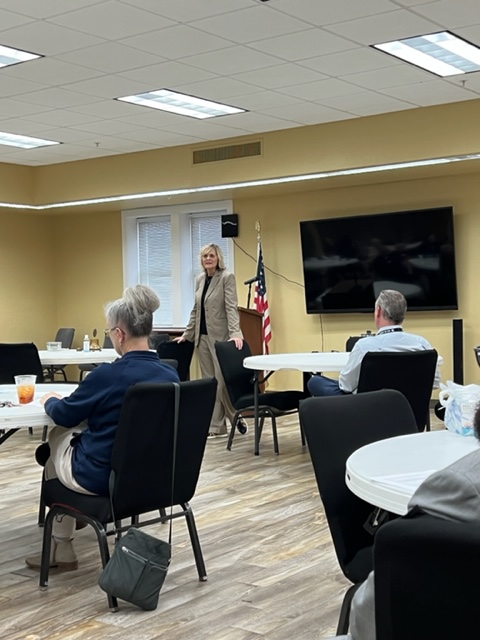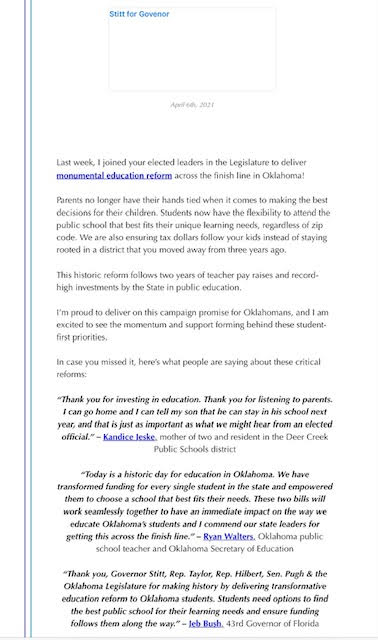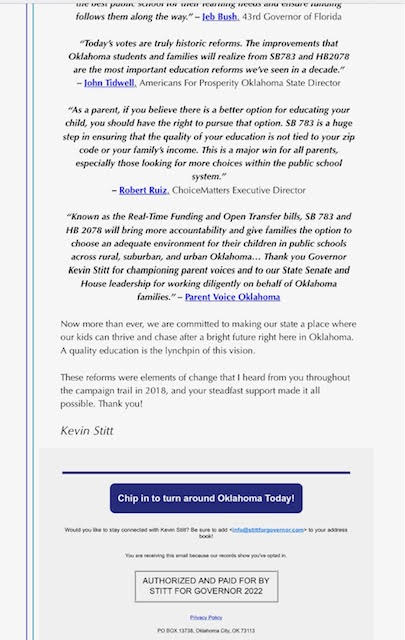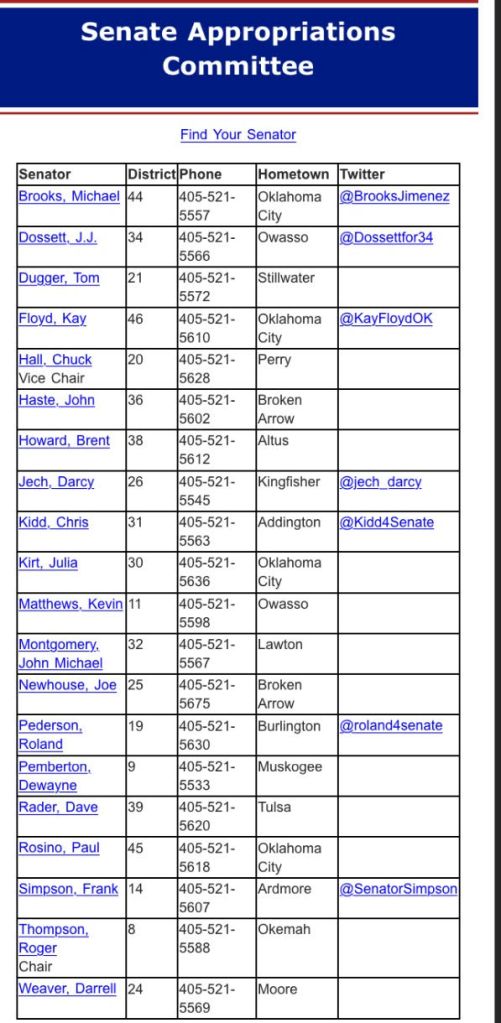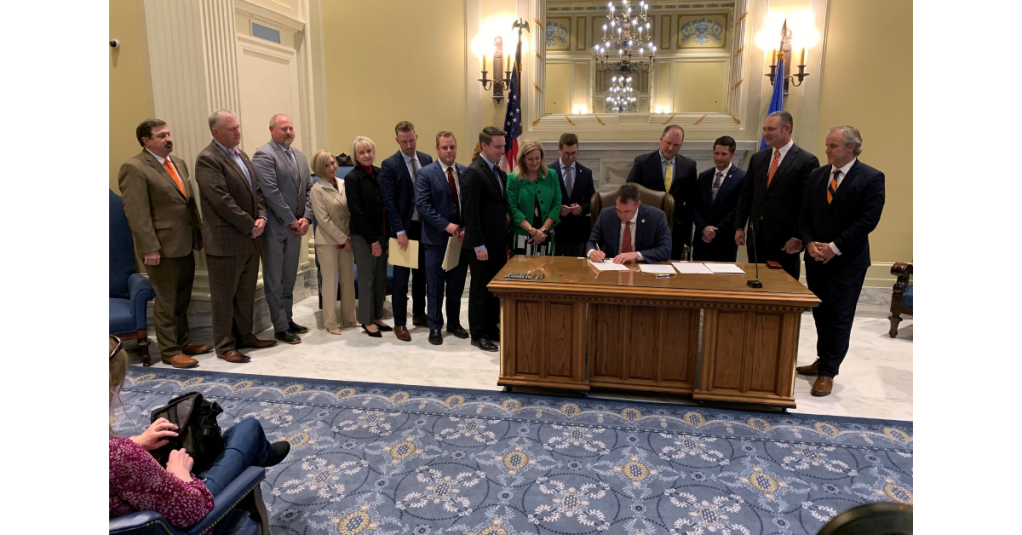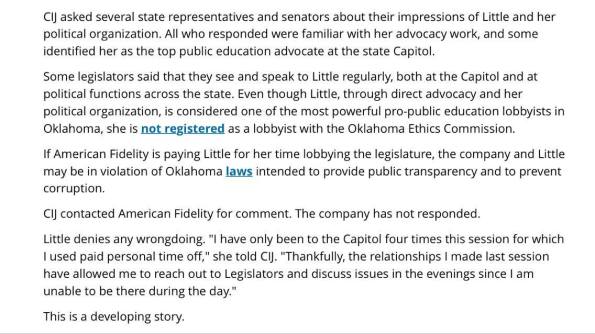Reason #1 to pick Dr. Grace over Mr. Walters: The future we’ve already seen
When Election Night is over and we wake up Wednesday morning, we are going to hear countless hot takes on what happened, what could have been done differently, and what it all means. This will be true no matter who wins the Republican run-off for State Superintendent. Here’s my takeaway, three days early:
The results of this election will tell us how good our long-term memory is.
No matter who tells us otherwise, Tuesday’s results will not be a mandate for or against vouchers. They won’t tell us how important the governor’s support is or isn’t. They won’t even tell us whether certain high-profile endorsements (or in some cases, a lack thereof), were significant.
Oklahoma run-off elections are quirky. They come down to voter turnout and momentum. If you don’t believe me, ask Vince Orza.
In 2002, Orza outgained Brad Henry in the Democratic primary 44% to 29%. In the run-off, however, with 92,000 fewer people voting, Henry came back and won the nomination, 52% to 48%. For Orza, it was déjà vu.
Orza had run for governor before, in 1990, as a Republican. He was a well-known restaurateur, with Garfield’s franchises in operation throughout the state. He was a former news anchor and economics professor. In the primary, he beat Bill Price 40% to 27%. Then in the runoff, with only 3,000 fewer people voting (and heavy influence from the Oklahoman), Price overtook Orza, winning by 0.4%.
Am I a bigger nerd for remembering all of this or for looking it up to make sure the numbers were accurate? Doesn’t matter.
The point is that this race is completely up for grabs. In this election, in 2022, the primary winner may or may not win the runoff. Nothing is guaranteed.
More importantly, though, I wonder how vividly Oklahomans remember the 2010 State Superintendent election, and how terrible the next four years were for our schools. Nothing we’re hearing from the Stitt/Walters crowd now is new. It’s déjà vu all over again.
Below are five quotes, either from the Janet Barresi era (2010-2014) or Ryan Walters now. See if you can tell which are from then, and which are current.
Quotes:
- “Who can we trust to defend our values?”
- “Today’s action is a pathetic and outrageous step back and returns us to a failed system”
- “OSDE routinely receives a number of allegations and complaints involving schools around the state, accusations that run the gamut from mismanagement to privacy violations to potentially criminal matters….One need look no further than newspaper headlines and TV news broadcasts to see the spectrum of situations that warrant professional, precise and effective investigation.”
- “The liberal education establishment has fought me the whole way. And they’re not about to let reality get in the way of their agenda.”
- “Funding for education in this country has doubled over the last 10 years with flatline results. Do we just throw a lot more money at it? Respectfully, school choice is a right in this state. It is not a luxury. It’s an important part of the mix in education.”
Answers:
- Then: Voiceover from a Janet Barresi ad (2014)
- Then: Barresi’s reaction to veto override of HB 2625 (2014) – more on this below
- Then: Barresi quote on essentially hiring an in-house PI after already losing her primary (2014)
- Then: Barresi on how education organizations had questioned her faulty math on a pay raise scheme that wouldn’t have worked (2013)
- Then: Barresi advocating for school vouchers (2012)
Yes. They were all old quotes. That’s the point. I’ve kept receipts from that era for a reason.
Also, you probably figured out they weren’t Walters quotes, since she never says woke.
Ryan Walters is nothing more than a cheap cover band for the same attacks that drove us to the polls in droves in 2014. Claiming to be the arbiter of our state’s values? Check. Attacks on educators? Check. Stomping around and acting like a victim? Yeah, that too.
Take Friday, for example, when Governor Stitt issued one of the most head-scratchingly useless Executive Orders we’ve ever seen. In short, he declared that teachers not only don’t have to join their unions (already true), but they also have to be told that they don’t have to join their union (also already true). Membership is opt-in, not opt-out. Anyone who tells you differently – including our governor – is misinformed or lying.
This right wasn’t codified in the Janus Supreme Court decision, or when Oklahoma became a Right-to-Work state in 2001. This is my 30th year working in public education. I have been employed by six different school districts. In none of them were teachers required to join their unions. In none of them was the right to choose unclear.
Stitt basically said that teachers have the right to breathe air and drink water. His preferred candidate for State Superintendent couldn’t keep from parrotting:
Interestingly, the EO didn’t mention the word liberal, though that seems to be the cherry on top for both Stitt and Walters. When I first saw this, I thought the use of the word chains was doing a lot of work. Then I saw his next tweet:
Yes, the guy with the dead inside eyes just compared mandatory union membership (still not a thing) to slavery. In response, Twitter was thorough, but it was not kind.
Ok, one of those was mine, but I wasn’t the only person who was outraged. Comparing anything to slavery – especially for an allegedly good history teacher – is always a bad idea. It reminds me of a particular time when Janet Barresi – who loves Ryan Walters and absolutely loved Common Core – also used a particularly offensive analogy.
In 2014, after the Oklahoma Legislature ended implementation of the Common Core State Standards here, Janet Barresi met with a group of educators and compared that action to the 2013 Moore tornado. It was such a personal trigger for me, that when another blogger told me about it, I said he should write about it. I just couldn’t. I went through the Moore tornado and its aftermath. I already despised Barresi for her incessant attacks on the profession I love. This took me to a new level of resentment I had never felt before.
To be clear, we can’t compare any of the following things to each other: slavery, tornadoes, legislative decisions, or voluntary union membership. They’re all vastly different.
Comparing Barresi to Walters is fair though. We’ve heard his rhetoric already. She was arguably more versed in policy, but her tenor was the same. Defund schools. Make them look bad. Blame teachers while pretending you’re on their side. Attack administrators. When cornered, throw in a culture war. Act like a victim whenever possible. Oh, and blame unions, as she did in this classic moment:
“I’ll be damned if I’m going to let the unions or anyone else in the education establishment lose another generation of Oklahoma’s children.” – Janet Barresi (2013)
This week, Walters dug deep into the Barresi playbook and said that if he wins, Oklahoma will retain more third-graders than ever. That second Barresi quote in the quiz above was from when the Legislature overrode Governor Fallin’s veto and allowed parents to have a voice in determining whether third-grade students should be retained. Walters is saying he’d take that right away from parents.
In 2014, Oklahoma was poised to hold back about 4,000 third grade students. Students were getting sick prior to testing, or during testing. Parents and teachers lobbied en masse to change the law and allow a parent to sit in on the retention/promotion committee. The change passed the House and Senate easily, with a combined vote of 132-7. Mary Fallin vetoed the bill. The vote to override was nearly as lopsided, 124-19. That’s what Barresi was calling pathetic in the quote.
In 2014, Oklahoma voters corrected the mistake we made in 2010. In 2022, let’s not make the mistake in the first place. Elect Dr. April Grace instead. She believes in teachers. She’s spent 30+ years as a teacher and leader in our schools. She works with parents and understands students. Let’s get this right. Vote like our public schools and the students they serve depend on it.
Reason #2 to pick Dr. Grace over Mr. Walters: The why and the how
Why are you interested in this position?
That is a question I have asked dozens of times during job interviews. Keep in mind that when I’m asking, it’s almost always for a leadership role – principal, director, assistant superintendent, etc. Sometimes, I get a well-conceived answer, something that tells me why they are the right person for this role and this district right now. Sometimes, I hear a rambling response that tells me the applicant is really looking for career advancement (which is fine, but not inspiring). On other occasions, all I get is an answer you could Google.
Before we get to Tuesday’s runoff for State Superintendent, let’s look at everything we know about the candidates and ask ourselves why each candidate wants the job? They know it’s not a cushy gig where you just put your feet up on a desk and bark buzzwords at people, right? The State Department of Education manages billions of dollars. They are responsible for ensuring compliance with untold state and federal regulations for those dollars. They oversee instruction and operations in 500+ school districts.
So what can we learn about their reason why from their campaigns? In previous posts, I’ve shared a couple of the responses that Dr. April Grace gave to OK-PLAC on their questionnaire. In this one, they specifically ask that question.
Dr. Grace talks about her granddaughter being one of the 700,000 public school children who need a great education in our state. She mentions her ability to collaborate with people from different groups and perspectives. As she has traveled around the state, putting over 1,000 miles a week on the road to meet with groups big and small, she has proven this.
Walters, as you can see, did not respond to their questionnaire. In his mind, though, he’s been running a positive campaign focused on serious issues.
Which part has been positive? The umpteen times he has said woke, indoctrination, and leftist? When his allies disgustingly refer to teachers as groomers, where is he defending the profession he claims to love? His entire campaign has lacked substance and support for the thousands of dedicated educators in our state.
I don’t doubt that Walters – as any parent would – spends every day thinking about how he could make the world a better place for his own children. As I said in my previous post, I also don’t doubt that he was a good classroom teacher. I just don’t think he’s articulated a reason why he wants the job.
Nor has he shown that he understands what the job entails, or how he’s going to manage all of the tasks that go along with leading a large state agency. The following screenshots show the tabs I see when I login to the Single Sign On system as a superintendent.
Even though I have administrators and support professionals to help manage many of these tasks, each one still requires a modicum of understanding and involvement on my part. Many require more frequent interaction.
Also, please point to the tab where all the wokeness happens?
When I have a question, I can ask my Regional Accreditation Officer for assistance or another leader within the SDE. Many of them are former administrators. I’ll say it again. Experience matters. If you want to lead the state system of public schools, it would help if you know what the people leading the districts are doing.
How will you approach these tasks on day one? Who will staff critical leadership positions within the SDE if you get the job? Will it be seasoned professionals who understand the nuance of laws and regulations? Or will it be political appointments who have never heard of Title I, IDEA, or the state funding formula?
The State Superintendent is also the Chair of the Oklahoma Department of Career and Technology Education. He or she is also are on other boards and commissions, such as the Commissioners of the Land Office (which is under criminal investigation, thanks to another appointee of Gov. Stitt, Elliott Chambers.) We’ve seen that Walters can’t even handle one state contract without the feds clawing back hundreds of thousands of dollars. How is he going to handle even greater responsibility?
One candidate in Tuesday’s runoff has thought about day one…and two…and so on. That person is Dr. April Grace.
Reason #3 to pick Dr. Grace over Mr. Walters: Bibliophilia
Ok, this one is going to be a little esoteric, so bear with me. It probably comes as no surprise to anyone who knows me that I love books. One thing I like telling our staff as they’re going home for the summer is, “read a book with no socially-redeeming value.” That doesn’t mean I don’t want people reading great literature or professionally-relevant books. It’s called balance. I may have a fridge full of fresh produce, but my pantry still has the Little Debbie snacks.
Technically, they’re sandwiches. It says so right on the box. But I digress.
Make no mistake: reading is under attack. Just this week, I’ve read about a Texas school district that removed 41 book titles, including the Bible and the Diary of Anne Frank from its shelves. To be fair, the district is following its review policy for titles that have been challenged, but can we just agree that this is beyond ridiculous?
Also within the last week, I saw a story about a teacher in Oklahoma who chose not to have kids read Killers of the Flower Moon: The Osage Murders and the Birth of the FBI, by David Grann. I read the book on vacation last year and then loaned it out to one of my children. This well-researched piece of writing made me want to learn more about our state’s history – not the stuff we glossed over in school back in the 80s. Good literature makes you crave more.
Apparently, the Oklahoma teacher is afraid of losing her certification:
While the district has not officially banned the book, the school’s superintendent, Vince Vincent, believes the teacher, like many others, is worried of violating HB 1775.
“It probably sheds light a little bit on the concerns that individual teachers have in regards to House Bill 1775, and what may or may not create a situation where either the school receives negative attention and gets some sort of accreditation deficiency, or whether the teachers themselves suffer consequences in terms of teacher certification,” said Superintendent Vincent.
However, former Osage Nation Principal Chief Jim Gray said there’s no way for people to appreciate how far the tribe has come without learning about their dark past.
“We don’t study history to feel good about it,” Gray said. “History is there for us to understand the mistakes of the past so we cannot repeat them.”
I don’t see how having students read this book would violate the law. Then again, anyone who fears the State Board of Education going rogue and following neither the law nor their own policies has good reason to feel that way. When they want to grandstand and make a point – as they did recently with Tulsa and Mustang – they’ll just wing it. Don’t believe me? Just read Mustang’s letter of appeal. They make some really good points.
In the race for State Superintendent, we can choose a candidate who not only supports libraries and librarians, Dr. April Grace; or we can pick the current darling of the book banning crowd, Ryan Walters.
In 2021, Dr. Grace was honored by the American Association of School Librarians as the recipient of their Distinguished School Administrator Award. As she wrote in an article for their journal:
To me, the library is the heartbeat and central hub of the school. It is a place for the entire school to gather and collaborate, a place where learning is enhanced and the classroom extended. It is a place where learning can come alive and help each student make real-world connections. It is a place where all learners can dream, create, grow, and connect. It is an inclusive place where every child can feel safe and seen and valued. Robust school libraries are a catalyst for creating inclusive learning environments, and every learner deserves access to a quality library. When I became superintendent of my own school district, I knew investing in school libraries was nonnegotiable.
When you see children reading, you see children learning. When you see schools that value libraries, you see adults who care what students learn.
Most people who have ever worked in a public school have known students who think of the library as their safe place. When books are under attack, when the professionals who foster the love of reading are under attack, so is that safe place.
Walters and his crowd can keep filming their car videos and screaming invectives from their keyboards for now. If he wins this election, however, expect those attacks to intensify.
As far as I’m concerned, books like Killers of the Flower Moon are important. As a life-long Oklahoman who wants to understand the history of our state, I loved the book and can’t wait for the movie to come out. Hopefully our students won’t have to wait either.
Reason #4 to pick Dr. Grace over Mr. Walters: Respect for the profession
I don’t write about education policy because I love politics. I write because I believe that public schools are critical to giving all students the opportunity to realize their full potential and contribute to our society.
The platitudes repeated by groups that favor public schools lose their impact over time, but they have truth behind them. Public schools are available to all children. Public schools reflect the diversity of our communities – in every imaginable way. Public schools prepare people for responsible citizenship in a democratic society.
This is why I value great teachers. We can all remember at least one of them who made a difference in our lives. And nothing beats that feeling we get as teachers when our former students come back to tell us about that impact.
If you are a candidate for office, and the job you’re seeing has anything to do with public schools, before I’ll support you, you have to show me that you respect teachers and value public schools. That’s what’s so perplexing about the Ryan Walters candidacy. People I trust tell me he was a good classroom teacher. That makes sense. He was a finalist for state teacher of the year. Then again, I have one of those down the hall from me and two more teaching in my district.
Learning is hard. Therefore, we know that good teachers have some combination of skill and empathy. If they didn’t, they’d just be rattling off information and accepting that some students learn and some don’t. If Walters was a good teacher, those qualities would be evident, right?
Last week, I ran across a tweet showing a short clip of Walters teaching about the path from Plessy v. Ferguson to the landmark Brown v. Board decision of 1954. It’s embedded below:
In case you can’t watch the video for some reason, I’ll describe it. Over one minute and 16 seconds, Walters mentions the Plessy v. Ferguson (1896) case that established the separate but equal doctrine. He then notes Brown v. Board of Education (1954) which bans segregation in schools. Then he adds that according to psychologists, “when you’re five or six years old, you like dolls that look like you, that’s just part of social development. They brought in some studies that showed that even young black kids in segregated schools wanted the white dolls…”
The account that posted the video added, “Pretty sure some people would consider this to be CRT.” In the comments, he then posted, “That’s the thing about 1775.. it’s open to interpretation. Did this have the capacity of making students feel shame? Absolutely. It’s a purposefully vague law to selectively target school districts.”
From what I can see, there would be no violation of HB 1775 here. Then again, from what I can see, Tulsa and Mustang didn’t violate the law either before the State Board of Education sanctioned them.
Yet Walters ranted and raved. He called for Tulsa’s accreditation to be dinged and the superintendent’s certificate to be revoked. The lesson Walters himself taught to his students describes implicit bias – even if he doesn’t use that phrase. Just because a presenter in Tulsa did say the words shouldn’t automatically move them two notches closer to the precipice of losing their accreditation.
(BTW: I’m still completely perplexed by what happened to Mustang, and I really just don’t want to get into it here.)
If Walters ever truly had the necessary empathy to be a great teacher, I don’t see it now – not during this campaign. Maybe the guy from the classroom was a character he was playing. Or perhaps this candidate version of him is just an act. Either way, he’s sold out to the highest bidder to call out educators as boogeymen in his false narrative.
Going back to the debate between Walters and Dr. April Grace last week, we heard nothing from him of the great things teachers do every day. That doesn’t fit into the word salad he prefers to spew.
Meanwhile, Dr. Grace continues to talk to parents, educators, and community members about her plans for improving public schools. She’s been a superintendent for six years, and as with any of us, she doesn’t get everyone’s support. Just the same, she’s committed over 30 years to educating children. Unlike her opponent, I’ve never known her to degenerate the work of teachers or the concerns of parents.
Dr. Grace is wired for servant leadership. Everything about her says, this is an educator. He can just roll along with his vitriol, car videos, and appearances on cable news. Meanwhile, April is going to keep going to the people, listening to their concerns, and letting them see who she is.
Reason #5 to pick Dr. Grace over Mr. Walters: Fiscal management
School superintendents – no matter what size of district – wear many hats. They make countless decisions every year. Every one of those decisions can impact the district’s bottom line.
In a good year, a district will have revenue and expenditures that are pretty closely matched and maintain a healthy fund balance. Superintendents have to ascertain from available information if local and state aid will rise or fall and balance that against enrollment projections.
While the state’s education formula does a fairly good job of equalizing per pupil funding among districts’ general funds, there is no such balance among their general funds and bonding capacity. Additionally, federal funds dispersed under a formula (such as Title I, Title II, IDEA, and Title VI), have highly specific regulations for school district use.
I could have written those paragraphs at any other point in the last 30 years, and they would have summarized the fiscal responsibility of a school superintendent. Most people don’t find it thrilling to discuss, but they would have thoughts if any funds were mismanaged. With all the different Covid relief funds school districts have received, it has never been more important to have systems in place for internal controls. Every penny spent has paper trails. We have to follow rules for bids.
If you want to look at recent audits for Shawnee Public Schools, which has been led by Dr. April Grace since 2016, you will see that those internal controls are in place. If you look at Oklahoma Cost Accounting System (OCAS) reports for recent years, you will also see that Shawnee has maintained a healthy – but not ridiculously high – fund balance.
When I say that experience matters, this is a big part of it. Managing finances for one school district is a big task. Overseeing that effort statewide is huge. Ryan Walters, has proven it’s out of his reach.
As Oklahoma Watch and The Frontier reported back in May:
U.S. Department of Education auditors recommended clawing back more than $650,000 in misspent federal coronavirus relief funds from Gov. Kevin Stitt and reviewing an additional $5.5 million in purchases, according to a federal audit released Tuesday.
The questioned spending came from Stitt’s Bridge the Gap Digital Wallet program, which gave $1,500 grants to low-income families for educational purchases like computers and school supplies during the pandemic.
Auditors pinpointed questionable expenditures like arcade games, Christmas trees, smart watches, sofas, televisions and refrigerators totaling $652,720. The extraneous items made up more than 10% of all purchases. The $5.5 million is the total of purchases the auditors did not analyze and could contain unauthorized items.
Long story short: The Stitt administration allowed misspending of federal Governor’s Emergency Education Relief (GEER) Funds. First, he allowed Ryan Walters – even before he was named Secretary of Education – to arrange a no-bid contract with Florida-based Class Wallet. Walters then proceeded to give blanket approval of all purchases. Basically, rather than placing any kind of internal controls over how the GEER Funds were spent, Stitt, Walters, and Class Wallet took the Outback Steakhouse approach – No Rules, Just Right!
Quoting from a separate Oklahoma Watch/Frontier story:
Other states used federal money to train new teachers or support programs for deaf and blind students. But in Oklahoma, a history teacher with political ambitions helped a Florida tech company win a no-bid state contract to rapidly distribute $8 million to families with little government oversight. Another $10 million went to private school vouchers.
With few guardrails, some families used Oklahoma’s share of federal Governor’s Emergency Education Relief Funds to buy Christmas trees, gaming consoles, electric fireplaces and outdoor grills, an investigation by Oklahoma Watch and The Frontier has found.
Months later the teacher, Ryan Walters, was on a national stage as Stitt’s new Secretary of Education, calling the effort a success.
Suffice it to say that we define success quite differently.
Based on this, can we say for certain that Walters would be bad at managing a multi-billion dollar budget? Sure, it’s only one data point, but on that one point, we know that the federal government is attempting to claw back more than $650,000. Malfeasance has consequences.
I’ll close with a line from the editorial in today’s Stillwater News Press:
Walters had an opportunity to oversee public funds for education and he failed in his duty to manage them.
Dr. April Grace has the experience to manage the finances of Oklahoma’s educational system. Clearly, her opponent does not.
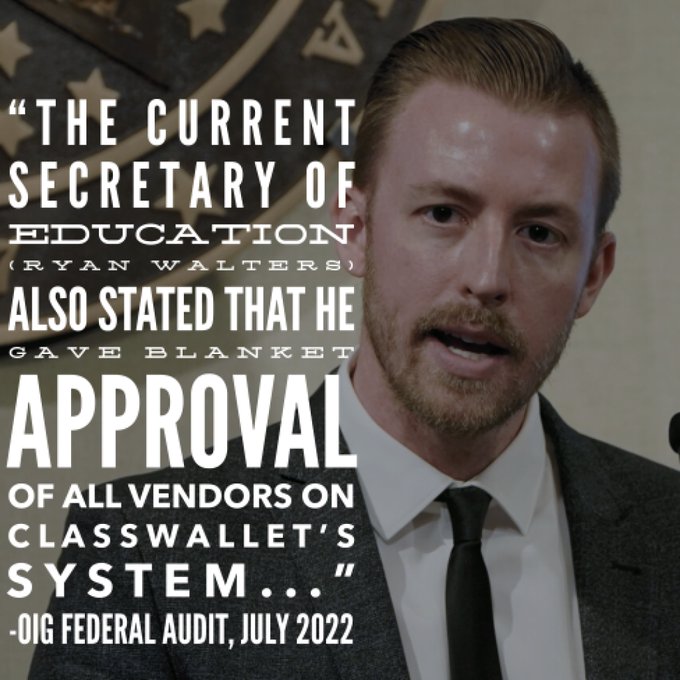
Reason #6 to pick Dr. Grace over Mr. Walters: Credibility
In case you missed the debate earlier this week between Dr. April Grace and Ryan Walters, you can still watch it on the Fox 25 website. If you haven’t and won’t, and if you’ll indulge me, I can summarize:
Moderators: Thoughtful question
Walters: Woke indoctrination
Grace: Solution, specific example
Walters: Leftist administrators
Grace: Thoughtful ideas
…and repeat…
[SCENE]
I’m not the only person who felt this way. After the debate, Fox 25 posted a survey to Twitter and left it open for 24 hours. Of the 772 people who voted, Grace won by nearly a 60 point margin.
It’s not a scientific poll, but I think it captures the observations of people who are paying attention. We just need to get more people to pay attention. And quickly.
I also want to mention that the moderators did an excellent job of explaining the format and then following it so that the candidates could speak. They allowed Dr. Grace to show her experience mastery of education policy. Conversely, they allowed Mr. Walters to show that there’s not a lot of there there. Maybe this is why he doesn’t appear alongside his opponent very often.
According to dictionary.com, credibility is the quality of being believable or worthy of trust. If you listen Walters, you probably don’t hear that quality. Craig McVay, retired El Reno superintendent, breaks it down in one of his truck videos (which are hilarious parodies of Walters’s car videos).
In case you don’t want to follow the Tweet, Craig begins by showing Walters accusing Grace of lying about his involvement in the Class Wallet scandal. He then shows a clip of Walters admitting that even before he was Secretary of Education, he helped Class Wallet secure the no-bid contract. How did he do that? Well, go back and re-read my last post if you need clues.
Craig goes on to say, “the people of Oklahoma have all the receipts…that’s morre than you have on 650 plus thousand dollars of taxpayer money. Not gonna fly, RyRy.”
I hope on August 23rd, Oklahoma Republican voters will choose the candidate who has substance in her speech. We can choose professionalism, or we can choose platitudes.
Previous: Reason #7 The company you keep
Next: Reason #5 Fiscal management
Reason #8 to pick Dr. Grace over Mr. Walters: Showing up
In politics, name recognition is critical. Most politicians try to get out in front of as many people as they can. They do big events. They come to small meet-and-greets. When they are presented with opportunities to show contrast with their opponents, they go there too.
Alternatively, a candidate may rely on a campaign funded by out-of-state special interest groups, racking up name recognition with flyers and large ad buys. They still get invited to all the county party events. They just don’t go. This is the campaign that Ryan Walters is running.
There’s no grassroots connection to voters there. Similarly, he has little connection with parents – except those affiliated with the groups funding him.
Undoubtedly, trying to run a statewide campaign in Oklahoma is tough. Some of our 77 counties are hard to reach. Between filing in April, the primary in June, and even the runoff in August, I don’t think many candidates could go 77 out of 77. Still, you can be seen trying. Skipping that event with 13 people in NE Oklahoma might keep you from having 13 people singing your praises to their circle of influence. Dr. Grace thrives on those moments.
This June, the state superintendent candidates had the chance to make their case at the summer Cooperative Council for Oklahoma School Administration (CCOSA) conference. Three of the four people running for the Republican nomination were there. Walters was not. Similarly, he was on the agenda to speak at the Oklahoma Department of Career Tech Summit last week. He didn’t show up, but Dr. Grace did. My staff who were there told me she was genuine and passionate. That’s April – not just campaign April. That’s who she is every single day.
You want to lead us? Show up. Tell us what you’re about. You might not win us all over, but at some point, you’re going to have to get out of your car and work with us.
As I wrote yesterday, Dr. Grace responded to the Oklahoma Parent Legislative Action Committee (OK-PLAC) questionnaire, and that Walters did not. One of their questions was about the use of vouchers and accountability for funds.
Frankly, Walters runs from questions like this. Maybe it’s because his own conduct regarding the GEER allocations is in question. Maybe it’s because he doesn’t understand the rest of the question due to a lack of experience.
Having a presence with people is important. Answering questions matters. Having real Oklahomans support your campaign…well, you get it. You either want to support our public schools and can articulate how you want to do that, or you don’t. The out-of-state special interest groups that support the Walters campaign clearly have more access to the candidate than regular Oklahomans.
If you’re interested, Dr. Grace and Mr. Walters will square off in a debate Tuesday at 5:00 on Fox 25. Let’s see if he can make it.
Previous: Reason #9: Communication
Next: Reason #7: The company you keep
Reason #9 to pick Dr. Grace over Mr. Walters: Communication
Words matter. I’m not just saying that as a former English teacher. I’d feel that way even if life had taken me in a different direction.
Your words can paint clear pictures or they can be inexact, leaving room for interpretation and leading to consequential misunderstanding. Words can also uplift people and groups. Conversely, they can be weaponized. Worst of all, words can be tools of distraction – a smokescreen masking intent.
Political campaigns are terrible when it comes to the use of words. Whether you agree with my choice of candidates or not, can we all just admit that? I have several friends who are elected officials. I have others who have previously served or who have run unsuccessfully. Campaign language often lacks precision, specificity, and honesty.
The race for State Superintendent here in Oklahoma illustrates all of these qualities. For example, the Oklahoma Parent Legislative Action Committee (OK-PLAC) sent each campaign a series of questions to allow the candidates to describe their plans if elected. Dr. Grace responded. Mr. Walters did not.
The fact that April responded matters as much as what she said. When asked about how she would approach her first year, she said, in part:
“…I want to dive right into how we begin to shore up our teacher pipeline. I want to advocate for the reinstatement of the National Board stipends. I have been working with a group on how we can develop our own Teach for Oklahoma program. Additionally, I want to dig into the A-F report card and calibrating some aspects…. To be sure we have a lot of work to do to restore the respect of the profession.”
You can read more in the graphic below, courtesy of OK-PLAC.
Dr. Grace goes on to say that we need to continue to spotlight the good things our teachers and students are doing. While Walters didn’t respond to the questions, his car videos and social media outbursts give us some insight.
Here, Walters goes on one of his many rants about teachers and woke indoctrination of our students.
In this tweet, Walters seems to forget that it was Governor Stiitt’s appointees to the State Board of Education (SBE) who closed Oklahoma’s schools in 2020.
Walters even had an editorial in the Oklahoman this spring expressing outrage about teachers unions and insisting that teachers shouldn’t be required to join them. As someone who has been a classroom teacher, he obviously knows that union membership isn’t mandatory.
It was a completely dishonest attack meant to divide rather than inform. And he knows that.
Even his attempts at word play fall flat.
Listen, I love good puns. “Oklahoma not Wokelahoma” is objectively terrible.
Sometimes, his word choice doesn’t even make sense. When the SBE sanctioned Tulsa and Mustang a couple of weeks ago, Walters spoke during the public comment period. When he puffed his chest about it later that day, he claimed he had “testified.” Testimony is when someone asks you to be there and speak. Public comment, on the other hand, is when you just show up and speak your mind. During the public comment period, a candidate’s voice carries no more weight than that of any other citizen.
He’s overstating the importance of his actions – probably since the “job” he has as Secretary of Education has very little authority over anything.
My biggest personal beef with Walters came in January. As the Omicron wave knocked students and teachers out of school, we were trying everything imaginable to provide instruction. We had cleared out the central office to the extent we could and even had a state senator covering classes. Eventually, we made the difficult decision to cancel classes for two days and make the MLK Holiday a five-day weekend. As soon as we announced this, Walters lambasted our decision.
His response showed no understanding of what schools were fighting or how they were trying to manage the crisis. We were dealing with 25% student absences and almost 20% teacher absences. Our substitute fill rate was lower than ever. Did he call and ask for clarification? Of course not? Did he or any other member of the Stitt administration offer to help? What do you think?
Naturally, I responded. As you can see from the comment-to-like ratios, I wasn’t alone in feeling this way. Good leaders seek first to understand. Then they speak and act. This exchange made it clear to me that Walters, if elected, would not.
For what it’s worth, after making that announcement, I received zero negative emails from parents or staff. That was a first during the pandemic era. That makes me think I’m more in touch with the parents in this community than the Secretary of Education ever could be.
Walters either does or doesn’t choose his words carefully. I honestly don’t care. Whether his gaffes are intentional slights or accidental slips of the tongue doesn’t matter to me. His statements show that he doesn’t respect the work that teachers and leaders are doing. Those of us who still vividly remember the Barresi years know why that’s dangerous.
Words matter. They let us see you for who you are. They show that Dr. April Grace is a serious person who has thought about the problems facing public schools that serve 700,000 students. They show that Mr. Walters is dead-set on vilifying educators and fueling the culture war that paints public education as a bad thing.
Previous: Reason #10: Leadership Experience
Next: Reason #8: Showing up
Reason #10 to pick Dr. Grace over Mr. Walters: Leadership Experience
As I wrote Sunday, I’ve been toying around with a #TopTen list for a couple of weeks. I have even bounced ideas off of a few friends. At one point, the list grew to almost 20 reasons not to promote Ryan Walters from his car office to the post of State Superintendent. Some of them were gloriously hilarious, yet sadly unusable.
We have three weeks until the runoff. Absentee ballots are already out. Many people have already voted. I’m concerned.
I did some research on voter turnout in previous Republican runoff elections. Here’s what I found:
- In 2010, voter turnout between the primary and runoff dropped by 48%. Then again, the only statewide race was for Insurance Commissioner. Local races drove most of the turnout.
- In 2014, there were no statewide runoff elections for Republicans. It should be noted, however, that the governor was an incumbent, and the incumbent state superintendent came in third in her primary election. I don’t know if that’s relevant or not, but I like mentioning that any time I have a chance.
- During the 2018 primary, medical marijuana was also on the ballot. Voter turnout was higher [pun intended] than usual. Over 429,000 Republicans voted in the primary, up from 262,000 in 2014. During the runoff election in August, the number of voters dropped off by 31%. Still, we had the Governor and State Superintendent races on the ballot. Turnout in the runoff was about as heavy as turnout in the primary in 2014 or 2018.
- In 2022, there were about 360,000 ballots cast in the Republican primary. This year, we aren’t voting for a governor or weed in the runoff. We do have some juicy down ballot races, though. Labor Commissioner has become a heated contest between incumbent Leslie Osburn and a challenger I won’t even dignify by naming. Osburn has been a long-time supporter of #oklaed. As for her challenger, well, you can look it up. We also have statewide runoffs for Jim Inhofe’s soon-to-be vacant US Senate seat, Treasurer, and Corporation Commissioner. The Second Congressional District also has a runoff. I expect turnout to be fairly high – especially on the east side of the state.
Clearly, the race that interests me the most is for State Superintendent. I want to take a quick moment to acknowledge the people who keep reminding me that there are actually three candidates for the position. Yes, Jena Nelson is on the ballot as the Democratic nominee. That’s November’s problem. It’s August. I’m focused on this race. Jena is a former state teacher of the year, and once the runoff is complete, I’ll be even more interested in hearing about her platform. I’ve never met Ms. Nelson, but we’ve interacted on social media. I know she’s not hostile to the profession. That’s enough to make me want to hear more.
Now, where was I? Oh yeah. Reason #10: Leadership Experience. Put simply, Dr. Grace has quite a bit. Ryan Walters has virtually none. He was a history teacher in McAlester before being named Executive Director Every Kid Counts Oklahoma (EKCO), a nonprofit startup that began operating in 2020. What do they stand for? This seemingly innocuous screen grab from their website lays it out.
The fact that EKCO co-offices with the Oklahoma Public Schools Resource Center (funded by the Walton Family Foundation) is a story for another post later in the countdown. I want to focus for a minute on the first and last of their core values.
Students Not Systems sounds harmless, right? The money should follow the kid? Well it already does. The state has a funding formula, with all kinds of accountability measures in place. Since the vast majority (about 700,000) of those students attend our public schools, those funds flow through the public school system. Walters’s position with EKCO gives him the air of legitimacy while he plays politics from his car all day.
Similarly, Win Together should be a rallying cry for all of us, right? It’s one thing to say, education is not a partisan issue out of one side of your mouth and then turn on your smart phone and blast the liberal woke mob out of the other side. With Walters and the people who prop him up, it’s not enough to be a Republican and agree with them most of the time. You must also vote their way on all issues – especially vouchers – or they will bring in all kinds of dark money to fund campaigns against you.
The six-figure salary Walters receives for performing his official “duties” with EKCO allows him to live comfortably while also collecting about what a legislator makes and serving as Governor Stitt’s Secretary of Education. In that role, he still has very little authority. That’s why his complete failure in the Class Wallet scandal is so bewildering. Between his two “jobs,” he really shouldn’t even have had to multitask.
Leaders do the hard day-to-day work of improving systems and building people up. Leaders stand in front during a crisis. Unlike her opponent, Dr. Grace has done this. She has been a teacher, coach, and principal. She led the Human Resources department of one of the largest districts in the state for a decade. She is entering her seventh year as a school superintendent. She has been the president of the Oklahoma Association of School Administrators (OASA), and she was named Oklahoma Superintendent of the Year in 2021.
For more than three decades, April has shown up and focused on making people’s lives better. That’s what real educators do. She has earned the respect of her peer leaders. She teaches courses for Southern Nazarene University’s graduate education programs. I’ve even served on a dissertation committee with her and seen the thoughtfulness she puts into leading that process.
Just last week, principals in my district were scheduled to re-train on the Marzano evaluation system, as they are required to do every few years. There was a mixup at registration, not just with Mid-Del leaders, but with principals from a few other schools as well. April took them off into another room and led their session with no hesitation. I received several messages from my principals saying how impressed they were with her.
Show up. Stand in front and do the job, even when you weren’t expecting to have to do it. That’s what leadership looks like.
To paraphrase one of my principals, Dr. April Grace is the real deal.
Why we can’t let Walters win (pt. 1)
If you are a registered Republican who supports public education, you need to keep reading. In case you missed it, Oklahoma Secretary of Education Ryan Walters took a break from filming car videos on Thursday to set foot in the building where he’d like to have an office for the next four years. He signed up to speak during the public participation portion of the State Board of Education meeting.
He used his three minutes to trash Tulsa Public Schools, calling on the SBE to review the accreditation of TPS, and to review their superintendent’s certification. He also took a couple of jabs at the person he wants to replace, Superintendent Hofmeister, who in turn wants to replace his boss, Governor Stitt.
The SBE was already scheduled to discuss the accreditation of TPS. After receiving a recommendation from State Department of Education officials to change the district’s accreditation to “accredited with deficiency,” they decided that they would go even further, all the way to “accredited with warning.” Watching from my office between meetings, it seemed to me that at least one SBE member would have been willing to go all the way to “accredited with probation.”
The difference between these designations matters. The fact that the SBE is willing to go rogue – and that some of the board members are willing to step all the way to the edge of non-accreditation – should alarm all of us. The fact that they blindsided another district (Mustang) with only adds volume to that alarm. Nothing on the agenda indicated that Mustang was going to be receiving any kind of deficiency or warning, but that didn’t stop the SBE from giving them the exact same designation as Tulsa.
I won’t get into the alleged violations of HB 1775 in Tulsa or Mustang. In spite of everything that has been posted to social media since the SBE meeting, I don’t have a good feel for the sequence of events. The SBE didn’t discuss any evidence they reviewed. No representatives from the districts were there to explain what happened or discuss what they have done since the alleged violations. As a superintendent, I understand that there are times you can’t share all the information you have. For the SBE, this would not have been one of those times.
All we really learned Thursday is that the governor’s chosen candidate for State Superintendent and most of his appointed SBE members want us all to be on notice. If we cross them, they will come after our districts. They will come after our certificates. They don’t even have to have evidence or give you a chance to defend yourself.
It was nothing less than a shot across the bow for all of us.
**********
Going into June’s Republican primary, I wrote about why I support Dr. April Grace for State Superintendent. As I said then:
In Oklahoma, the Superintendent of Public Instruction is an elected position. The state constitution lists no qualifiers for the position other than age and residency. As a life-long, fourth-generation Oklahoman, as a 29 year educator, and the son of a retired teacher, I’m looking for the candidate who I believe can help students, help public schools, and help communities thrive over the next four years.
I was nice in the post. I only said positive things. One of the other primary candidates, Dr. John Cox, is a friend and fellow superintendent as well, and I would have happily supported him if he had won. We need an educator with strong leadership experience running education in the state. I was less enamored with the other candidates, but I kept my thoughts on them to myself.
Now that we are headed towards a run-off election on August 23, I want to contrast the candidate I prefer with the alternative. I want to make it clear to educators and to all Oklahomans who support public schools that Ryan Walters is dangerous. He is unprepared. He is a puppet of individuals and groups hell-bent on destroying public schools. As the editorial board for the Stillwater News Press wrote this weekend:
It’s increasingly apparent that the goal for people who have been placed in oversight roles for public education in Oklahoma are deliberately trying to undermine it in the interests of privatization. They’ve sold a bill of goods to parents that they are trying to root out “leftist indoctrination” and “woke” ideologies but the latest action gives further evidence that the game is rigged.
This is why we all need to care. This is why we all need to vote. We have 23 days until the runoff between Dr. Grace and Mr. Walters. We get to choose between someone who supports teachers and school leaders and someone who denigrates the hard work they do. We get to choose between someone with decades of experience and someone who received his position in state government in order to serve the desires of people trying to wreck the hard work of Oklahoma’s educators.
A couple of weeks ago, I started toying around with the idea of a #TopTen list of reasons not to vote for Walters. I haven’t had a prolific blogging month in a while, but this moment probably calls for it. The problem I’m running into is narrowing it down to ten.
Over the next three weeks, I’ll make my case, as one voter, as one educator, and as one life-long Oklahoman who cares deeply about the future of our state and profession. To anyone else with a platform, I implore you to do the same.
We have 23 days.
Why I support April Grace for State Superintendent
Before you become a school district superintendent, people tell you that you will be on an island. You’re the only one in your organization with that title. While that may be true of other people as well, they all answer to you. You may make deep abiding friendships, but ultimately, no matter how good your team is, you’re the one on the hook for the tough decisions.
When I became a superintendent seven years ago, one of my first challenges was to find colleagues with enough experience to help me get my feet on the ground. I wanted to befriend newly-appointed superintendents as well, since my neurotic fear was that I’d call up veteran superintendents and that they would laugh at my questions. (None did – at least not that I ever heard about.) I wanted to turn my island into an archipelago.
I made a few close connections right away, and then the next year, when April Grace became a superintendent, we became good friends as well. Over the years, I’ve gathered a list of dozens of peers that I can call on a moment’s notice. Sometimes we plan around weather forecasts together. Sometimes we call to lift each other up during hard times.
When I have tough questions and want to process out loud with someone else whose perspective I respect, my first call is usually to April. She has been a teacher, coach, and principal. She had a long tenure running HR in one of the largest districts in the state. As I have, she has worked in urban, suburban, and rural school districts. She gets large budgets and complex organizations.
April is also usually the first person to call me up just to check on me when something bad happens. Her kindness and empathy put her in a separate class. She has given me invaluable advice; on occasion, she has even picked my brain for expertise.
In Oklahoma, the Superintendent of Public Instruction is an elected position. The state constitution lists no qualifiers for the position other than age and residency. As a life-long, fourth-generation Oklahoman, as a 29 year educator, and the son of a retired teacher, I’m looking for the candidate who I believe can help students, help public schools, and help communities thrive over the next four years.
That is why I will be voting for April Grace in the Republican Primary on June 28.
Our statewide system of public education is complicated. No two districts are the same. April’s varied experiences will help her lead it. She has built a strong network of support with leaders throughout the state. She pays attention to details and understands the intricacies of school law. Most importantly, she cares.
I’ve said for years that most of us would rather do anything than pay attention to politics. That’s still true, even when public educators are under constant attacks from politicians. I don’t want to focus on any of that right now – just the person I believe is best-equipped to lead the system of public schools that we have in this state. April will lead us back from the pandemic years, work closely with the Legislature, and bring schools and parents together to work for the best interest of children.
Please vote on June 28. Do your research and pick a person with experience and integrity.
An Open Letter from the Jealous Cabal
In case you haven’t heard yet, the State Board of Education (SBE) approved a settlement with the Oklahoma Public Charter School Association during their March 25 Board meeting. Against the advice of their in-house counsel, the SBE voted 4-3 essentially to allow charter schools to have access to local revenue, in addition to the state revenue they already receive.
I’m not going to rehash that decision, which for the record, I find problematic. Instead, I’d like to address the multi-faceted defense of that decision that seems to rest on the shoulders of the newest member of the SBE, Trent Smith.
Smith made the motion to approve the resolution settling the lawsuit and has been its most vocal proponent. This weekend alone, he appeared on News 9’s The Hot Seat with Scott Mitchell and penned a letter to the editor that appeared in the Tulsa World.
The letter in the World was pretty straightforward. He simply stated that the resolution rights a mis-application of state law. Those of us opposed to the settlement disagree and point to the original intent of the charter school movement, which leaned on public-private partnerships for the funding of charter schools.
Smith’s interview with Mitchell, however, was quite a journey. I watched it a few times, took some notes, and have comments. Let me unpack a few direct quotes from the five-minute segment.
“Not only was [the settlement] not a mistake; it was to a large degree, premeditated.” – (0:40)
What exactly does Smith mean by premeditated? That’s usually not a term used by someone defending their actions. We know that the SBE met in an executive session for four hours, discussed a number of items, and then came back with this resolution. He read the motion from his computer screen. Does he mean that the decision to contradict their lawyer’s decision was made prior to the meeting?
“The public education cabal, if you will, that has been in existence for decades and decades and decades, they’re interesting in protecting the status quo.” – (1:40)
No, we’re interested in educating children.
What really got me going today was the word, cabal. And to be honest, I think it was used intentionally to be provocative. It worked. I’m provoked. My friend, Matt Riggs, superintendent in Macomb, tweeted about it, which is how I became aware of the Mitchell-Smith discussion in the first place.
Merriam-Webster defines cabal as “the contrived schemes of a group of persons secretly united in a plot.” I also vaguely remember an 80’s era video game called Cabal.
I really don’t know what we’re doing that is in any way a contrived scheme or secretive. Oklahoma education advocacy groups and district leaders have been openly vocal about their thoughts on the SBE settlement. Many districts, including mine, have either approved, or plan to approve, legal action over this decision. We post this to our local board agendas, which aren’t exactly hard to find.
While I agree with Mr. Smith about preferring a legislative solution to a litigated one, that could be many things to different people. And I’m all for those discussions being had in the light of day.
Not in an executive session. And certainly not in a premeditated manner.
“I don’t think it’s any secret, and they don’t like to talk about this, that Oklahoma’s public education system is always near the bottom of the barrel….There’s only 50 states, and we can’t seem to get above 45th, 42nd, 48th.” – (1:50)
At this point, Smith lays down tracks for the rest of his comments. Our schools are bad and need competition.
I’ve been a public school educator for 28 years, and I’m the son of a retired teacher. I’ve been hearing that my whole life. I’ve also been hearing my whole life about how poorly funded Oklahoma’s schools are compared with the rest of the country. Yes, our Legislature increased its investment in education in 2018 and 2019. After a decade of – at best – flat funding, we made up some ground that we quickly lost to other states.
Our state has a long history of not supporting public schools. Then our leaders blame the schools for not being in great shape – similar to how we as society tend to blame poor people for not having money.
Ever since HB 1017 passed in 1990, wealthy and well-connected influencers around the state have been trying to demonize public education and the people who work every day to educate our children. But sure, we’re the cabal.
“The Academy of Seminole has done a great job graduating a vast majority of their graduating class this year – their first graduating class. The majority of those students will graduate with associate’s degrees.” – (2:25)
That’s fantastic! It’s worth mentioning, though, that Seminole High School, the local traditional public high school, posted a 100% graduation rate in 2019. The state average that year was 97.2%.
It’s also exciting to see that they promote early college access, as do most high schools in Oklahoma. I’m not sure why Smith thinks that’s unique. Our public school districts have agreements with career tech centers and higher education institutions that allow a multi-directional educational path for students and a springboard into postsecondary life.. Oklahoma’s high school juniors and seniors regularly earn college credit and even industry certification before graduation. The Academy’s specific focus on this is noteworthy, and a good example of how charter schools can target a family’s specific interests.
“As a parent with two children in Yukon Public Schools, it’s time that we step out of the Stone Age and a public education system that was designed to produce industrial workers.” – (2:45)
I’m going to come back to this one in a few paragraphs, but I’m pretty sure that there weren’t many industrial workers during the actual Stone Age.
“What we have now is Henry Ford vs. horses. We have a public education system trying to protect the horses. And we’re trying to make automobiles. And it’s just like, do you want to use a landline or a cell phone?” – (3:05)
If you can hear my exasperated sigh, it’s because I thought we did a better job teaching simile and metaphor than that in our public schools. Maybe we’re 45th, 42nd, 48th at that as well. I get that Smith, as a new member of the SBE, may not be fully up-to-speed on all the current lingo. We’re laser-focused on collegeandcareerreadiness. One word. It rolls off the tongue.
Oklahoma’s public schools do a good job of getting students ready for college. Or careers. Or the military. Or something. One way or another, we spend a considerable amount of time preparing students for whatever it is that comes next. Not every student will graduate knowing how they want to spend the next 40-50 years, and that’s fine. They all need to graduate at least knowing what they can do while they’re figuring that out.
As schools that are part of the public state system, we have to follow state standards, prepare students for state tests built around those standards, and conform to countless legislative whims that tie us back to another era. As much as I’ve seen public education evolve during my career, sometimes I feel like the only thing holding us back is state government. We’re not teaching Henry Ford’s horses to use the landline, exactly, or whatever the point of that sentence was.
“We need to completely re-think how we’re educating our kids, and in my opinion, the settlement we were able to pass in the board meeting at the end of March is just one small step towards the greater reforms that really need to happen.” – (3:20)
Please, Mr. Smith, do continue. I’m sure that we’d all love to hear about the greater reforms you’d like to see implemented.
“…[Rep. Hilbert’s Bill] would solve the two main problems the education establishment has with our settlement, which is the funding of virtual charter schools, and let’s all be honest, they’re talking about Epic, which I think has done a fantastic job. 60,000 families in Oklahoma have chosen to send their children there.” – (4:10)
Well, 60,000 students were enrolled in Epic in October. After the statewide enrollment count, however, many returned to their local districts. This happens every year.
Besides, didn’t Smith brag on the Academy of Seminole’s graduation rate as evidence of the great job they’re doing? According to a 2019 article posted on The Frontier, Epic had a graduation rate of 40%. That’s not fantastic.
“I don’t think they should vote to dissolve that entity. I think that the problem is a bunch of jealousy. I think there are people who are mad that they’re losing students. And a lot of that is because they’re having to compete for the first time.” – (4:25)
I really want to know who told Smith that anytime people don’t like you it’s because of jealousy. Sure, if you win all the time like the Yankees used to, everyone else will despise you. But sometimes – and stop me if this sounds ridiculous – people don’t like you because of legitimate grievances over the things you do.
I personally have no ill will towards the statewide virtual charter schools that aren’t currently under state or federal investigation. And I feel no particular jealousy towards the teachers who work for Epic or the students who attend their schools. I want every student in Oklahoma to get a good education. And yes, I want families to have agency in determining what that should look like for their children.
That’s why I’m not against charter schools. I just prefer the original model that relied on private-public partnerships. And it’s why I’m not against school choice. I just prefer not to use that term as an umbrella that includes voucher programs for private schools, where the choice is still in the hands of the private schools, rather than the families.
“Oklahoma’s workforce isn’t doing so great, and a lot of that is because of the education system that we currently have in place.” – (4:55)
Is that the industrial workforce or the stone age workforce? And while we’re at it, what else do you want to blame on public schools? Bad weather? Earthquakes? Cottonwood pollen and the offensive smell of Bradford Pears?
Governor Kevin Stitt appointed Smith to the SBE in December, replacing a member who did not vote as the governor had wanted. If the SBE had voted as their legal counsel advised them to, I imagine we would have seen a rinse and repeat of that maneuver. We’re in a state right now that requires absolute fealty to its chief executive. Disagree and be gone.
During the interview, Smith briefly touches on being a product of Clinton Public Schools and the fact that his children are in Yukon Public Schools. I don’t think he’s against public schools. I genuinely think he wants them to be re-imagined, and that’s fine. Unfortunately, provoking and insulting those of us who have chosen public education as a profession won’t transform us into a #toptenstate.
The 10 Most Important Slides from the State Auditor and Inspector’s Epic Presentation
Yesterday, State Auditor and Inspector Cindy Byrd’s gave a virtual presentation over her office’s findings in the investigation of Epic Charter Schools. The 45 minute video is now all over the World Wide Web Web and continues to be shared. It should also be required viewing for all educators parents, and … well, taxpayers. And probably legislators.
As important as the presentation is, I know that the tl;dr phenomenon applies to video content as well. I taught high school English long enough to understand that just because I assign it, doesn’t mean you’ll read all of it. That being said, let me cut it up into bite-size pieces for you.
I have taken screenshots of what I think are the ten most important slides from Auditor Byrd’s presentation. I’ll do my best to summarize them, but honestly, watching the whole thing (with captioning), is really worth it. After watching it in the morning, I even kept it on loop again yesterday afternoon while working in my office.
1. Governor Stitt initiated the audit process, writing to Auditor Byrd, “I respectfully request an audit of Epic Charter School and all related entities.” This isn’t the first slide in the presentation, but I’m doing the first two in reverse order. Too many times, I’ve seen the state’s leading far-right think tank accuse Epic’s detractors of being anti-choice.
Hardly.
This audit, which began six months into Stitt’s term, is about assuring that tax dollars go where they’re supposed to.
The other notable part here is that Stitt addresses not only Epic, but also all related entities. As Byrd demonstrates clearly, there is very little – if any – space between these entities.
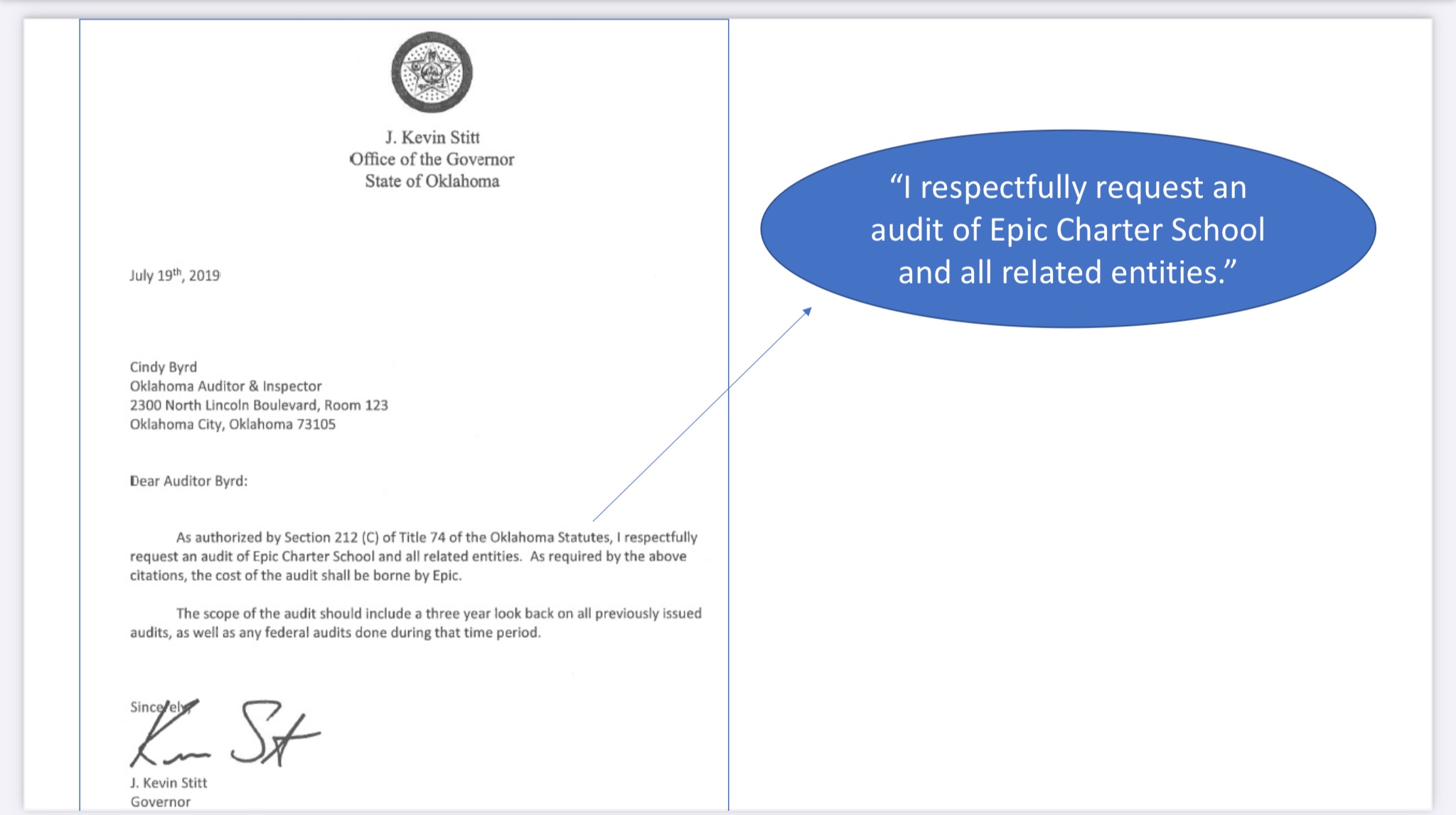 2. The Oklahoma State Bureau of Investigation was already investigating Epic before the governor wrote to Auditor Byrd. The search warrant below was issued three days before the governor sent that letter. I’m not a lawyer, but embezzlement and racketeering both sound pretty serious.
2. The Oklahoma State Bureau of Investigation was already investigating Epic before the governor wrote to Auditor Byrd. The search warrant below was issued three days before the governor sent that letter. I’m not a lawyer, but embezzlement and racketeering both sound pretty serious.
 3. Epic Youth Services received a PPP loan for $42,700. On first glance, it’s a fairly small amount. But Epic Youth Services reported to the Oklahoma Employment Security Commission that they had zero employees from 2010 through 2018. Then in 2019 they hired two lobbyists. Epic Youth Services, which takes 10% of all of Epic’s state aid, now apparently has three employees and needs federal Covid relief funds to keep them on the job – whatever job that is. Auditor Byrd doesn’t seem to think that the operating agreement makes that clear.
3. Epic Youth Services received a PPP loan for $42,700. On first glance, it’s a fairly small amount. But Epic Youth Services reported to the Oklahoma Employment Security Commission that they had zero employees from 2010 through 2018. Then in 2019 they hired two lobbyists. Epic Youth Services, which takes 10% of all of Epic’s state aid, now apparently has three employees and needs federal Covid relief funds to keep them on the job – whatever job that is. Auditor Byrd doesn’t seem to think that the operating agreement makes that clear.
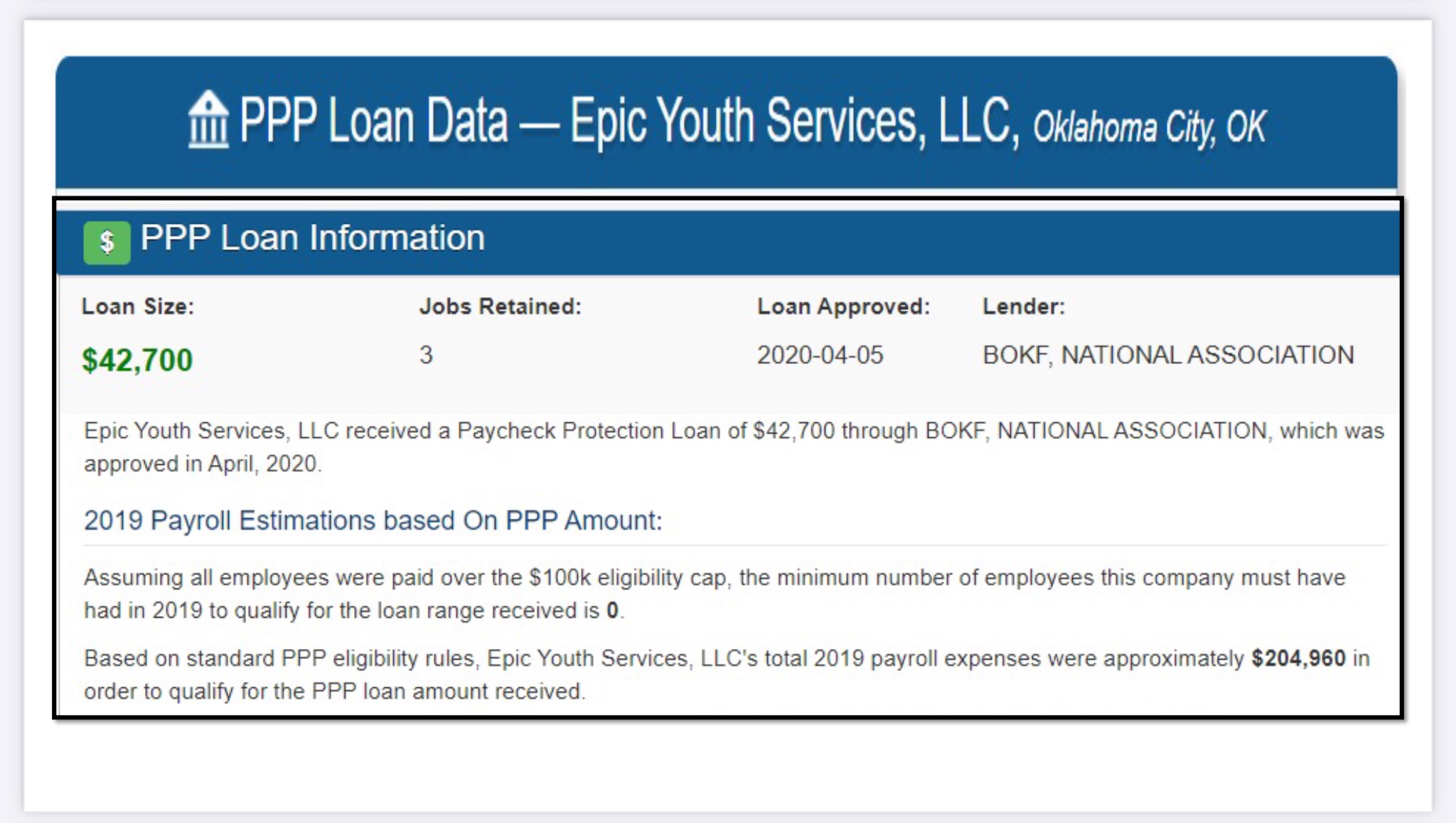 4. Epic One-on-One (full-virtual) and Epic Blended submit identical invoices every month. That’s right. The percentages you see below are identical for the all-online school and for the brick-and-mortar school. I’m also not sure what child nutrition services are needed for Epic One-on-One, and why EYS bills them for it every month. One more thing…if they have three employees, none of which are certified teachers, what are the certified salaries?
4. Epic One-on-One (full-virtual) and Epic Blended submit identical invoices every month. That’s right. The percentages you see below are identical for the all-online school and for the brick-and-mortar school. I’m also not sure what child nutrition services are needed for Epic One-on-One, and why EYS bills them for it every month. One more thing…if they have three employees, none of which are certified teachers, what are the certified salaries?
If Epic has their way, we’ll never know. They claim that all the funds that go to EYS are private once the check clears. I get the premise. That’s like saying when my district’s milk check to the dairy clears, it’s not state money anymore. On the other hand, we still haven’t clearly established why Epic is buying milk for virtual students. In any case, the identical monthly invoices are fishy.
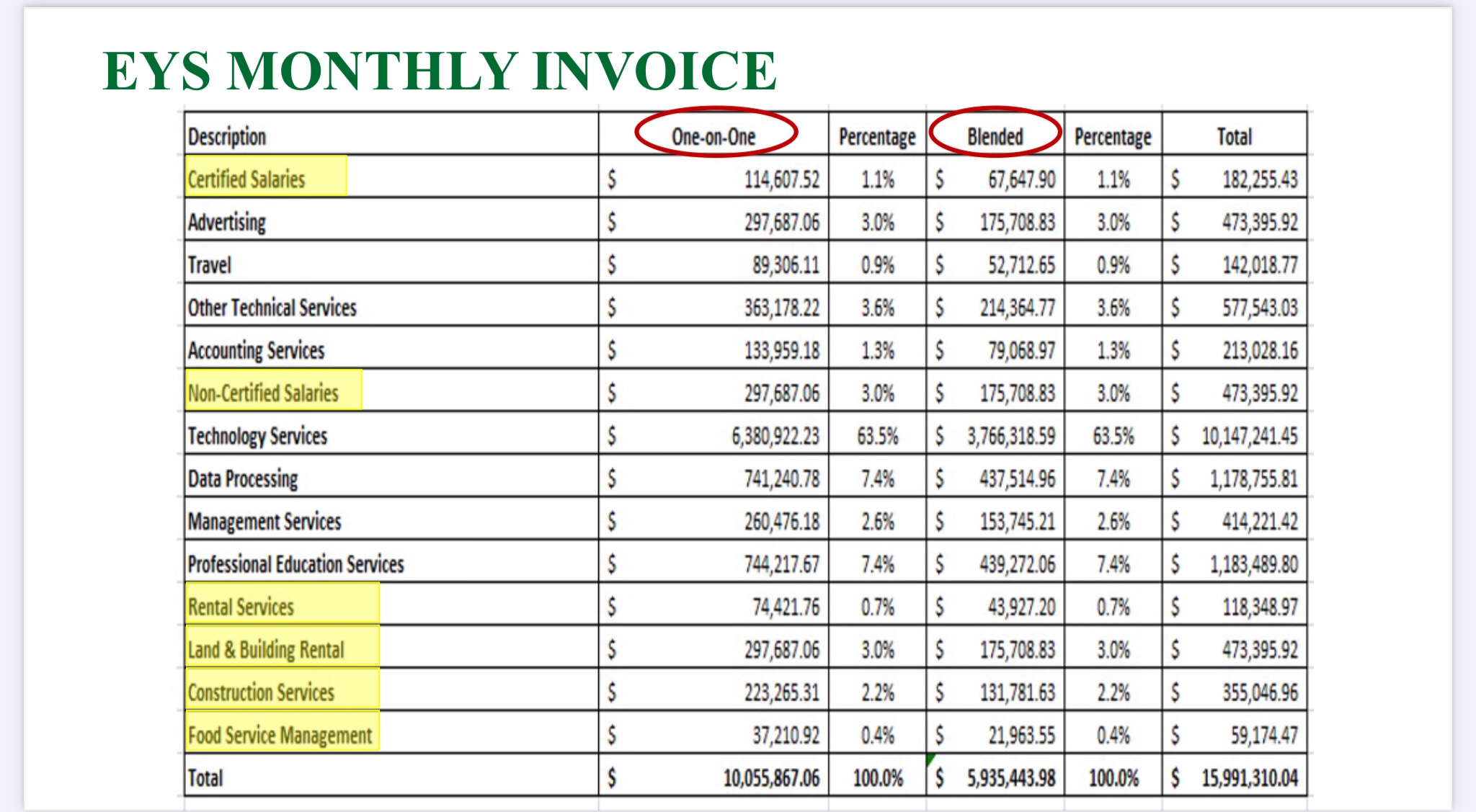 5. Epic claims the state can’t audit $125 million in funds that were allocated from 2015-20. On top of the 10% management fee that goes to EYS, Epic withholds $1000 per student for their “learning fund.” They have provided examples of use and ranges of expenses, but they have not brought receipts. As Byrd says in the presentation, “During the course of the audit more than $125 million of student educational funds were transferred to a company with no transparency and no accountability.”
5. Epic claims the state can’t audit $125 million in funds that were allocated from 2015-20. On top of the 10% management fee that goes to EYS, Epic withholds $1000 per student for their “learning fund.” They have provided examples of use and ranges of expenses, but they have not brought receipts. As Byrd says in the presentation, “During the course of the audit more than $125 million of student educational funds were transferred to a company with no transparency and no accountability.”
Again, how is anyone ok with this? If you believe in school choice, don’t you worry that this hurts your cause? If you believe in fiscal responsibility, why aren’t you outraged? Every other school district has to keep a paper trail of every dollar we spend.
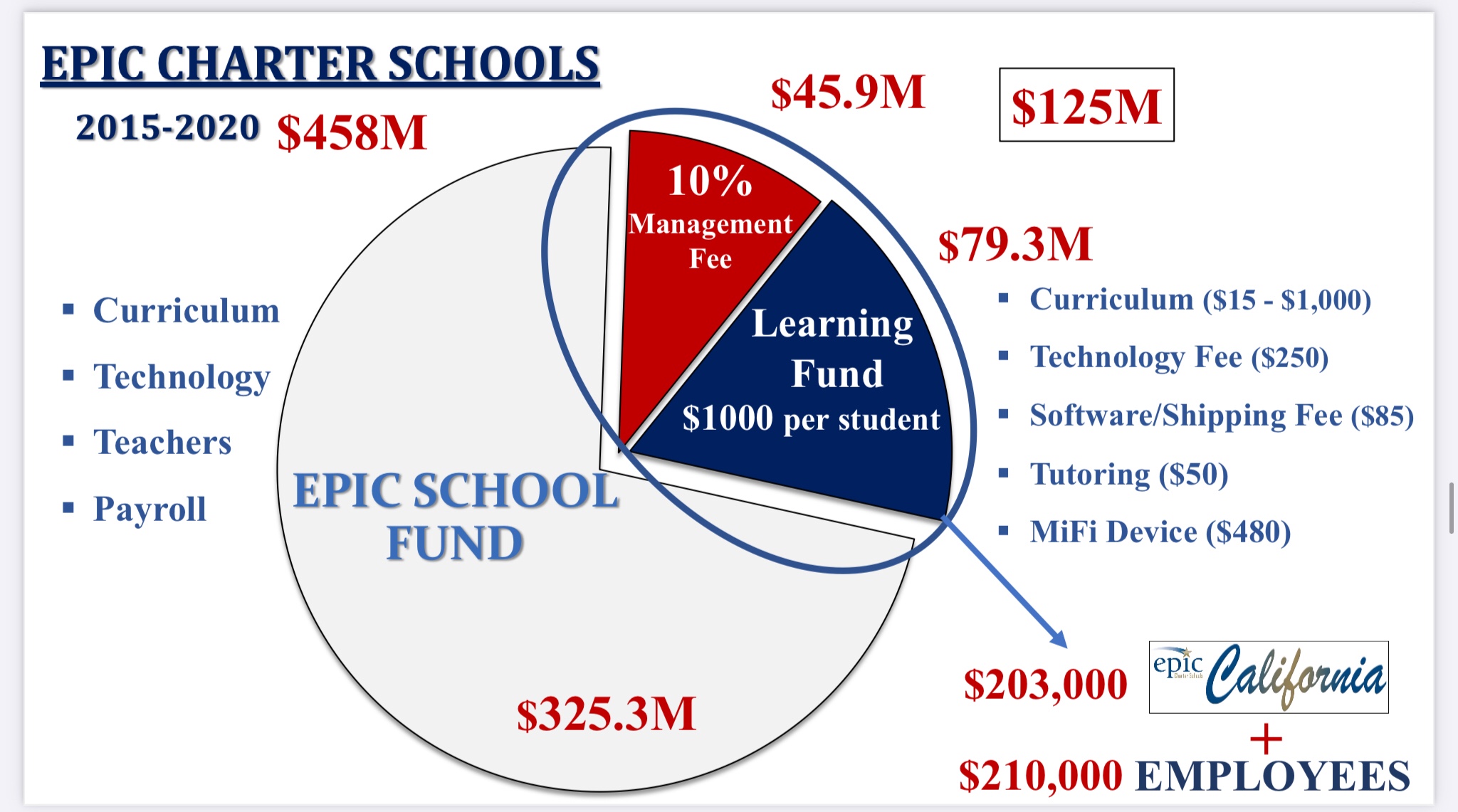 6. Byrd’s office has to deal with five separate law firms that Epic employs. This explain why the State Auditor and Inspector’s office has had to issue more than 50 subpoenas to date. Byrd says that responses have been late and incomplete. The next part of the investigation can’t move forward until a judge rules whether or not the learning funds are public funds and therefore subject to audit.
6. Byrd’s office has to deal with five separate law firms that Epic employs. This explain why the State Auditor and Inspector’s office has had to issue more than 50 subpoenas to date. Byrd says that responses have been late and incomplete. The next part of the investigation can’t move forward until a judge rules whether or not the learning funds are public funds and therefore subject to audit.
Five law firms. Just wow.
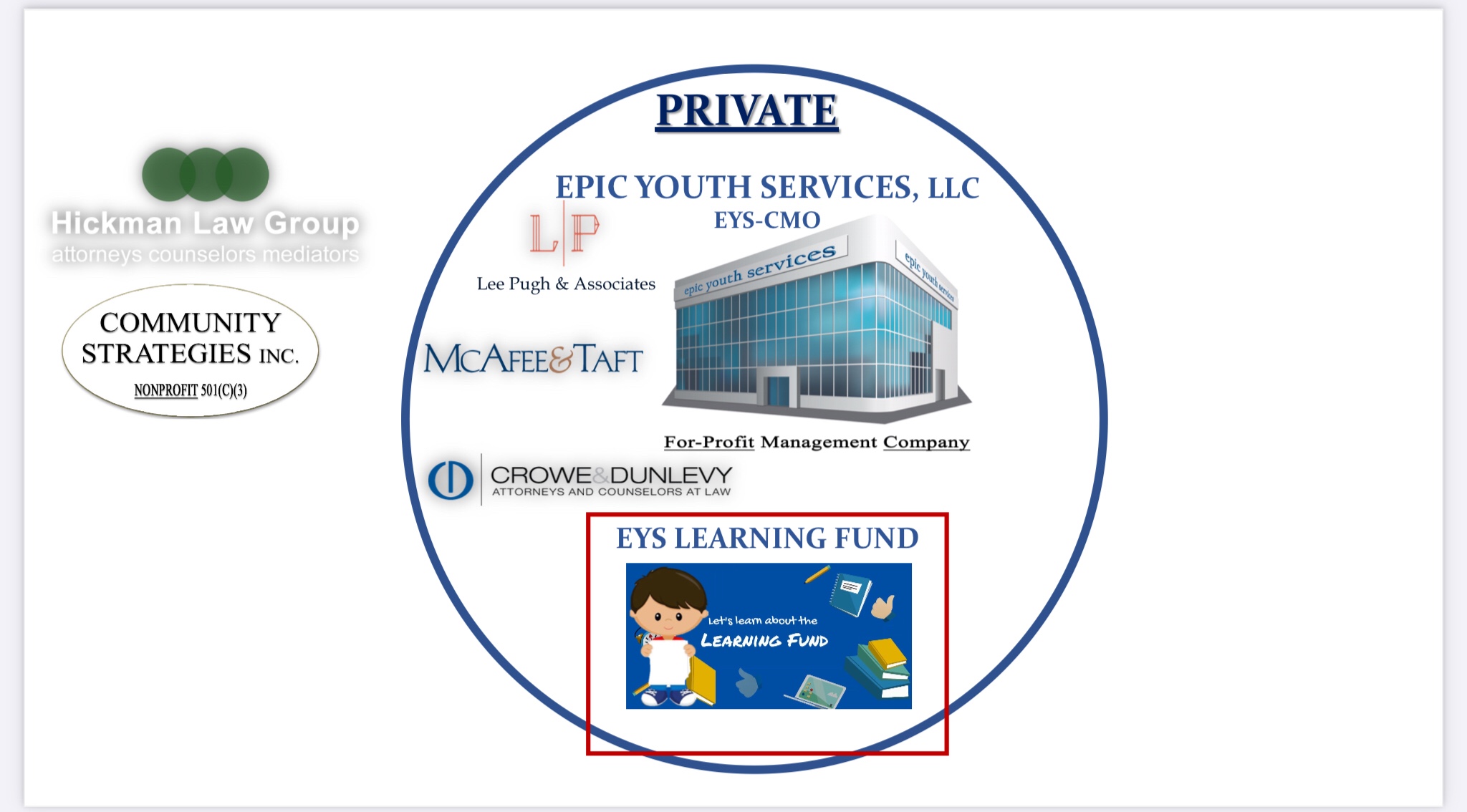 7. For the current school year, about $90 million more of state funding is hidden from view. We all knew that Epic (and other statewide virtual schools that apparently don’t self-deal with their own parallel companies like something out of Ozark) was going to gain students during the pandemic. That only increases the onus for transparency. Apparently, it also cranked up the necessity on the part of Epic to avoid it.
7. For the current school year, about $90 million more of state funding is hidden from view. We all knew that Epic (and other statewide virtual schools that apparently don’t self-deal with their own parallel companies like something out of Ozark) was going to gain students during the pandemic. That only increases the onus for transparency. Apparently, it also cranked up the necessity on the part of Epic to avoid it.
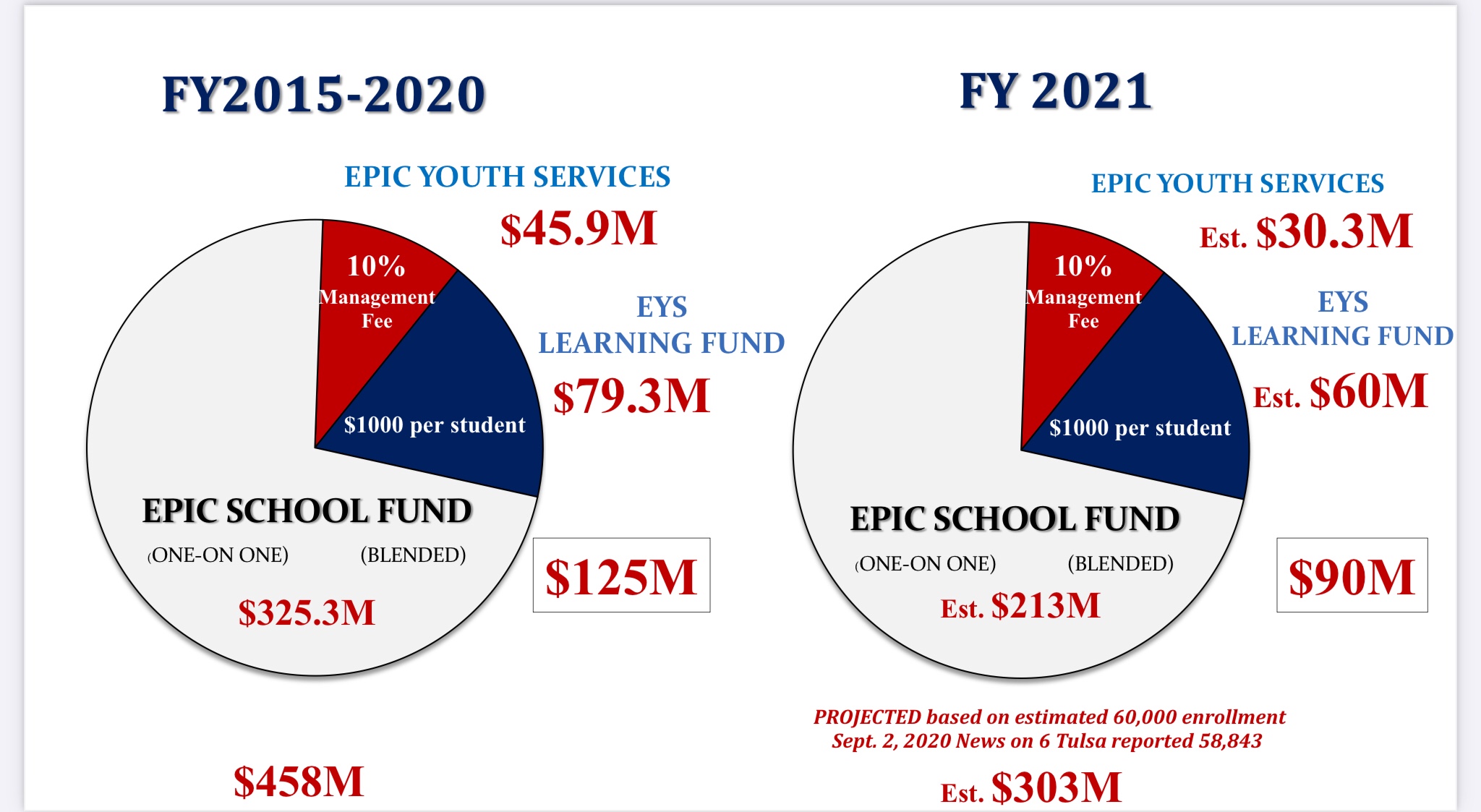 8. The scope of the audit is actually narrow. Byrd isn’t saying that charter schools, virtual instruction, or school choice more broadly are bad concepts. Again, it’s important to remember that our most school choice forward governor ever requested this audit.
8. The scope of the audit is actually narrow. Byrd isn’t saying that charter schools, virtual instruction, or school choice more broadly are bad concepts. Again, it’s important to remember that our most school choice forward governor ever requested this audit.
I know good teachers who work for Epic. This isn’t a knock on the work they do or an attack on their character. This audit report questions the legality and ethics of the actions of Epic’s leaders.
For the record, I’m not against charter schools, virtual instruction, or school choice, other than vouchers for private schools. Discussions of school choice aren’t binary. And we shouldn’t paint charter schools with a singular brush.
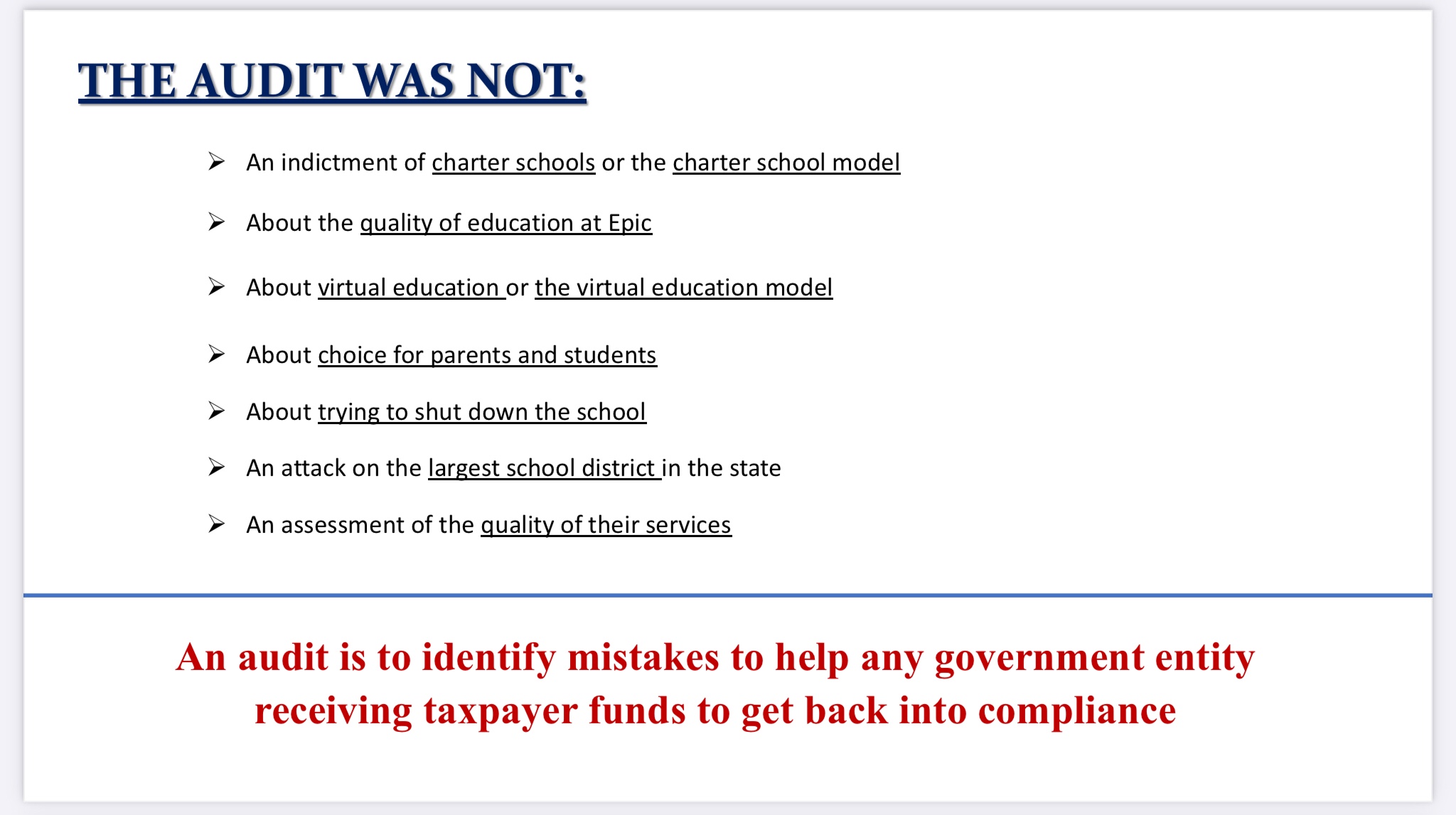 9 & 10. Senate Bill 895 is sketchy. Shortly after Byrd’s office released their findings, Senator Paul Rosino (R – OKC) filed a bill that would strip her office of the authority to perform this kind of audit. Imagine an agency under investigation being able to choose their own investigators. Worse yet, this bill is based on suggestions of Epic’s co-founders.
9 & 10. Senate Bill 895 is sketchy. Shortly after Byrd’s office released their findings, Senator Paul Rosino (R – OKC) filed a bill that would strip her office of the authority to perform this kind of audit. Imagine an agency under investigation being able to choose their own investigators. Worse yet, this bill is based on suggestions of Epic’s co-founders.
Byrd’s office released her findings on October 1. As the Tulsa World points out, Rosino’s campaign received donations from Epic people on the 2nd. Then he filed this bill. Yeah, it probably means nothing.
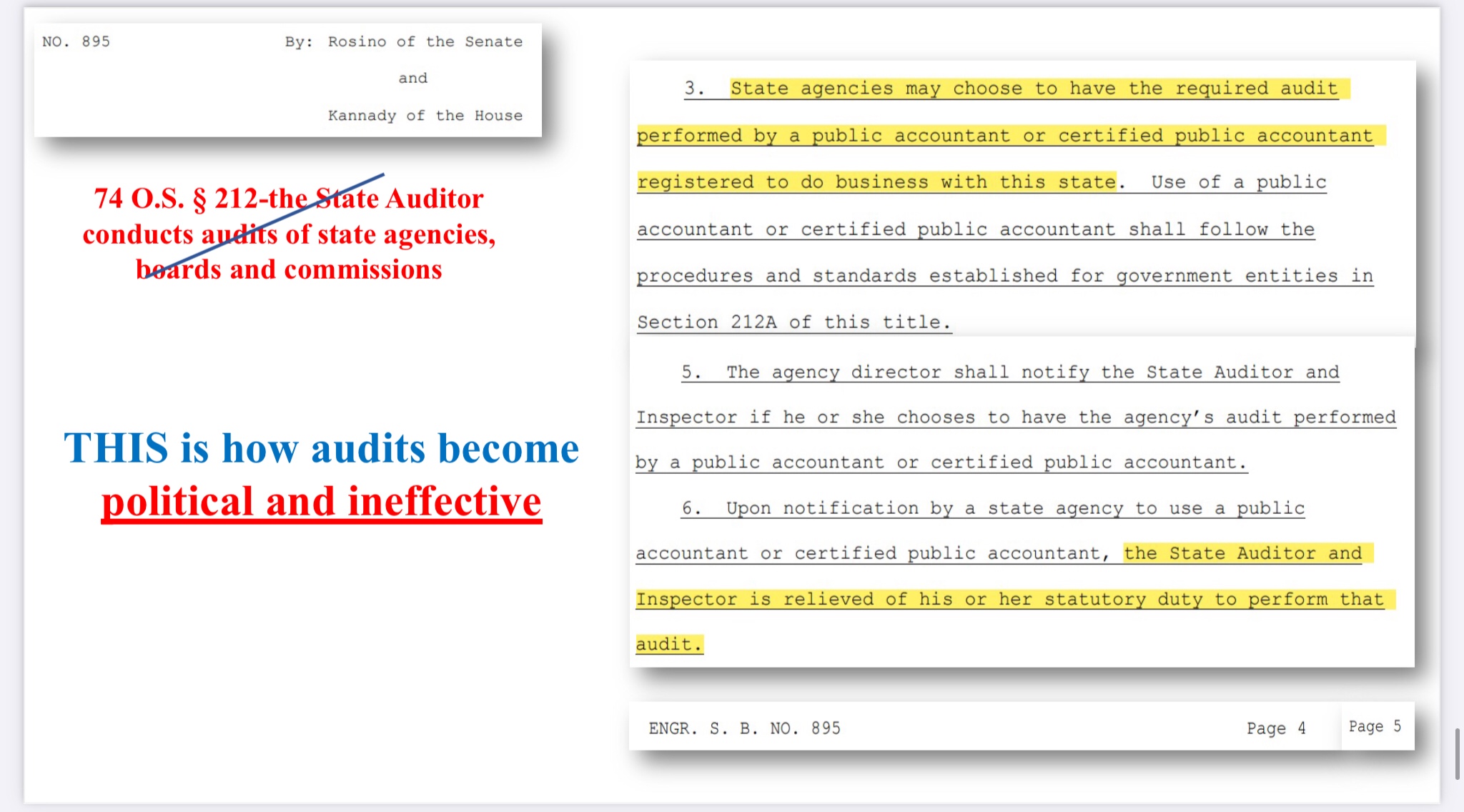
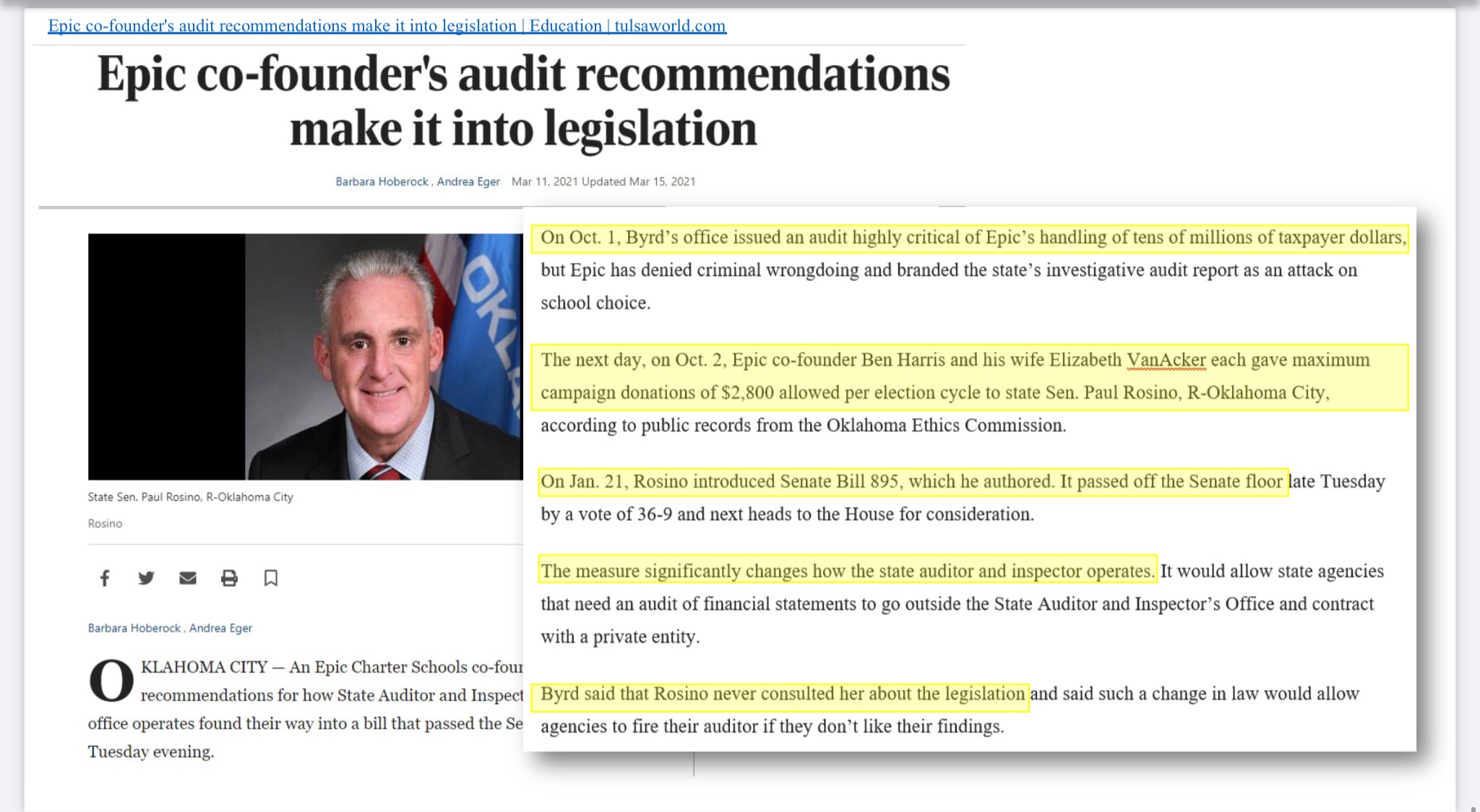
Again, I can’t urge you strongly enough to play the video. Just keep it on in the background while you’re cooking dinner or answering email. Break it up into chunks. Turn it into a Reader’s Theater for your drama class.
Well, maybe don’t do the last one.
This is a very big deal, and we can’t quit asking for accountability. SB 895 has already passed the Senate and is now waiting to be heard in committee in the House. We can’t be complacent about this.
Contact your representative. Tell a friend to do the same.
On Numerators and Denominators and the Reckless Redistribution of School Funding
Last week, during debate over HB 2078, Sen. Greg Treat (R – OKC) waxed nostalgic over his younger days when he was a mathlete in school. In discussing the way he feels school funding should be distributed, he made sure we all understood numerators and denominators.
I felt like I was watching a scene from Real Genius, which I probably did later in the week. I mean, the movie holds up so well all these years later.
Not many people know this, but I too was a mathlete back in the day. In today’s political climate, I think my teachers probably would have been forced by law to reveal that information to my parents if they suspected it. Sure, I had a C in Algebra, but I did have all those MathCounts trophies.
I’m digressing, but in my defense, it’s early, and I didn’t think I was going to be writing this morning, but a major piece of legislation dropped last night. The bill, a committee substitute for HB 2755, is scheduled to be heard this morning in the Senate Appropriations Committee. It is on the agenda for 10:00.
In simple terms, the bill has two impacts:
- Beginning July 1, money from building funds and all local- and state-dedicated revenue except bond issues would be shifted from traditional school districts to charter schools based on the number of students who live in their district but attend a charter.
- Virtual charter schools would receive only state aid and state-appropriated dollars.
On the surface, that seems pretty harmless, but since I’m a (former) mathlete, I’m still thinking about those darn numerators and denominators. Or maybe, since I’m a superintendent, I’m thinking about the fact that our local revenue only goes so far and that dividing it further (by adding more to the numerator), has a deleterious effect on **checks notes** oh yeah, every other school district in the state.
Maybe you’re somewhere far away from Oklahoma City or Tulsa, and you’re thinking that this bill really won’t impact your local school district. After all, you are several counties removed from any physical charter school. And they seem to have carved out an exception for virtual schools. Keep in mind, though, that statewide blended charter schools draw students from all 77 counties. Besides, anything that draws down from the funding formula impacts all districts.
Yes, my friend, you’re in this too.
This bill, in a sense, codifies the surprise settlement that the State Board of Education – against advice of their legal counsel – made a few weeks ago. Ostensibly, the problem this solution is solving is the disparity between per pupil funding for traditional public schools and for charter schools. Rather than being additive, it is divisive.
They’re taking the same dollars and spreading them around further. Not very mathletic of them, is it? Among reasons I oppose this bill:
- Local property tax as a funding source exclusive to the local school district is a fundamental piece of Oklahoma school finance enshrined in the Oklahoma Constitution.
- Public school districts do not have excess building funds they can afford to lose, and any shifting of dollars will hurt students.
- Charter schools do not have locally elected boards that taxpayers can hold accountable for spending decisions.
- There are better mechanisms to fund capital needs of charter schools *and* public school districts that receive little ad valorem revenue. Oklahoma is one of only four states that doesn’t provide state funding for school capital improvements.
- Shifting limited funding from one underfunded school district to another isn’t a solution.
If this disparity suddenly concerns our legislature, there is a better way to fix it. Instead of dividing already scarce resources, they could find a way to add to charter schools without taking away from the rest of us.
By the way, this is a central part of the governor’s re-election campaign plan. If you don’t believe me, see below:
The state board decision, the bills that passed last week, and even the legislative efforts to kneecap the State Auditor and Inspector’s investigation of Epic, are all part of a coordinated plan to run the Jeb Bush, Betsy DeVos, and OCPA agenda of dismantling public education. Sadly, many of the well-meaning legislators who we elected because of their professed support for public schools are taking the bait and following along.
Be heard and be seen fighting for our students. There’s a way to fix the funding disparity without lowering the bar.
Below are the senators on the Appropriations Committee. Please reach out to them and ask for a no vote on HB 2755.
It Really Does Matter
Sometimes when I follow the happenings of the Oklahoma Legislature, I just shake my head and repeat the mantra I learned from that 1979 Bill Murray classic, Meatballs.
So far, the First Session of the 58th Oklahoma Legislature is shaping up to be as bad – if not worse – than the First Session of the 53rd. Let’s review.
The 2010 election brought us Gov. Fallin and State Superintendent She Who Shall not be Named. It also led to the 2011 legislative session that gave us:
- Third grade retention law (since significantly improved)
- A-F report cards for schools (modified several times since, marginally improved)
- Private school vouchers (since increased)
- Teacher evaluations tied to test scores (removed from law before ever happening)
This is merely a sample of educational reforms passed (without additional funding, I might add) ten years ago. At the time, it was a low-water mark for public schools. Gradually, though, some of the bad policies improved, or went away entirely. That change happened because we as public school advocates fought for it.
One notable example of this was in 2015. That year, the Oklahoma Legislature passed HB 2625, which created a committee including parents in the decision-making process regarding the retention or promotion of third graders. In short, parents and educators were united to make sure that a single test score didn’t result in holding students back. Governor Fallin vetoed the bill, and the Legislature quickly and soundly overrode her veto (by a combined vote of 124-19). There wasn’t even floor discussion. They just walked in, voted, and left. It was glorious.
As I watch this year’s Legislature, I find myself feeling low again. Certainly the toll of 13 months of pandemic life and school leadership contributes to that. Just the same, it seems like public schools are under constant attack, maybe to the worst degree since that session ten years ago. This is perfectly illustrated by the happenings of last Wednesday, when Governor Stitt signed two bills with better talking points than impacts. This is from the governor’s press release:
House Bill 2078 and Senate Bill 783 allow for students to attend public schools that best meet their needs and modernize the funding formula to match enrollment counts more accurately.
“This is a monumental day for education reform in Oklahoma,” said Gov. Stitt. “Education is not one-size-fits-all, and these bills allow parents and students to have the freedom to attend the best public school for them regardless of their ZIP code. Additionally, modernizing the funding formula ensures funding follows the student, not the school. These reforms are vital to getting Oklahoma to be a Top Ten state in education and I am proud of this Republican legislature for its dedication to putting students first.”
“Today is a historic day for education in Oklahoma,” said Secretary of Education Ryan Walters. “We have transformed funding for every single student in the state and empowered them to choose a school that best fits their needs. These two bills will work seamlessly together to have an immediate impact on the way we educate Oklahoma’s students and I commend our state leaders for getting this across the finish line.”
HB 2078, authored by Rep. Kyle Hilbert (R-Depew) and Sen. Zack Taylor (R-Seminole), modernizes the education funding formula by basing per-pupil funding on the most recent enrollment data. The previous system gave school districts multiple enrollment figures from which to base their funding, causing some districts to receive state funds for students who are no longer enrolled.
SB 783, authored by Sen. Adam Pugh (R-Edmond), Sen. Kim David (R-Porter) and Rep. Brad Boles (R-Marlow), amends the Education Open Transfer Act to allow students the ability to transfer to another school district at any time, provided the district has space available.
Let’s be honest. We knew he was going to say Top Ten State at some point. It’s similar to how you have that one relative who ends every text with lol. You’ve seen it so much it’s lost all meaning.
The truth about HB 2078 is that it creates more volatility in the funding formula. It makes planning harder for districts. It also doesn’t make the funding follow the student that much, since districts will need to be more conservative with their fund balances to prepare for the unexpected.
Meanwhile, SB 783 would better be described as an open transfer bill for families with the means to drive their children from one school district to another every single day. Since many of the growing districts in Oklahoma are already at capacity, they probably won’t be accepting many transfers anyway. As a superintendent, I’m happy to provide an education for whoever shows up. I want our schools full, and I stand by the work our teachers do to teach ALL kids, regardless of zip code. I just don’t think the bill is the egalitarian fix all that our state leaders are advertising it to be.
Where is this going, now that I’m already 750 words deep into writing? After all, every educator membership group in the state opposed these bills. They passed anyway, and the governor gleefully signed them into law. Perhaps Bill Murray was right. Maybe it just doesn’t matter what we say or what we do. For whatever reason (or maybe a collection of reasons), there are more bills targeted at punishing teachers, administrators, and school board members than I’ve seen in years.
My frustration was so high that I even wrote a post over Spring Break – my first topical blog post in over two years. The last straw for me was SB 639, which directly relates to students receiving the Oklahoma’s Promise scholarship. It’s to be expected that our elected officials will from time to time attack the adults teaching kids as well as school district leaders. I wish it weren’t trend behavior, but as the son of a teacher, and a 28 year educator myself, I’ve seen it enough to expect it. This bill, however, was an attack on the most vulnerable students we serve.
Friday, we received a glimmer of hope. After listening to our membership organizations, along with significant urging from higher education leaders, SB 639 has been revised in committee. They’ve removed the paragraph adding the payback provision. With that change, it’s actually a good bill. And it’s a reminder that we have to continue reaching out to our elected officials. We may not get them to listen every time, but they definitely won’t hear us if we aren’t talking to them.
This year’s Legislature will probably continue meeting for seven or eight more weeks. There are several live bills (both good and bad for public schools) in each legislative chamber. There are last-minute committee substitutes to be made. And as has been the case in years past, we know very little about the behind-closed-door budget discussions between the governor’s staff and the few legislators who get to be in the room where it happens.
Here are a few highlights (all in the House) of what we expect this week:
- The House Banking, et.al. Committee will hear SB 267 on Monday. This bill would allow any retired educator to return to the classroom after being out for a year. This is a good measure that would help districts staff their classrooms when all the transfer students show up next year.
- The House Rules Committee will hear SB 634 on Tuesday. This would require new paperwork each year for individuals to have membership dues deducted from paychecks. I don’t see it having much impact on how many teachers, support employees, or administrators join their professional organizations, but it will create a massive paperwork burden. One extremist think tank calls it a measure to protect free speech. That’s nonsense. Each of these employees already have the choice to join or not join. And many who quit do so mid-year. The only real impact will be a significant increase in paperwork. That’s not where I want my payroll department’s attention focused over the summer and at the beginning of the school year.
- The same committee will also hear SB 962 on Tuesday. This bill would move school board elections to November. Currently, primaries are held in February and elections are held in April (two days from now, in fact). The stated purpose of the bill is to create more engagement in school board elections. The result, regardless of the intent, will be to insert a greater level of partisanship into the process. I personally like that school and municipal elections usually lack that kind of divisiveness and have their separate calendars. Sure, they aren’t always kind, respectful processes, but adding party politics won’t make them any more civil. Here’s a list of committee members, in case you want to reach out to them.
- A bill that deserves its own separate blog post, SB 895, will likely be heard by the House Appropriations and Budget (A&B) Committee this week, though as I’m writing this, it does not appear on any posted committee agenda. This bill would – and I swear this isn’t one of those times I’m trying to be funny – allow state agencies under investigation to bypass the duly elected State Auditor and Inspector and SELECT THEIR OWN AUDITOR. Gee, what could go wrong. Maybe the better question is who would want something like this to happen? For more on that, I encourage you to read this March 11 Tulsa World article that connects the dots. Here’s a blurb:
An Epic Charter Schools co-founder’s recommendations for how State Auditor and Inspector Cindy Byrd’s office operates found their way into a bill that passed the Senate floor on Tuesday evening.
On Oct. 1, Byrd’s office issued an audit highly critical of Epic’s handling of tens of millions of taxpayer dollars, but Epic has denied criminal wrongdoing and branded the state’s investigative audit report as an attack on school choice.
The next day, on Oct. 2, Epic co-founder Ben Harris and his wife Elizabeth VanAcker each gave maximum campaign donations of $2,800 allowed per election cycle to state Sen. Paul Rosino, R-Oklahoma City, according to public records from the Oklahoma Ethics Commission.
On Jan. 21, Rosino introduced Senate Bill 895, which he authored. It passed off the Senate floor late Tuesday by a vote of 36-9 and next heads to the House for consideration.
Seriously, I encourage you to read the entire article. And the text of the bill. And then reach out to your House member, as well as those on the A&B Committee.
The stakes are too high for those of us who care about public education to remain silent. This year of all years – after all we’ve been through during the last 13 months – what we say and do does in fact matter. We may not get all the wins, but we need to be seen fighting for our students and our schools.
Oklahoma’s Promise (Fingers Crossed)
Oklahoma’s Promise (Fingers Crossed)
In the summer of 2004, on my first day of work for the Oklahoma State Regents for Higher Education, I completed my HR paperwork and walked to my cubicle where I found a stack of paper about one foot tall on my desk. They were high school transcripts and OHLAP verification forms. As a high school principal just a few weeks before, I had been responsible for reviewing transcripts for OHLAP, signing them, and sending them off somewhere. Now I was somewhere, reviewing those transcripts through a different lens.
Here is the description of the program (which has since been renamed Oklahoma’s Promise) from the State Regents’ website:
Oklahoma’s Promise allows eighth-, ninth- or 10th-grade students from families with an income of $55,000 or less to earn a college tuition scholarship. Students must also meet academic and conduct requirements in high school.
Created in 1992 by the Legislature to help more Oklahoma families send their children to college, Oklahoma’s Promise was originally designated as the Oklahoma Higher Learning Access Program. The program is administered by the Oklahoma State Regents for Higher Education.
Oklahoma’s Promise has been an incredibly successful program. The State Regents publish a statistical report every year that provides a wealth of information about enrollment, completion, and so much more. For the 2019-20 school year, 75% of high school students who signed up for the program, completed the academic requirements for it. Compare that to the graduating class of 1996, in which only 39.6% of students who signed up completed it. Oklahoma’s Promise, if nothing else, encourages students from low-income families to complete high school having completed more college-bound courses. That alone makes it a public program with longitudinal data to prove its efficacy.
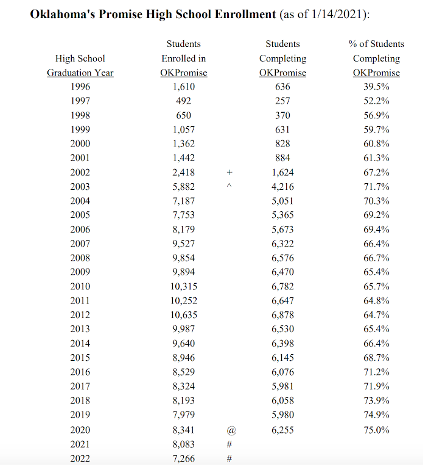
Now, for some reason, the Oklahoma Legislature wants to change it. Senate Bill 639, authored by Adam Pugh (R – Edmond), makes two significant changes to Oklahoma’s Promise. I like one, and I hate the other so much that I have flames coming out of my head.

The good change would be an expansion of Oklahoma’s Promise to include training for programs identified by the Department of Commerce as “critical occupation areas.” It makes sense. Not every high school graduate wants to go to college, nor do they need to. If we can help people gain qualifications to begin a career, we should. Again, it’s good public policy. Once we have 25 years of data on this change (as we do with Oklahoma’s Promise), I bet the investment will prove worthwhile.
The bad change – and the word bad is really not strong enough here – is a clawback provision that would require students who don’t complete their program to pay the state back. I’m curious here…when we provide tax credits to companies that in turn lay off employees, do we ask them to repay the state? Nevermind. I’m going off on a tangent.
When questioned on the floor of the Senate about this provision, Pugh offered the following defense:
“We have got to stop with the bigotry of low expectations in this building.”
Ahh, the bigotry of low expectations. It was a garbage line in 2000 when W was pitching his vision for public education, and it’s a garbage line now. It’s also completely contradicted by fact.
I still know some of the people who work in the Oklahoma’s Promise office at the State Regents. They have a passion for the program and dedication to the students who benefit from it. They also have receipts. Here are a few more data points from their annual report.
For one thing, Oklahoma’s Promise students have higher high school GPAs than students who aren’t enrolled in the program. This is likely due to the well-understood importance of having students set goals and regularly discuss them with the adults in their lives. It also speaks to the importance of school counselors and strong guidance programs.
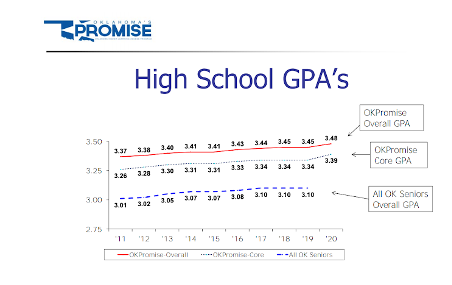
They have higher ACT scores.
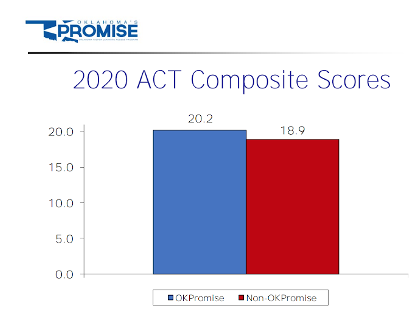
They have higher college-going rates…
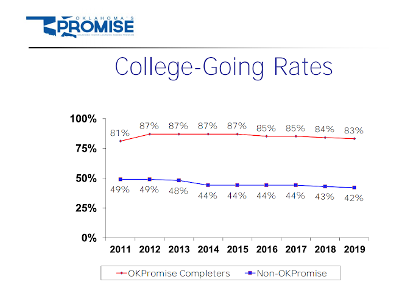
…and lower college remediation rates.
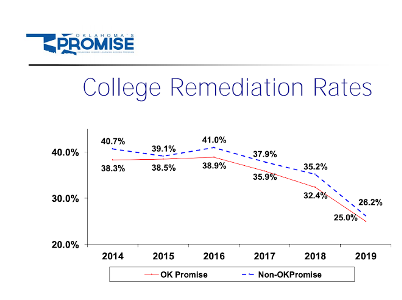
Oklahoma’s Promise students have higher college GPAs…
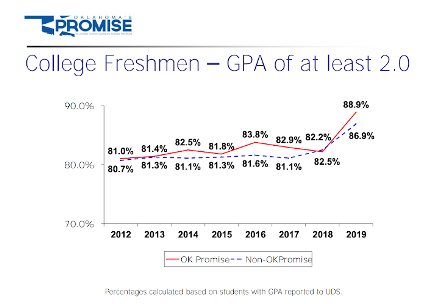
… as well as better persistence rates into their sophomore year…
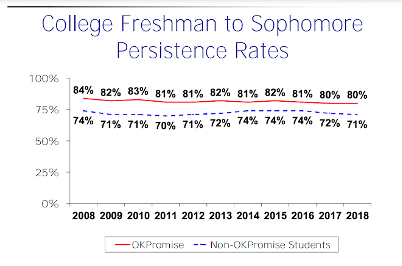
… and degree completion…
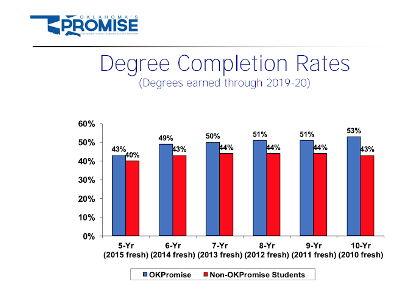
… and postgraduate employment.
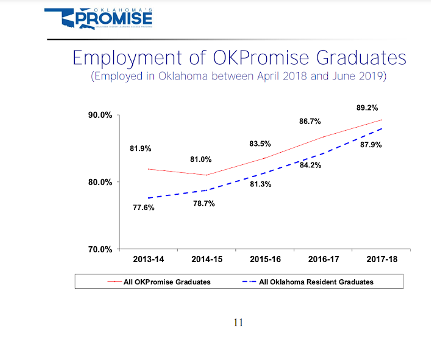
Let’s be clear. Nobody has low expectations for the Oklahoma’s Promise financial aid recipients. They’re Oklahoma’s most reliable college students. It seems to me that they keep their promises better than the Oklahoma Legislature does.
College is hard for many people, and for many reasons. An endless number of scenarios can complicate the time span between a student’s matriculation and anticipated graduation. Many of these are out of their control. We need to remember that as Oklahoma taxpayers, we subsidize the education of all students at our public institutions of higher education. Senate Bill 639 would only punish the poor ones who don’t finish.
If you believe that people with means (read: privilege) are the only ones who should have the opportunity to advance themselves, maybe you support this bill. On the other hand, if you believe that the investment Oklahomans have made for a quarter century in the education of students who might otherwise miss out is worth it in spite of the ones who don’t reach the finish line, you should fight this bill with every fiber of your being. We can’t tell people to try, but we’ll punish you if you fail.
Please contact whoever represents you in the House and ask them to vote against SB 639. Or at least ask them to fix it. Leave the good part in. Take the bad part out.

Relationships
Somewhere in Oklahoma this year, there is a sixth grade student who does well in school, but could do better. He’s not a mean kid, but he gets in trouble – in class, at lunch, on the bus – quite a bit. He’s just bored and restless. He’s friendly, but an easy target for bullies. And two of his core teachers are in their first year.
I know this student exists somewhere in Oklahoma because I’m not a unicorn. I was that kid, at Whittier Middle School in Norman, in 1981. Throughout my K-12 years, I was talkative, sometimes defiant, and yet fortunate enough to have teachers who believed in me. One of them was Debra Baum, who I had for sixth and seventh grade math.
After I finished middle school, I didn’t see Debra for years. She wasn’t there when my own children started school there 25 years later. The other first year teacher from 1981 still was, and she remembered me, which blew my mind. We caught up, and I remember being the first student she ever assigned detention, not that any of that matters now.
No, the next time I saw Mrs. Baum was at Norman High School a few years ago when my daughter was there. We didn’t really catch up, but it was good to see her. She’s reached out before to let me know she has followed my career and that she’s proud of me. As someone who preaches about the value of relationships, it has extra meaning for me that my own former teachers are still proud of me.
Then yesterday, this happened:
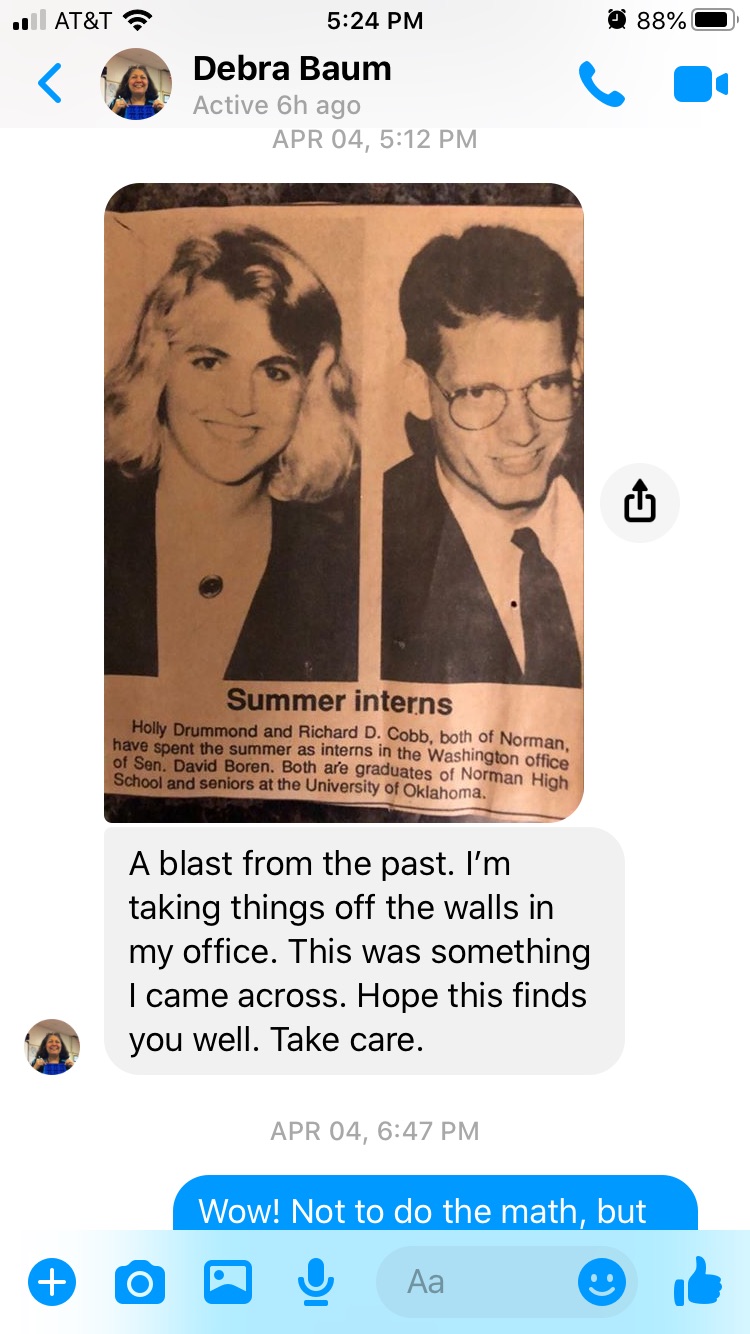
I’m not going to describe my reaction in full; suffice it to say that I was deeply moved. This means that eight years after having me in class Debra saw an article about me in the newspaper and cut it out. Now she has saved it for almost 30 years.
I realize that I’m really dating both of us here, but whatever.
I’m a grown man, a father of three, a husband, a superintendent to over 14,000 students and more than 1,600 employees. With everything going on in my life right now, I can still be caught off guard by a teacher I had in 1981 reaching out to me out of the blue.
Now imagine that I’m that same sixth grader, home for an extended spring break and the world breaks out into a historic pandemic. What that DM meant to me yesterday pales in comparison to what teachers contacting their current students means to them now. They need to hear our voices. They need to know we care – and not just about their STAR scores and AP exams.
None of us think that what we end up doing the last quarter of this school year will replace what we had planned to do. Instead, we get to focus on two things that matter more than grades and standardized tests: relationships and learning for the sake of learning.
Prior to Spring Break, when the magnitude of the pandemic was starting to sink in, districts around Oklahoma shot into action, working on plans to feed children, communicating proactively, and looking at ways to finish the school year under circumstances none of us could have predicted. Months from now, we’ll look back on this time and find countless things we could have done differently. I’m sure of that.
I just hope we don’t look back and wish we had done more to show our students that we care about them.
Collectively over the last few weeks, we’ve grieved over so many things. When this all started, my district had four teams headed to the state basketball tournament. They don’t get to win or lose it on the court now. We have track teams and jazz bands that wanted to defend their state championships. That’s a no go. We’ve canceled rites of passage, such as prom, and we’re all scrambling to plan alternate graduation ceremonies.
None of this is ok, but this is where we are. When we call our students, it’s perfectly acceptable to tell them that. In fact, it’s probably a really good thing to tell them that the adults are scared and uncomfortable too. Kids can usually tell whether we’re telling the truth or not anyway.
Eventually this will all end. We will go back to doing many of the things we’ve always done. Some things will be different forever, though. I hope the way we value each other is one of them.
Take care, and stay safe.
9 days to go: vote #oklaed

Yesterday, on a beautiful October afternoon (during which both OU and OSU had homecoming parades), a group of public education advocates gathered at the Capitol to remember why we walked out in April and to focus on the education vote in the upcoming election.
I would agree with Oklahoma Watch’s assessment. Yes, it was a small crowd, but it was pretty vocal. Many of the speakers were dynamic. I was also there.
The Oklahoman had this to say about the rally:
Many teachers hope the election will result in more lawmakers who are willing to increase the state’s education budget.
“I’m here today because education is so important,” Kim Schooler, a fourth-grade teacher at Truman Elementary in Norman, said. “It is the key to everything. That’s why I’m a teacher.”
Amanda Jeffers, a candidate for House District 91 who teaches English at Crooked Oak High School in Oklahoma City, told the crowd she walked out in April because “giving teachers a moderate pay increase doesn’t fix the problems we face in the classroom.”
I was one of the speakers yesterday as well, and a couple of people have asked me to post my comments. Here’s what I had written in advance, though I probably ad libbed a bit:
So…what does that ideal, pro-education candidate, in the most generic sense possible look like? Since I can’t endorse anyone specifically today, let me paint you a picture.
A candidate who supports public education understands that health care, corrections, and addiction issues ARE public education issues.
A candidate who supports public education knows that you can’t increase teacher pay by giving us more flexibility with how we spend our building fund. Whether it’s a quarter or five nickels, it’s still 25 cents.
A candidate who supports public education reads, engages, and votes. And walks around the Capitol with teachers when they’re fighting for our profession.
By the way, a candidate who supports public education knows that the teacher walkout was about WAY more than teacher pay.
A candidate who supports public education is involved with – and ideally, leading the way – helping us all understand how adverse childhood experiences shape the gap between what is taught and what is learned.
A candidate who supports public education is someone who has been paying attention to the policy and funding issues that have been hurting our schools…for more than just the last few minutes.
A candidate who supports public education knows that public schools already have academic accountability and fiscal transparency, as required by more laws than I can count.
A candidate who supports public education also knows that vouchers would take public school dollars and send them to private schools that lack accountability and transparency.
Finally, a candidate who supports public education is someone who is more concerned with doing right by school children than with his or her political future.
So far, friends, 2018 has been a landmark year. Many of the legislators who have tried to cut this state into prosperity have changed their tune. Others decided they didn’t want to stick around. Some, well, some we have just fired. Keep voting for better candidates. Keep voting for public education. Keep voting for the future.
With that said, do you know who your candidates are? Do you know where your polling place is? Do you have a plan to take the time to vote on November 6th? Our state has come too far for any of us to stay on the sidelines and let other people make decisions.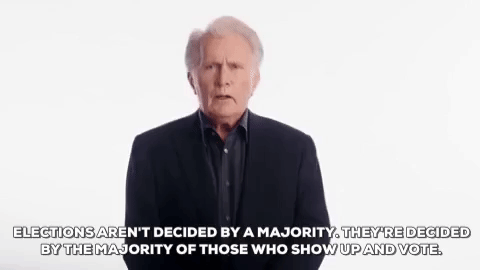
Why Trauma-Informed?
In 2008, after my grandmother passed away, I was putting the contents of her dresser into a plastic bucket so that the movers could pack and move everything out of her room at her retirement community. I didn’t have much time, but I stopped and looked at many of the things she had kept. Old pictures of my mom and her brother. A birth certificate from one of her siblings who died in childhood. Veterans benefits notices. Booklets of Green Stamps.
And for some reason, my first grade report card.
At the end of the school year, my teacher commented that I had become angry and disagreeable during the fourth quarter. That makes sense to me. That’s about when my parents split up.
Please understand, I’m not looking for sympathy. Or empathy. What was hard for me at age six has turned out to be one of the best things that ever happened in my life. I was probably in my 20s before I really got that, but objectively, it couldn’t have worked out better. In short, I got to experience a step father who loved and appreciated my brother and me probably more than he really had to. And I loved him dearly up to his death five years ago.
And okeducationmom has never let me down.
My parents divorced in 1977. We lived in a small town. Certainly everyone knew about it, but that doesn’t mean they could relate to it. With 40 years of hindsight, it’s easy to see that I would have benefited from having a teacher who got it. I don’t mean that I needed a teacher who understood what I was going through; rather I could have used a teacher who at least understood that I was going through something. Clearly I was lashing out irrationally.
I probably didn’t do that again until about 2012, when I started blogging.
I wouldn’t have really framed it this way then, of course, but I was suffering, as a six-year-old, from trauma. This was the defining event of my childhood. Parents divorcing is that event for many of our students in Oklahoma. For others, it’s abject poverty. Or living in a home with someone suffering from addiction. Or losing a parent or sibling. Or a parent being incarcerated. Or a debilitating illness – whether you can see it from the outside or not.
We must accept this reality, and understand that we, as educators, are incapable of understanding all of the different traumas that our students experience. Fortunately, the Oklahoma State Department of Education and many school districts in Oklahoma (including Mid-Del) have started focusing on this.
In May, State Superintendent Joy Hofmeister announced that this would be a point of emphasis for her and her staff:
It Starts Here: Trauma-Informed Instruction will be held at the Cox Convention Center in Oklahoma City on Tuesday, Oct. 2, and feature experts in childhood trauma and healing. In partnership with state agencies, tribal nations and nonprofits that serve children and families, the OSDE’s in-depth event will target educators who are often the first to encounter trauma in individual children.
“A recent National Survey of Children’s Health revealed that Oklahoma’s youngest, most vulnerable children suffer more trauma than those in any other state in the nation, and additional trauma rankings among our children of all ages are alarmingly high,” Hofmeister said.
“We must come together to understand the complex issues surrounding Adverse Childhood Experiences (ACEs) in order to serve the hundreds of thousands of affected children in our classrooms and provide a path forward that is infused with resilience and hope. When we think of the importance of giving all Oklahoma children access to a high-quality education, there may be no more critical work than to ensure a foundation of safety and caring. We cannot allow these frightening statistics to remain unchecked.”
In our district, we’ve given a ten-question ACE quiz to our administrators and the teachers at many of our schools. It’s a good activity because participants can (if they choose to) share their score without discussing any specific trauma if they choose not to.
My score was a six. I’ve shared with you one reason why, and that’s all you get. It’s my story. It’s my childhood. And that’s the one part of it that I’m comfortable sharing.
Someone else’s score of a six might be different than mine. Another person’s three might have given them more trauma in childhood. Or maybe someone’s score of one. The point isn’t the number. The point is the child.
As educators, most of us can’t relate to the experience of a child who has an incarcerated parent. What we can do, however, is get to know that child and learn what that child needs from us. It’s not enough for us to teach reading, math, science, history, music, or anything else. Recognizing that we have students who need more than curriculum is the point of developing trauma-informed schools.
It’s not to stereotype different traumas and generalize their results on kids. It’s not so that we can manage our expectations.
Trauma doesn’t change the fact that a student’s starting point is not the sole determinant in who he or she becomes as an adult.
Here’s more from the OSDE press release:
Research indicates that the impact of childhood trauma can be mitigated through trauma-informed educational instruction practices that focus on relationship-building, resilience, hope and positive interactions. Addressing students experiencing trauma is part of Oklahoma Edge, the OSDE’s 8-year strategic plan for strengthening public education in the state.
In Oklahoma, nearly half of school-aged children have an ACE score of 3 or higher, which is strongly associated with negative long-term health outcomes including disproportionate rates of divorce, depression and violence.
“Hundreds of thousands of Oklahoma children are academically at risk and on a path to shorter, more difficult lives as a result of childhood trauma,” said Hofmeister. “Seeing our teachers stand up for kids is not news, but at the It Starts Here summit, we will equip them with the tools specific to childhood trauma that will enable them to be even fiercer champions of their students.”
Maybe this means having more counseling supports in place for children. Maybe it indicates a need for mentors or better mental health services. For years, we’ve known that there are students in our schools who lack positive adult interactions outside of our buildings.
We also have known for years that there are some amazing single parents, foster parents, and grandparents out there raising children.
That doesn’t mean that the trauma ceases to exist, though.
As with any good movement in education, I fear that this will turn into a collection of buzzwords and generalizations. I hope to God it doesn’t, though. We need to understand our kids, even the ones with experiences that we can’t relate to.
I’m thankful that the OSDE and Superintendent Hofmeister are taking a visible lead in this important work. I’m thankful for those in our district adding to the effort.
I will continue to learn everything I can about childhood trauma. More importantly, I will continue to learn how I can help the students I serve.
Four reasons to give Joy four more years
I ran into our state superintendent, Joy Hofmeister, yesterday morning at the Oklahoma State School Boards Association conference. She was on her way into the exhibit hall, talking to people she recognizes, being approached by people she doesn’t. She graciously talked to everyone who would stop, including me. We talked about the upcoming election, a few policy points, and where to find the coffee. I asked my friend Kenny Ward to take this picture so I could share it on Twitter and remind people to vote.
When Superintendent Hofmeister goes to a meeting or walks around a conference, she doesn’t keep an entourage with her. She was just walking solo through the conference space. You won’t find too many statewide elected officials who can say that. At more times than I can count during the last four years, I’ve been able to just approach her and start a conversation about whatever the policy topic du jour happens to be.
She’s been this way since she began her campaign four years ago. Now that I think about it, she’s been this way since Governor Fallin appointed her to the State Board of Education in 2012. From her first board meeting, Joy began asking questions. Quickly it was obvious that she wasn’t a good fit for the education policies of either Fallin, or Janet Barresi, who was then state superintendent.
In case you’ve forgotten, 2011 through 2015 were dark years for public schools in Oklahoma. I don’t want to get into a greatest hits flashback from former legislators, or the governor or Joy’s predecessor, so I won’t. I will say, though, that in my 26 years as a public educator, I have never heard such insulting discourse towards our profession and the people in it as I did during that time.
Joy, the candidate, was this real person who would sit down on the ground at schools and talk with elementary school students. Joy, the state superintendent, is the same real person. I’ve seen it in my own schools. Even when there’s an event with a decent amount of staging, she still stops and talks to students. She talks to them, from age four to 18, like they’re people.
She slew the beast four years ago, and she’s great with kids. Those reasons alone aren’t enough to give her four more years, though. Since taking that picture yesterday, I’ve been thinking of ways to articulate a few of the reasons I want to see the momentum continue. Here are four:
She listens to actual students and educators.
Under Superintendent Hofmeister, the SDE has utilized several constituency groups as sounding boards. Among these are teacher and student groups. Two of the last three years, I’ve had students from my own Superintendent’s Advisory Board also serve on hers. They tell me that she genuinely engages with them. Our teachers say the same thing.
She also meets monthly with a group of superintendents. Since this is the one I attend, I’ll try to characterize how those meetings typically go.
Usually, about 30-40 of us are able to make it to the meetings. If you can’t be there, you have the option to call in (and from experience, I can say you should probably mute your phone). The group represents all corners of the state, and it includes a representative sample of urban, suburban, and rural districts. We cover major initiatives, legislative updates, federal policy, funding issues, and a range of other topics.
During these meetings, Joy will tell us what she thinks and ask us what we think. If we’re not in alignment, she considers our reasons. I’ve seen her change her mind. I’ve seen her hold to an unpopular opinion that turned out to be wise. Most importantly, I’ve seen her welcome back each month the people who disagree with her. I’ve even been that superintendent a few times.
I’m not asking for any elected official to agree with me all the time. I just appreciate the ones who consider a wide range of opinions. She passes this test.
She successfully navigated the process to replace Common Core.
Just before the primary election four years ago, the Legislature tossed out the Common Core State Standards. Predictably, Joy’s predecessor handled the news poorly. What that meant for Joy, upon taking office, was shepherding a new process for developing math and reading standards. She had to do this under intense scrutiny and what essentially amounted to a campaign of state legislators.
Oklahoma educators wrote the new math and reading standards. My colleagues from Moore, where I previously worked, and Mid-Del, where I work now, were among them. Those individuals, along with the curriculum specialists at the Oklahoma State Department of Education (OSDE), had to fight fringe groups who really want nothing more than to end public education.
Again, this was a contrast to the previous administration, in which I was asked to serve on a number of working groups in which my opinions were never considered. Joy’s team not only let the educators they recruited write the standards; they fought to ensure that this work meant something.
She fought to eliminate End-of-Instruction tests and Value Added Measurement.
One of the biggest changes in the last few years is that the state eliminated End of Instruction tests for high school students. Instead of students with IEPs having to beg to graduate before the State Board, we’re back to trusting each public high school to decide who graduates.
People never cared about these tests, except for the fear that came along with them. High school students care about the high-stakes tests they self-select to take: ACT, SAT, and AP. We’re back to focusing on those, which is good for kids.
Another failure of the onslaught of education reforms of 2011 was the idea that you can (a) measure teacher effectiveness with test scores, and (b) construct other objective measures for teachers not in tested grades or subjects. Look, if you really could, I’d be all for it. I’m a father of three, and I always wanted more than word of mouth to tell me who the best teachers were. Unfortunately, that’s as likely as having a pet unicorn.
At about the same time as the Legislature was formally adopting new reading and math standards, it was eliminating the mandate for Value Added Measurements. No teacher ever had to have VAM added to his/her evaluation. We can thank Joy, along with key legislators, for that.
She stands with us.
Whether it’s our ongoing battle for reforms to the Reading Sufficiency Act or continuously raising awareness about the teacher shortage, Joy has our backs. She relentlessly communicates our needs. She has the ear of legislators, and she works well with members of both parties.
During the teacher walkout, she marched with teachers. She has the same mindset I do: kids first, teachers next, and everybody else after that. We all play critical parts in educating kids, but we have to understand that teachers are the rock stars, and that the rest of us are just roadies for the band.
Joy gets that.
She fights for funding. She fights for respect for our profession. I sincerely hope she gets four more years to do this.
Vote Tuesday.
Class of 2018: What comes next?
Taking a break from taking a break from blogging to share my graduation speech from this week:
Teachers, principals, family, and friends, it’s good to see all of you. Without your support, it’s hard to imagine all of these graduates being here today with all they’ve accomplished. This graduating class will have an immediate impact on the future. They will cross the country in the next few months as college students, members of the military, and in pursuit of lofty career goals.
Tonight, we celebrate your accomplishments. We look forward seeing where you go. And we anticipate you coming back having built upon the foundation you’ve received over the last thirteen years.

In his comedy, As You Like It, William Shakespeare wrote that, “Time travels at different speeds for different people. I can tell you who time strolls for, who it trots for, who it gallops for, and who it stops cold for.”
As I look at this auspicious graduating class, I see a bunch of people who are galloping along with time. You’re eager to get to whatever it is that comes next. I completely understand. Your families and teachers have been telling you your whole life that we’re preparing you for the real world.
If you have a chance to see a theatrical performance a little more modern than Shakespeare, I can’t recommend the Broadway musical Hamilton highly enough. In terms of innovation, content, and memorability, it’s one of the most accomplished pieces of art ever.
Central to the conflict of the story is the contrast Lin-Manuel Miranda draws between two historical figures: Alexander Hamilton and Aaron Burr.
In the opening song, Hamilton introduces himself, among other ways, by saying, “there’s a million things I haven’t done, but just you wait, just you wait.” He’s starved for experiences that will improve his opportunities and influence. He’s impatient. Later, at a critical moment in the early years of our Republic, Hamilton understands that the only way he can reach his goals is to find a way into “the room where it happens.”
On the other hand, Burr, who has similar aspirations in life, takes a far different approach. Prior to the Revolution, he advises Hamilton to “Talk less…smile more…don’t let them know what you’re against or what you’re for.”
Essentially, Hamilton sees what he wants and figures out what it takes to get it. He pursues his passions relentlessly. Burr knows what he wants, and he waits for it.
In truth, specific moments in life call for different mindsets. There are times that you know what you want, but you have to be patient. There are times that you know what you think, but you don’t want to offend anybody. Talk less, smile more.
Then there is a time to make sure that your voice is heard – to be in the room where it happens. If your goals include changing the world for the better, then you have no reason to delay getting in that room. Register to vote. Campaign. Show up for every election. Raise funds for a non-profit organization. Volunteer with organizations that solely focus on helping people. Devote your life to making people better every single day.
Some valuable things in life take a significant amount of time to achieve. Sometimes the journey is more rewarding than the goal itself. As you graduate today, two things are still true.
First is that high school has helped build you into who you are. Whether it was an endless streak of personal victories, a string of non-stop frustrations, or some combination of the two, the events of the last four years have left a mark on you.
The second truth is that your future is yet to be written. High school impacts where you are today, but this is only a starting point. Whatever you expect to become, or whatever others expect you to be, you’re the one who needs to be in control. There are a million things you haven’t done, but just you wait. Just you wait.
The next few months, the next year, the next decade – they’re all going to fly by in a blur. Rush towards the things that matter. Just don’t forget to soak in the unique moments you have with the people you meet.
Congratulations, and good luck, Class of 2018!
Welcome to the walkout, from okeducationmom
A couple of years ago, I turned the blog over to my mom, who proceeded to get more page views than I usually do when I post something. As we reminisce about HB 1017 and prepare to meet at the Capitol, I thought this would be a great time to give her the keys to the blog again.
Hello, Friends,
This week is nostalgic for me. As children, educators, support personnel, state employees and all who believe in public education and love Oklahoma, we are saying our farewells to David Boren who will soon be leaving the University of Oklahoma. We will also be sending our very best wishes to the Oklahoma legislature; we desperately want our leaders to succeed in passing legislation that will properly fund the core services of our great state.
When I marched for the passage of HB 1017 in 1990, I was hopeful and then grateful that Governor Henry Bellmon and a bipartisan group of legislators found a way to move public education forward. The future looked very hopeful. We had so much pride in our state. While our funding mechanism was getting back on track in Oklahoma, Senator Boren was making us proud in Washington D.C. There was a great deal of trust and hope for our future.
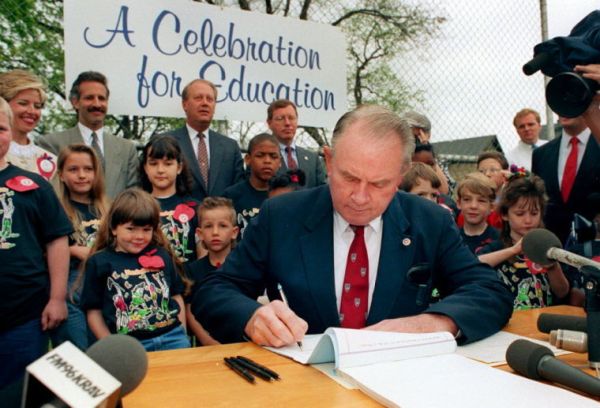
Governor Bellmon signing HB 1017 into law in 1990
My son, Rick Cobb, was a student at OU, and he was paying attention. He was working on his degree in English, writing columns for the OU Daily, and supporting my efforts to be a part of the change that Oklahoma desperately needed. He also interned the summer after his junior year for Senator Boren.

This 1991 photo hasn’t aged well.
Are you beginning to see why I am feeling nostalgic? As I watch President Boren prepare to depart my beloved university, I am looking for the next phase of progress for Oklahoma. The legislature has finally broken the 75% threshold that can produce new revenue streams for our core services. It took decades for this progress to be achieved. Sadly, it only took a little over one hour to reduce this same progress the next day.
I believe that most of us are looking for assurance that more commitment is coming from the legislature and governor next week. Most of us know that not every piece of the puzzle will emerge, but more needs to happen. Trust is an essential part of the solution! We need to know that solutions will not be taken away in the blink of an eye. Any funding removed needs to be replaced in an equitable way.
I have been so impressed with some members in both parties for their efforts to find compromise and equity in searching for revenue streams. It is no easy task, but it has to happen. As someone who has always felt the responsibility to do my part, I want to say, “good luck” to one and all. Good luck, Governor Fallin, members of the legislature, and citizens of Oklahoma, as you deliberate the fate of our state. Our children need us to be wise and brave. Our children need a bright future.
And thank you, Governor/Senator/President Boren for your service to our state and country. You have lived your life in service to others. We must all endeavor to do the same.
Countdown: One Day
This week, the Legislature passed a series of bills that raised taxes, increased the state education budget by 19 percent, and modified the state salary schedule to provide significant raises for teachers. They also passed legislation to mandate raises for support staff and restore some of our operational costs. Finally, Thursday, they amended the original package to remove one of the sources of revenue: A hotel/motel tax. The governor then signed most of these bills.
Between the passage of the education package in the senate Wednesday night and the repeal of the hotel/motel tax Thursday afternoon, I had already polled my district. Including teachers, support staff, and administrators, the survey had 969 responses. Of those, 93% still wanted to walkout on Monday, with 83% wanting to stay out multiple days. As a superintendent, I appreciate the clarity. Making the decision to be out of school Monday was easy. I can’t imagine what might happen Monday at the Capitol that would make the 83% change their minds, but I’m a real never say never kind of guy.

This walkout, if you ask many teachers, is long overdue. Ten years of budget cuts, unfunded mandates, and stagnant salaries have taken a toll on the profession. I don’t think anybody expected the Legislature to fix a decade of neglect in one sweeping motion. Faith isn’t restored that easily.
I happen to think they made good progress. They passed a tax increase for the first time in 28 years and raised salaries significantly. Still, there are good reasons for thinking this isn’t enough.
- While an average increase of about $6,100 in salaries will improve Oklahoma’s place in regional and national rankings, we also know that those are moving targets. Other states don’t wait ten years to raise salaries.
- In 1992, Oklahomans passed State Question 640, which requires that the Legislature reach a 75% majority in each chamber in order to pass a tax increase. A tax cut, on the other hand, only takes 50%. We saw this dynamic play out perfectly in about 24 hours this week. This is no way to fund core state services.
- I saw reports last week that the Democrats think funding for this package is about $150 million short and that Republicans think (after repealing the hotel/motel tax) that it’s about $20 million short. It’s very possible that one group is overstating the gap and that another group is understating the gap. It’s politics. And it’s the dynamic that concerns me more than the gap itself. The Legislature builds a budget based on estimates. They could estimate high on one revenue stream and then low on another. The immediate gamesmanship that followed a brief period of bipartisanship is a threat to any future progress.
- Support employees received raises as well, but far less than what they deserve. These are the lowest-paid employees in our schools. They feed our kids, drive our buses, run our offices, and repair our buildings. When we can’t find enough teachers, they help us manage large classes. The Legislature really needs to revisit this piece of the puzzle.
- Retired teachers deserve cost-of-living adjustments (COLAs). My mom, who was a special education teacher for 29 years, retired in 2001 and hasn’t had a COLA in a decade either. Meanwhile, her HealthChoice premiums continue to increase. She sees less of her retirement every year. (FYI – I’ll run a guest blog from her in the morning.)
- This week’s budget restored $50 million (outside of the raises) to the overall funding of public schools. While that’s a start in the right direction, let me explain why that doesn’t go very far.
- Of the $50 million, textbooks get $33 million. To put this number in context, that was the amount allocated to textbooks in 2008, the year I became Director of Curriculum in Moore. Since then, school enrollment has increased by 60,000, and the cost of textbooks has significantly increased.
- That leaves about $17 million restored to the formula to put back into classrooms. By our estimates in Mid-Del, our portion of this amount would be enough to bring back about seven of the 60+ teaching positions (100 positions overall) that we cut two years ago. It helps. It really does – but not enough to make significant dents in class sizes throughout our district or the state.
- Future Legislatures could roll back some or all of this progress. They could also add to it. We have no way of knowing, but that’s how government works. I would say that overall, the 56th Oklahoma Legislature has been the most education-friendly body of lawmakers we’ve had in a decade. The group that took office in 2017 included the biggest group of new members since the state adopted term limits. The best way to ensure that the momentum continues – once the walkout ends – is to vote for candidates who will continue chipping away at policies that threaten the stability of our state’s budget.
By the way, when you go to the Capitol tomorrow, you should understand that #oklaed has allies in both parties. Look for the ones who consistently engage with educators, even especially when avoiding them would be easier.
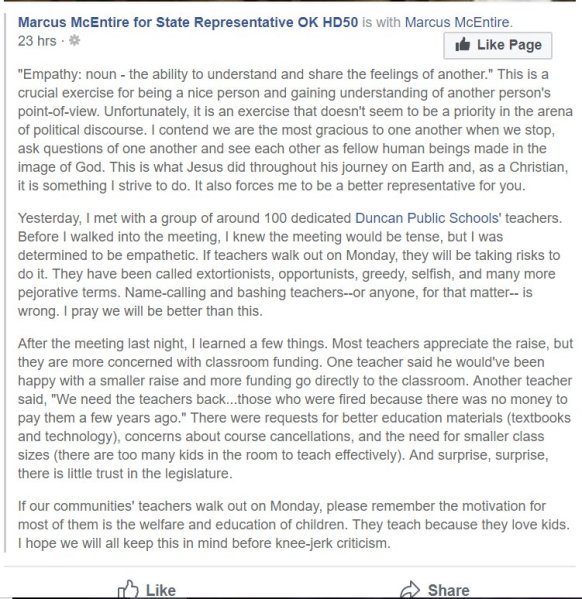
That’s Marcus McEntire from Duncan – one of the freshman legislators who takes the time to listen to his constituents. At this historic moment, we have a chance to help our legislators understand that we’re not just talking about teacher raises.
One thing I plan to do this week is to ask the House members I know to hear SB 1086, which passed in the Senate on March 15th with a 30-9 vote (with nine senators not voting). According to the fiscal impact statement provided by the Oklahoma Tax Commission, this measure could provide an additional $120 million in revenue as early as the 2020 fiscal year. They did not estimate how it would impact the budget they’re planning right now, but there’s nothing wrong with planning ahead. Cynthia Rogers, an economics professor at the University of Oklahoma, wrote this for the Oklahoman:
The capital gains tax deduction primarily serves as a tax loophole for the wealthiest individuals in the state. Based on Oklahoma Tax Commission data, 17,274 taxpayers claimed the deduction in 2014. Of these, 824 had a federal adjusted gross income of $1 million or more. This group claimed 64 percent of the total capital gains tax deduction. Individuals with a federal adjusted income of $50,000 or less claimed only 2.4 percent of the total deduction.
As a member of the Incentive Evaluation Commission, I voted to eliminate the capital gains tax deduction. We simply have no evidence that the program provides a positive net benefit to the state. Only 10 other states treat capital gains tax deduction is a similar manner as Oklahoma does. Of these, only five allow real property to qualify for the deduction. PFM could find no examples of state-level evaluations of capital gains tax deductions.
I’m thankful for the progress we’ve seen this session. I hope it continues. We should never be satisfied that we’ve done enough to help school districts recruit and retain teachers or to fully fund what happens in the classroom.
Don’t just go to the Capitol tomorrow. Go inside. Find your representative and senator. Make a new friend.
See you there.
Countdown: 8 Days
Due to their nearly hopeless situation, and in part because they are trapped in the Dust Bowl, the Joads set out for California. Along with thousands of other “Okies”, they seek jobs, land, dignity, and a future.
-John Steinbeck, The Grapes of Wrath (1939)
https://twitter.com/Zac_Fowler/status/977283275646554115
Tomorrow, all across Oklahoma, we will have school. Buses will drive through neighborhoods and collect children. Cafeterias will prepare and serve breakfasts and lunches. Teachers will teach. Nurses will treat scrapes. Secretaries will answer parents’ questions.
Hopefully, a week from tomorrow, the same thing will happen.
I copied the tweet at the top of this post because I like literature. For that matter, I also like history. Oh, and I like patterns. Events that repeat themselves, even in unfamiliar iterations, string together all of human existence.
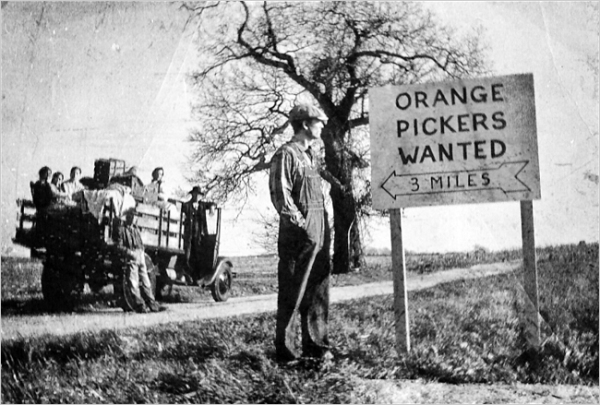
It’s pretty easy to see why the quote works as a proxy for the current condition of public schools in Oklahoma. Many of the young people we educate in our public schools and train to become teachers in our universities know that leaving the state to start a teaching career makes much more sense than staying here. Over 35 years, if teachers in Texas make $20,000 more than teachers in Oklahoma…well, do the math.
When I started writing this, I googled the quote at the top for accuracy. Once I verified it, the first article in my search caught my attention. It was a 1990 New York Times piece titled, “Why Steinbeck’s Okies Speak to Us Today.” I clicked on it, expecting to find an article about the last mass teacher walkout, which was also in 1990.

Instead, the article is a riveting analysis of the novel. Here’s an excerpt:
The true lesson of the times, he now suggested, was the importance of community – not community defined in traditional, geographical terms; not the community of a neighborhood, or a town, or a region; but a community of the human spirit, for which the only real model was the family.
Obviously, this post – just like every conversation I’ve had with anyone over the last couple of weeks – is about the threat promise of teachers walking off the job April 2nd if the Legislature doesn’t find a way to fund raises for teachers and support staff, along with operational costs. It’s a simple request with a nine-digit price tag – a HIGH nine-digit price tag.
The need requires little explanation at this point. Just in case you need a refresher, though, watch this Moore High School student tell us what we need to hear:
I’m losing count of the articulate, passionate Facebook posts I’ve seen from teachers about this current situation – not to mention posts from politicians expressing frustration over the lack of movement in the Legislature.
I’ve seen several plans, but no bills. We’ll know something is happening when we see bills. After the failure of two separate revenue plans in the two extraordinary sessions the governor has called, I don’t think we’ll see a bill until the House leadership thinks they have the votes to pass it.
From what I’ve been told, the Legislature has three days to avoid the teacher walkout. Someone needs to author a bill. It needs to pass the House and then the Senate. That’s the short version; everything our government does is always a little more complicated than that.
With that, I’ll close with another quote from the book:
And the little screaming fact that sounds through all history: repression works only to strengthen and knit the repressed.
We’re a week away, stronger, resolved, and hopefully relentless.
Countdown: 14 Days
After a months-long blogging hiatus, I wrote a little piece last night about the looming work-stoppage. I gave it a simplistic title, Countdown: 15 Days. The nomenclature is catchy, I see.
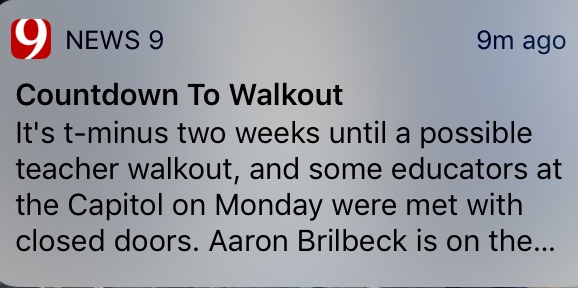
Please understand, friends, that this doesn’t mean I’ll be writing a daily post until this is over.
Tonight, I don’t want to focus on the money. That’s important, but it’s only a part of the conversation. I want to go back about exactly six years.
The State Board of Education was to hold an open meeting to hear public comments on the proposed rules for the first round of A-F Report Cards. The date was Monday, March 19, 2012.
I wasn’t there, but then again, neither was the State Board of Education. Counsel for the State Board of Education was there in their place. Fortunately, Claudia Swisher wrote about the day in one of her first blog posts:
The Board Room was packed. Lisa Enders, the General Council, chaired the meeting. No Board members were present, but Enders assured us the Board will get the video and all the written responses before their next meeting…NEXT week.
This was typical of how educators were treated during the administration of the previous state superintendent. Somebody would make a perfunctory effort to gather input from stakeholders, even some actual educators. Then, from what I have gathered, that input was shoved into a file cabinet, lit aflame, and hurtled from the top of Mt. Scott.
This isn’t smart people. We’re pretty much in a perpetual burn ban. It would be better to hide those good ideas and meaningful concerns in a warehouse, ala Raiders of the Lost Ark.

Claudia went on to note concerns expressed by legislators, community leaders, educators, and parents. While all of those concerns were ignored, this moment was the impetus for several years of effective – if often disorganized – activism in the #oklaed community.
Inspired by Claudia’s writing, I started blogging. So did Rob Miller, and countless other pro-public education advocates. Over the next few years, we had moments. We had victories. Some were in the legislative process. Some were at the ballot box.
Policy-wise, we still have to deal with some reforms that don’t make sense to educators and that keep us from truly focusing on children. I shudder to think of all the state testing pep rallies that will have to be rescheduled because of the work-stoppage.
Still, other than with funding, we’re in a better place than we were in 2012. I’ll point to two specific moments that mattered. For both, I’ll point to blog posts I wrote in 2014 and then explain how they’re relevant now.
In May 2014, the biggest battle we were facing was to let parents have a say in whether or not their third graders would be retained because of one test on a single day. The Oklahoman and the Tulsa World chimed in on it frequently. Here’s what happened:
The House and Senate overwhelmingly passed HB 2625, adding parents to the retention/promotion committees. Fallin vetoed it. The House and Senate took about three seconds to override her veto. They didn’t even debate it.
This afternoon, both chambers of the Oklahoma Legislature voted to override Governor Fallin’s veto of HB 2625, which amends the Reading Sufficiency Act. The vote in the House was 79-17. In the Senate it was 45-2.
Many parents and educators lobbied for today’s action, even after Fallin waited until nearly midnight to officially notify the House of the veto she had announced hours earlier at a press conference. In the end, only a few changed their votes. Before the veto, the combined tally had been 132-7 in favor of the bill. Today, it was 124-19. Maybe the governor, the state superintendent, and their friends at the Oklahoman and OCPA can take solace in the fact that they nearly tripled their vote count from before.
The state superintendent also called the veto override “a pathetic and outrageous step back.” We’ll get to her in a minute.
Passing this bill took courage from quite a few legislators – none more than Rep. Katie Henke. It also took relentless contact from educators and parents who wanted to see the bill passed. This was the first time (in my career) that we have seen the impact we can have when the pro-public education voices of Oklahoma unite.
A month later, we sweetened the pot, when voters relegated the state superintendent to a third-place finish in her own primary. Here’s my closing thought from the night that happened.
It started when we just couldn’t contain ourselves. Our murmurs grew into an eruption. We would not be silenced. We demanded respect.
I would say that was the highlight, so far, of how we can use our collective voices to change the narrative. Sure, there were some legislative seats flipped in 2016, but nothing that has come close to these two moments.
My question to you is what are you willing to do to make sure we’re not ignored this time? Are you willing to call, email, and text your legislators? Are you willing to point out that a plan to plan really isn’t a plan? Are you willing to storm the Capitol, relentlessly, from April 2 onward, and indefinitely?
There are some in the Legislature, as well as many in the cheap seats who doubt your resolve. Policies come and go. We don’t have to fight corporate interests to lobby for sensible change in that arena. Money is a different beast altogether.
As far as I can tell, two things are still true:
- Oklahoma’s educators will do anything for their students.
- We can all band together when we need to.
I hope I’m right.
Countdown: 15 Days
Brace yourselves, friends. I think we’re in for a rough one.
In 15 days, we may witness history if teachers across the state walk off the job in protest of years of ineptitude at the Oklahoma Capitol. I know no one who wants this to happen. I’ve been in meeting after meeting with leaders in my district and meeting after meeting with leaders from across the state trying to figure out all of our contingency plans.
What about feeding kids?
What about support employees?
What about the testing window?
What about activities and student trips?
What if it lasts 5 days? 10? 20? More?
What about graduation?
Can we still have prom?
That’s a sample of the issues that we have to consider. Just the same, our board – along with many, many other school boards – has passed a resolution supporting teachers. This is their movement. While many of my superintendent friends wanted a different deadline for the looming walkout, nearly all I know were in agreement that we needed to fall in line behind what our teachers demanded.
Explaining how we got here is pretty simple. The last time the Legislature funded teacher raises was in 2008. Per-pupil funding from that time is significantly higher than it is now. Teacher and support salaries are stagnant. Class sizes are high. Textbooks are in terrible shape.

Courtesy: @bosticteacher
To their credit, every legislator I know understands that all of these problems are real. Most have voted in favor of one or more proposals to help. Also to be fair, many of those who have voted yes on recent revenue bills voted in favor of last year’s budget that the State Supreme Court unanimously voted to be unconstitutional. And many of the same recent education funding supporters opposed SQ 779 in 2016.
My point is that nobody passes a purity test when it comes to the quest to properly fund public education. Some of the people who voted YES on the step up plan have consistently voted for vouchers and tried to get school consolidation bills heard in the House and Senate. If you pay attention long enough, everyone will make you mad eventually.
Nor is the push for a walkout simply about pay. Over the last several weeks, I’ve heard many legislators and candidates for public office say that they’d like to see additional funding tied to reforms. Unfortunately, I haven’t been able to pin any of them down on what reforms they’d like to see. I did see one survey on Facebook, sent out by a group I’d rather not name.
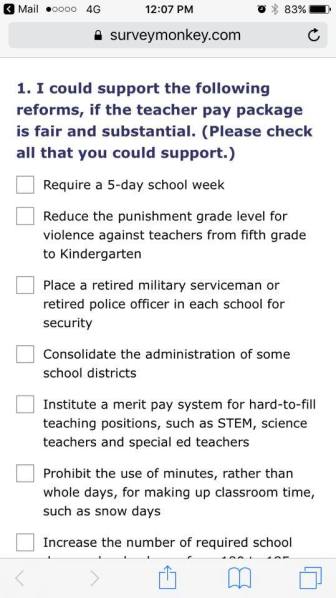
Nearly every item on the survey was an insult to the professional educators I know across the state. All make nice distractions and ignore the fact that public education faced a mélange of reforms earlier this decade. A-F Report Cards. Retaining 3rd Graders. Adopting and then eliminating Common Core. Adopting new standards – again.
Going back to 2001 at the federal level, we’ve had No Child Left Behind, Achieving Classroom Excellence, tightly-constructed waivers for NCLB, and the Every Student Succeeds Act.
As education advocates, we’ve fought against full-on voucher programs and for allowing parents to participate on committees that decide whether 3rd graders are retained.
The first half of this decade taught us that the Legislature includes people who will never trust educators, people who give us the credit we deserve, and a group in the middle that could lean either way. All three of these groups will always be in the Capitol. The width of each band varies after each election cycle.
During the 2011 and 2012 legislative sessions, public education was probably more on the defensive than at any point in the previous 20 years. Since then, more education-friendly legislators have been elected. I try not to give a legislator too much credit for one “good vote.” Or two or three. The opposite is also true. Some of the lawmakers I consider to be strong public school advocates make me want to bang my head against a desk sometimes.
Over the next few weeks, as we’re all closely watching what happens at the Capitol, I’ll dust off this blog and add a few thoughts, highlight some relevant data points, and generally try to make sense of the evolving political landscape. As always, when I’m writing here, I speak for myself. I may use an experience from my district to illustrate a point, but any opinion expressed on this blog is mine, period.
Remember the Names (part 2)
One thing educators just love hearing is that our schools should be run more like businesses. It’s a great politician line: If schools were run more like businesses…
…we’d be able to pay all the teachers $100,000 a year. Of course, there’d only be about five teachers for every 500 students, but still…
I hate the mindset of treating either the students or the content we teach as a commodity. Our district finance offices should be run more like businesses. We have millions of dollars come in and go out every year – mostly into payroll. We want to save money and run as efficiently as possible, but not at the expense of educating children.
I do wonder, however, about one thing that would be different if we operated more like the business world. Maybe we’d be able to wine and dine our legislators and get our way. We’d be able to post record profits and still complain to lawmakers that they’re trying to bankrupt us. As it is, we can show up with a crowd of 25,000 people who support public education and have no impact.

All together now!
Oil and Gas producers can show up with a few charter buses and campaign-quality signs and kill legislation. I definitely wish in that sense, that we were more like big business. Clout has its privileges.
On the other hand, nobody ever tells schools, you should operate more like the legislature. Imagine what that would look like.
I’m going to leave the Senate alone for now. They seem to be functioning on a higher level than the House during this quite Extraordinary Legislative Session.
But that House…bless them. Bless them all.
Each of the past two Wednesdays, the House has voted on a bill to finish the job of implementing a budget that should have been finalized in May. Last week, they killed HB 1054, which would have raised taxes on cigarettes, gasoline, watered-down beer, and gross production. It would have raised salaries for teachers and state employees. It had the 75% of votes needed in the Senate, but it died in the House by a vote of 71-27.
This week, however, the House approved a budget that uses some one-time money to limit cuts. This plan, HB 1019, passed with a vote of 65-25. Critical agencies will still face cuts. Higher education loses over $17 million. Health care loses $15 million, DHS $4 million, and Mental Health another $4 million.
Simply put, this budget will cost people more than their livelihoods. It will cost some their lives.
HB 1054 wasn’t perfect. It had elements that everybody found distasteful. It’s what was needed, though. Since we live in a state in which 65 passes but 71 fails, this is what we get.
If you want to read more about yesterday’s discussion in the House, check out Claudia Swisher’s blog. All I’m going to do is give you a list showing how House members voted on each bill (and a brief thought about each group). You can determine for yourself how to characterize these representatives.
You can call it a Special Session Scorecard, or maybe a twisted version of the Meyers-Briggs personality test. Perhaps it’s a Rorschach test for who funds the campaigns of each group.
Yes on both
Babinec, Baker, Caldwell, Casey, Cockroft, Echols, Fetgatter, Ford, Frix, Hall, Hilbert, Jordan, Kannady, Kerbs, Lawson, Lepak, Martinez, McCall, McDaniel, McDugle, McEntire, Montgomery, Mulready, Murdock, Newton, Ortega, Osborn, Osburn, Ownbey, Park, Pfeiffer, D. Roberts, Russ, Sanders, Sears, Taylor, Vaughan, Wallace, Watson, J. West, T. West, Wright
Total: 42 Republicans, 0 Democrats
To me, this group of people looked at HB 1054 as a massive compromise and the best we could do given the circumstances. This week, maybe they felt less hopeful and just had to vote for something to get finished. I would guess a lot of the names above have lost confidence in many of their colleagues.
No on both
Kouplen, Proctor, Stone, Williams, Murphey
Total: 1 Republican, 4 Democrats
If you’re neither looking for solutions nor draconian cuts, I honestly don’t know how to read you.
Yes on 1054, no on 1019
F. Bennett, Blancett, Cannaday, Condit, Dollens, Dunnington, Fourkiller, Gaddis, Griffith, Hoskin, Loring, Meredith, Munson, Perryman, Renegar, Rosecrants, Tadlock, Virgin, Walke, Young, Humphrey, Thomsen
Total: 2 Republicans, 20 Democrats
Everybody who voted yes on HB 1054 sacrificed ideological purity to do so. This group didn’t feel like unclicking that button, I suppose.
No on 1054, yes on 1019
Calvey, Cleveland, Coody, Derby, Downing, Dunlap, Enns, Faught, Gann, Hardin, McBride, McEachin, Moore, O’Donnell, Ritze, S. Roberts, Strohm, Teague, K. West, R. West
Total: 20 Republicans, 0 Democrats
Well, people may die, but at least everybody’s third-quarter profits are safe.
Others
J. Bennett – missed vote on HB 1054, Yes on HB 1019
Inman, Rogers – No on HB 1054, missed vote on HB 1019
Goodwin, Lowe, Nichols, Bush, Henke, Nollan, Worthen – Yes on HB 1054, missed vote on HB 1019
***Important Note*** I’ve checked and double-checked these votes. If you find any inaccuracies, please let me know.
Vote on HB 1054
Vote on HB 1019
Remember the Names
The best lack all conviction, while the worst are full of passionate intensity.
-William Butler Yeats
This week while working, many Oklahomans found distraction watching a reckless, dangerous ordeal. It was a long and twisting journey, full of surprises. You could even call it the epitome of self-sabotage. Eventually, though it had a very predictable outcome: the Legislature once again failed to meet the needs of Oklahomans.
Oh, did you think I was talking about yesterday’s high speed chase in the OKC metro? I missed that. Too many meetings.
That was one guy making a series of bad decisions that ended with him being tazed and captured. Everyone watching knew that would happen. They just didn’t know what would happen first.
The story of this mess of a state started long ago. I could begin with 1992’s State Question 640, which severely limited the ability of the Legislature in a budget crisis such as this. Or maybe with Governor Fallin’s election in 2010. Or her re-election in 2014. For the sake of time, though, I’ll begin with the budget passed by the Legislature and approved in May.
A key piece of filling this year’s budget including passing a cigarette tax fee. Well, the Legislature called it a fee, but it was pretty obvious to anyone paying attention that it was a tax.
Predictably, on August 10th, the Oklahoma Supreme Court ruled as such. As the Oklahoman wrote at that time:
In an opinion that drew support from every justice, the court noted that the Legislature introduced four bills this year that would have created a similar cigarette “tax,” but the bills were abandoned because of little support. In the final week of session, lawmakers finally adopted the “smoking cessation fee.”
It was unanimous.
This created a huge budget hole and the need for a special session*. For weeks, we’ve seen half-measures and insults called compromises. Finally this week, the dam broke and something appeared to happen.
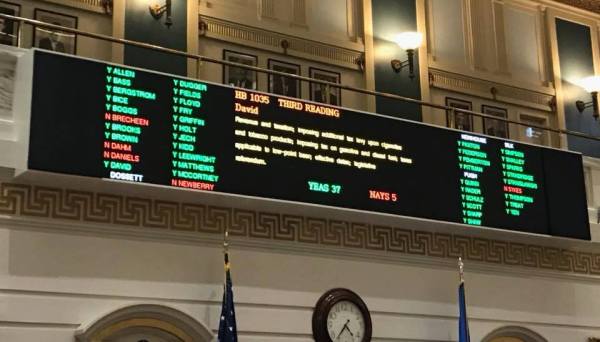
The Senate voted on a bill – amended to include an increase to the Gross Production Tax – that had support of a majority of House members, just not the 75% required by the Oklahoma Constitution. It received support of all Democrats and all but five Republicans: Brecheen, Dahm, Daniels, Newberry, and Sikes. No surprises there. Any of those five making a conscious choice to help others would have been shocking.
Senate leader Mike Shultz said that this was a long-time coming.
https://twitter.com/CathJSweeney/status/927664811663650823
This has been a source of frustration for years. On the other hand, Shultz favored every tax cut that has contributed to the recurring budget shortfalls that have led to our legislative leaders – metaphorically, of course – spinning their wheels in the middle of a field somewhere.
Since this technically wasn’t the bill the House sent to the Senate, it had to be renamed and sent to the House Budget Committee. There we saw a preview of what was coming Wednesday.

Now called HB 1054, the budget plan passed 19-6 out of the Joint Committee on Appropriations and Budget Committee**. Calvey and Murphy voting no was as predictable as was the Oklahoma Supreme Court seeing through the tax/fee façade. Kouplen and Proctor, not as much.
Side note: Since the start of the extraordinary session, two legislators have announced they are leaving the House. Minority Leader Scott Inman is one. Apparently, Steve Kouplen is the new pick to lead the Democrats. Based on this week, maybe they should open the process and choose someone new.
This led to Wednesday, when the House spent two hours taking questions and another hour debating HB 1054.
I tried watching the live stream, when I could. I debated with other superintendents what the final vote would be. Few of us expected it to pass. In fact, most of us thought the final number of yes votes would be even lower than 71.
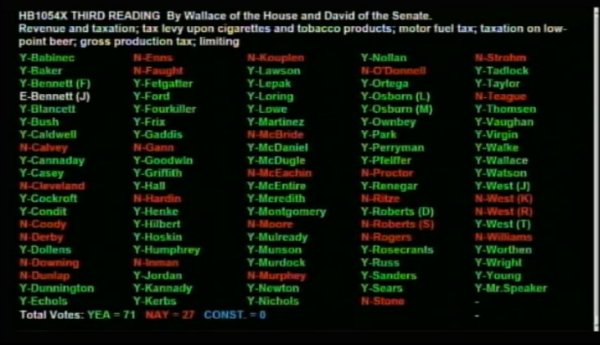
I follow several journalists during the high holy extraordinary sessions. Catherine Sweeney, Dale Denwalt, and Tres Savage are some of the best. I went through their Twitter feeds today to try to recapture what happened Wednesday. Here are some examples of their work:
https://twitter.com/CathJSweeney/status/928346490912886786
https://twitter.com/CathJSweeney/status/928354781462171648
Ok, aside from Calvey’s dizzying logic, he makes the point that we should audit everything and find waste, fraud, and abuse. On the other hand, this is Calvey’s sixth term in the Legislature. Before he represented Deer Creek, he represented Del City. He’s one of the state’s longest-tenured lawmakers. Why hasn’t he called for these audits before? Other than casting aspersions on public employees, what has he done?
These make me sad. I don’t understand people who say they support teachers and raises for teachers and then vote no when they have a chance to do something.
Let’s face facts: the 2017 legislative session is now six months into overtime. There has been no leadership and nothing resembling a plan. It shows. Holding the vote open for another hour trying to find more votes didn’t help either.
https://twitter.com/CathJSweeney/status/928355867153633281
Honestly, listening to Perryman discuss the budget bill, I thought he’d vote against it. I’ve admired him for years. He’s a true populist and a great public servant. I was having a hard time reconciling all of that.
He voted yes.
This was also a clear breaking point for some. They’d raise taxes on consumers, but not producers. It was the hardest thing for me to swallow.
If you look at the names on those vote boards – the greens in particular – you see a lot of people who expended political capital by voting yes. They are Republicans who voted for tax increases on oil and gas companies. They are Democrats who voted for regressive taxes that disproportionately impact the poor. They are people who realized that ideological purity is no substitute for leadership. You can’t govern if you expect to get your way all the time.
https://twitter.com/CathJSweeney/status/928371210903310338
Speaking of Roger Ford (R – Midwest City), he’s been blowing up the Facebook world lately. He’s called out House leadership and been more or less live journaling his frustration. Here’s a sample:
To all the people saying don’t give another dime to our agencies, until after they get audited. Well bless your heart! Audits don’t happen overnight. So I guess we shut Oklahoma down for a couple years while we wait. Audits are not in the scope of this special session, so once again it’s not happening! Why can people not get that? What is so hard to understand about that?
I watched a couple no vote legislators smiling and laughing as they exited, walking right past the disabled adults in the rotunda. Never stopping to see their faces. Your life goes on, but what about them?! You changed their world and don’t give a damn.
But in fairness at least they had the decency to walk past them after they voted no. Unlike the coward that snuck in the back door, gave another representative a thumbs down motion to vote for him and immediately walked out the back door. To that young man, everything I learned about you this past year has turned out to be true. You took great joy at throwing stones at others, while you yourself was living in a glass house. To say I’m disappointed is an understatement.
To the ones that held out for a higher GPT, good luck! Any GPT increase drove off with the chartered buses that were parked in front of the Capitol all day. You get 2%, you get 2% and you get 2%. Yay everyone gets 2%! If we can’t get 7, let’s take home nothing! Brilliant idea!!!
Oh yeah, that’s right. There were charter buses there. Here’s a pic.

Enough people – in both parties – held to their principles. As a result, people will suffer.
It’s worth noting that this vote came exactly a year after the vote on State Question 779, which would have given teachers a $5,000 raise. This teacher raise would have been just $3,000, but still, teachers had hope.
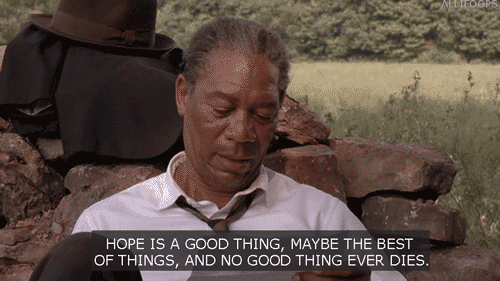
With all due respect to the Shawshank Redemption, hope is painful. Hope is thinking that when the stolen truck you’re driving breaks free from the trailer behind you that you’ll be able to elude the police cars and helicopters that surround you. I woke up believing that it might pass. After all, it passed the Senate handily. We all want the same things, right?
Unfortunately, with all the posturing, grandstanding, guest appearances, and unmoored contempt in the House, again, we watched as nothing happened.
https://twitter.com/CathJSweeney/status/928376318085029888
I can’t explain the people who sided with Cleveland and Calvey. One walked around the Capitol with a fart machine. The other once threatened self-immolation. I’ll let you google which is which.
I can explain what happens now.
See what you’ve done? I agree with the governor.
You can read the impact of our state’s legislative impotence from an adoptive parent:
Nine years ago, I stepped up and took a large financial burden off the state by adopting three older, traumatized children. In turn, the State agreed to provide certain resources that were minimal to begin with and have eroded over time. More cuts will come down the road if we don’t fix our systemic budget issues very soon. It looks as though lawmakers will probably be able to stave off cataclysmic cuts for now. But short-term measures like raiding the Rainy Day fund instead of making courageous decisions are what got us into this situation in the first place. Unless lawmakers sustainably raise revenues – as voters overwhelmingly want – these near-calamities will continue, and families like mine will bear the cost.
A mother of a disabled teen tried to get answers from legislators:
“We’re concerned, we’re worried,” Jones said as she met with Rep. Shane Stone, D-Oklahoma City. “My son is the client of the Goodwill adult day center in Chickasha, and our understanding is that without a fix on this current budget crisis is that it will close. They will not be able to keep their doors open and there’s nothing else for my kiddo.”As she walked the hallways late Thursday afternoon, she hoped the legislators she talked with would understand and maybe change their “no” to a “yes.”
I have to say that one representative in particular caught my attention for her remarks on Wednesday.
It’s important to remember that over the summer, House Speaker Charles McCall stripped Leslie Osborn of her JCAB chairmanship because she spoke her mind:
Osborn’s removal comes one day after she and two other Republican state representatives criticized house leadership for comments made after the Oklahoma Department of Human services announced last week it was cutting $30 million in services because of a lack of funding from the state.
The men who opposed McCall, by the way, were stripped of nothing.
This all makes me wonder why the Democrats and Republicans in the Legislature don’t change leadership and find someone committed to helping the state. Nobody is entitled to those positions for the duration of their legislative service.
Osburn is right about one thing in particular. We really must remember who voted yes and who voted no on this. I’ve seen written explanations from members of both parties. I accept none of them.
Our system of government requires serious people who know what it means to lead. It requires voters who hold them accountable.
*Technically, it’s called an Extraordinary Session. Indeed it is that.
**Speaking of government inefficiency, I love this committee name.
Join tonight’s #oklaed chat: Stereotypes in Schools
I’ve taken a little break from blogging (and from #oklaed chats) this summer. I’ll be tuning in tonight, however, as students from Del City High School take over the chat.
Nothing brings me more joy as a superintendent than watching our students lead. I’m constantly amazed at what Mid-Del students accomplish academically and through their extracurricular programs. Student leadership, though, is certainly one of our greatest strengths.
I found out via Twitter that they had volunteered to moderate tonight’s chat. I had nothing to do with the questions, and I won’t be over their shoulder as they lead and discuss. This is all their deal.
When we listen to students, we are at our best. I hope you will join tonight an let them lead us. This conversation is more important than pre-season professional football or Game of Thrones. Remember, you can record TV. It’s a thing.
See you at 8 tonight!
Class of 2017: When you see a chance…
Taking a break from politics and budgets with my message to our three senior classes graduating today:

Teachers, principals, family, and friends, it’s good to see all of you. Without your support it’s hard to imagine all of these graduates being here today with all they’ve accomplished.
This graduating class will cross the country to go to college. It will cross the world as members of the military. It will impact the future of our community too.
Today, graduates, we celebrate your accomplishments. We stop to remember your first days of school, your awkward phase, the moments when you were figuring out what you want to do with your life, the times you’ve changed your mind about what you want to do with your life, all the friends you’ve made, and even a few heartbreaks along the way.

Over the last thirteen years, you’ve had some amazing experiences that you will always remember. You’ve had some you’d rather forget too, I’m sure. Let’s not focus on that. The accumulation of these moments brings you here today, to a ceremony we call Commencement.
Commencement means beginning, and that’s what this is. As trite as it is to say, this is the beginning of the rest of your life. And I hope it’s a long and successful life, filled with excellence. You’ll have ups and downs; we all do. You – and only you – get to choose which experiences and which qualities define you.
The poet, William Blake, wrote, “He who desires but acts not, breeds pestilence.”
What does this mean?
Well, “pestilence” is a pretty tough word to unwrap. At its most literal level, it means an epidemic or widely-spreading disease. It can also be used to describe something morally corrupting. That’s what he means here.

“He who desires…” We all have desires. We all have hopes and dreams. And while patience is certainly a virtue, you can’t wait forever for the things that you want. Sometimes in life, you have to press the start button yourself. Sometimes you have to pause and re-start. Nobody else is going to hit the button for you.
The price to pay for never acting on the things you want out of life can be heavy. You miss opportunities. You wonder what might have been. Regretting inaction can weigh on you just as heavily as regret for the things you actually have done.
Regret, by the way, is one of the prices we pay for living life. I can’t speak for anyone else, but I’d rather live with a mistake than spend a lifetime wishing.
Just remember that where you are today, and the opportunities you have in front of you right now are the end result of your own hard work and the support you’ve had around you. Make choices that mirror your passions.
If you haven’t figured out what your passions are, here’s a hint. They’re the things that make you hear a drumming noise inside your head – so loudly that you can’t ignore it. When you’re around certain people or doing the things you truly enjoy, that’s really just your heart pounding and trying to guide you. Listen to it once in a while. I know I’m supposed to tell you to think and plan – and you should – but leave room for what feeds your soul, too.
Cherish your family and friends. Seek mentors who seem happy and figure out what makes them tick. Be that mentor for others. Most of all, seize opportunities to be kind, especially when it brings you no recognition at all.
Ahead of you is your future. Nobody else gets to dictate it for you. Nobody else can navigate it for you. Own it.
Congratulations, and good luck, Class of ’17!
Xenophobia: Warrior Snowflake
I wrote last night that at the end of this legislative session, depending on the outcome of the budget, either everybody gets credit or everybody gets blame. I was wrong. Well, I was wrong-adjacent.
The first thing I read this morning was an idea by a group of 22 Oklahoma legislators calling themselves the Republican Platform Caucus. News 6 in Tulsa reported it first, but that’s not where I read it. It came from Peter Greene, who writes the blog Curmudgucation:
There’s a lot to unpack in the news from Oklahoma’s GOP legislators, but let’s just skip straight to the most awful. From this special caucus of conservatives, looking for ways to close a budget hole:
The caucus said there are 82,000 non-English speaking students in the state.
“Identify them and then turn them over to ICE to see if they truly are citizens, and do we really have to educate non-citizens?” [Rep. Mike] Ritze asked.
The caucus thinks that could save $60 million.What the hell? I mean, what the absolute you-have-got-to-be-freaking-kidding-me hell??!! Let’s profile possible undocumented immigrants based strictly on what their primary language is??!!
The rest of their proposal only seems less stupid because the target-non-English-speakers sets the stupid bar so very high. But there’s still a lot of stupid here.
I love it when national writers mock us – especially when we give them good reason!
It’s not just bloggers either. The Washington Post has even picked up the story.
The caucus, and speculation of its actual size, is the subject of much social media interest as well.
https://twitter.com/jackfowlerart/status/862644868333613057
No official list exists, but sources tell okeducationtruths off the record that…
Wait, I still have too much self respect to refer to my own blog in the third person. It’s ridiculous.
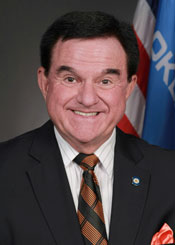 I have seen lists posted in three places, and they mostly match. I really want to post all their names and shame them, but I can’t guarantee that what I have seen is 100 percent accurate. I’ve even seen one legislator disavow membership.
I have seen lists posted in three places, and they mostly match. I really want to post all their names and shame them, but I can’t guarantee that what I have seen is 100 percent accurate. I’ve even seen one legislator disavow membership.
Maybe their caucus isn’t as big as they say.
I can say that none of the names I’ve seen surprise me. And if a decent budget deal comes to fruition, it will be in spite of time wasted on garbage such as this by people who seek to further divide us, especially when the guy leading the charge can’t even work four full days.
I think we are all used to one or two isolated legislators saying ridiculous things about different groups of people. This is altogether different. This is a new breakaway wing of the Republican party. They even have a list of guiding ideals:
To address this concern raised by so many voters, this caucus was formed with the following objectives:
- Honor God as we serve the people of Oklahoma;
- Represent the principles we were elected on, the Republican Platform;
- Educate members about how a bill relates to the platform;
- Provide a UNIFIED Republican voice;
- Hold each other accountable to the values supported by the majority of Oklahomans;
- Support policies reflected in the Republican Platform and oppose policies that are contrary to the platform.
“Some say the platform is too long, but really its’ depth is a reflection of decades of hard work by those at the grassroots level,” said Rep. Roberts, R-Hominy. “Truly, the values and policies in our platform represent what it means to be a Republican. Our goal is to represent the values on which we were elected.”
“When members discuss how policy or budgetary decisions relate to the platform, new members will have the opportunity to learn from more seasoned legislators,” said state Rep. George Faught, R-Muskogee. “It also helps us hold each other accountable, making us better representatives of the people we serve.”
I don’t know about you, but I can think of few things that honor God less than rounding up all students whose first language isn’t English and making them prove their innocence. Besides, as Ben Felder reports in the Oklahoman, it’s unconstitutional:
According to News 9, the caucus cited 82,000 non English speaking students as its motivation to identify non citizens.
The problem with that is being classified as an English language learner is not the same as being undocumented.
We don’t have firm numbers on how many undocumented students there are in the state as school’s don’t ask citizenship status. Oklahoma City Public Schools is over half Hispanic, but best estimates show less than one third are not U.S. citizens.
In fact, just 37 percent of Hispanic resident in Oklahoma County are not U.S. citizens.
But let’s assume there was an accurate count of undocumented students and it didn’t cost more to “identify them and turn them over to ICE” than it did to educate them, could the state Legislature do this?
The answer is no as it was ruled unconstitutional in 1982 in Plyler v. Doe. The U.S. Supreme Court ruled that states cannot deny an undocumented student from a free public education.
Of all the ideas and events that have embarrassed Oklahoma so far in 2017, this is perhaps the worst. If anything like this were to become law, it would lead to a culture of profiling and intimidation. Simply put, it’s un-American.
Most Oklahomans I know celebrate diversity in our schools. Having students from many different backgrounds makes our lives richer, not poorer.
I’m embarrassed that my friends across the country are seeing this story and letting it paint a picture of our entire state. If you agree, voice your shame to the members of this caucus.
It’s getting late. Do something.
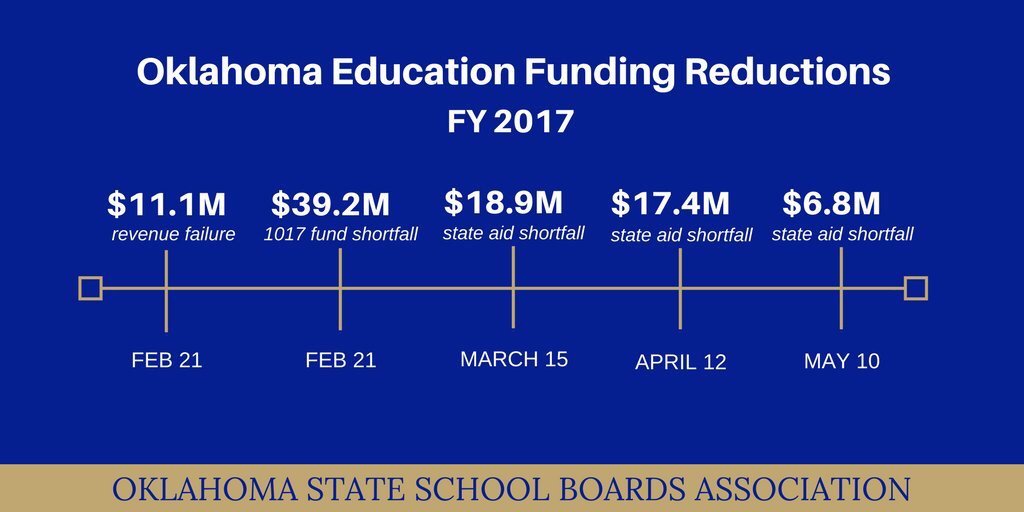
Used by permission from OSSBA
What you see above is real. In 77 days, public schools in Oklahoma have lost over $93 million in state funding. Oklahoma City Public Schools has lost the most, just over $5.3 million. Tulsa Public is next – just under $4.9 million.
In Mid-Del, we’re dealing with over $1.9 million in losses. As I’ve mentioned before, this is money that all districts planned on having based on the state budget passed by the Legislature (and signed by the governor) last May. Here’s the notice we received from the Oklahoma State Department of Education today:
Based on available funds, the State Aid formula payment for the month of May will be paid at the accumulative amount of 88.62 percent instead of the scheduled 91 percent of the current adjusted allocation. Revenue collections for the May State Aid payment are approximately $43.1 million short of the funds needed to make the scheduled 91 percent payment. The accumulative percentage of 88.62 percent includes the total amount short for this fiscal year updated for cash received through May. The cash flow shortage of $43.1 million for the May payment supersedes the $36.3 million for the March and April payments.
The May payment, available to districts on Thursday, May 11, is based on funds collected as of May 9, 2017. To calculate your payment, use the most current adjusted allocation times accumulated percentage minus paid to date to equal the amount of payment. The amount of funds collected as of May 9, 2017, is presented below.
-
Education Reform Revolving Fund (1017) Adjusted for Revenue Shortfall has collected 84.13 percent of the Adjusted Appropriated $657,802,801
-
Common Education Technology Fund has collected 85.50 percent of the Appropriated $41,168,478
-
FY17 Mineral Leasing Fund has collected 52.57 percent of the Appropriated $3,610,000
-
General Revenue Adjusted Revenue Failure has collected 90.91 percent of the Adjusted Appropriated $1,027,324,288.85
-
FY17 OK Lottery Fund has collected 92.96 percent of the Appropriated $23,397,757
More losses will come in June. Meanwhile, our Legislature continues looking for roughly $900 million to make up for a shortfall to next year’s budget.
To see what each district has lost to date, follow this link.
Several people around the state have asked me why they’re not hearing more from superintendents about what these cuts mean. Last year, after all, we went on and on and on.
I can’t answer for all superintendents. In my case, I’m too busy to spin my wheels. I need to focus on things I can impact. It’s not that the legislators who represent my district don’t hear us. Nothing could be farther from the truth. They’re involved and astute.
I’ve been fighting for five years. It’s exhausting. Our day jobs don’t slow down just because we’re trying to keep our legislators informed. They’re aware of the problem. Some are even working on Sundays (which is still allowed as long as the Ten Commandments statue isn’t at the Capitol, I guess) to try to fix it.
Maybe too many people insist on getting credit. Maybe we’re making a mountain out of a molehill. And maybe our executive branch is too busy making dumb decisions like insisting on a $2.4 million test that means nothing or throwing state money down the commode by moving offices around for no reason at all.
This isn’t the time for anyone to play hero. If you’re in the leadership in the Legislature, you were there when this problem was created. It also isn’t the time for blame. Not yet, anyway.

Fix it, and all legislators deserve praise. Fail to do anything meaningful, and none do. It’s all or nothing. I’m trying to make a budget for the upcoming school year using numbers I don’t have. I’m not really in the mood to pat anyone on the back and say thanks for trying. Reading the Tulsa World tonight, it seems I’m not alone:
Uncertainty about state appropriations, which has a host of area school districts delaying their annual budget process for the new fiscal year.
“We’re tired of chasing rumors and ghosts,” West said. “This is the dance we’ve been doing every year for three years, but this year, we’re in a wait-and-see pattern. We’re not going to hire anyone until June. What I’m worried about is somebody is going to take another job. We’re having to put them off.”
Sapulpa Public Schools is holding off on offering new contracts to its first- and second-year teachers who have been employed on a temporary basis and Owasso Public Schools leaders say they’re hoping that building up their savings will help see them through Fiscal Year 2018, but they can’t be sure.
Leaders of Union, Jenks and Broken Arrow public schools are also waiting to finalize budget plans for next year, and being cautious about communicating how programming would be affected by cuts, until they have more information from the state.
Because Collinsville is a growing district, with 165 new students the past two years and 100 more expected for 2017-18, West said he has the luxury of being able to commit to offering new employment contracts to all current teachers.
So we wait. And we’re not silent.
And I’m not alone.
https://twitter.com/mcvay51/status/862443562981625856
Craig, I’m too tired to sigh. Plus, there’s the $1.9 million. That has me pretty bummed out.
Our state leaders persist in working on our behalf, though.

Good thing they’re focused!
I can’t imagine what backlash legislators would face if they fail to do their job. It’s not just public schools. It’s all state agencies. It’s all core state services. This state has consciously chosen to re-elect people who willfully made us go broke. Elections have consequences. Hopefully, at some point, failing to lead will too.
Don’t know much about history?
Yesterday, Governor Mary Fallin vetoed SB 2, which would have eliminated the state test for high school US History. This test costs the state of Oklahoma $2.4 million. It means nothing to the students who take it. As with all high-stakes tests, it forces teachers to narrow instruction to what they think will be assessed. Below is her reasoning.
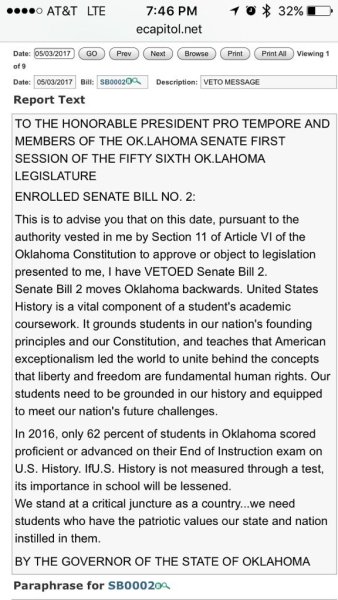
I want to break down her veto statement one sentence at a time.
Senate bill 2 moves Oklahoma backwards.
Let that sentence linger in the air a minute. During the 6+ years of Fallin’s leadership, can you think of anything else that has moved our state backwards? Could it be three consecutive years of budget collapses? Other than our roads, bridges, schools, colleges, health care, prisons, law enforcement, and state parks, we’re having a fantastic decade! The 2010s will go down in history…oh, wait, they won’t. And even if they do, we won’t be able to afford the history books.
History is a vital component of a student’s academic coursework. It grounds students in our nation’s founding principles and our Constitution…
I agree that history is vital. And with US history dating back to 1607, we can’t cover it all in one year. That’s why the state breaks down the standards into three grade spans:
- Grade 5 – Creating the United States: 1607-1806
- Grade 8 – Creating the United States: 1754-1877
- High School – 1877-Present
So the high school test covers the last 140 years. With all due respect, that doesn’t exactly include the nation’s founding.
…and teaches that American exceptionalism led the world to unite behind the concepts that liberty and freedom are fundamental human rights.
Not to be a noodge, but I don’t remember the world exactly uniting behind those principles. They’re great ideals. They’re core American values. And we’ve engaged in wars to end tyranny, which is a great thing.
This span of US History begins with Reconstruction, delves into immigration, westward expansion, and the industrial revolution before discussing WWI. It covers “social, cultural, and economic events between the World Wars,” such as the Great Depression. It moves through the Cold War all the way to our response to 9/11.
It’s more than our founding principles. It’s the narrative of how we got from that ontological perspective to where we are today. It includes our triumphs and our failings. It’s a mix of triumphs and human failings.
A test of facts, dates, and names doesn’t capture that.
In 2016, only 62 percent of students in Oklahoma scored proficient or advanced on their End of Instruction Exam on US History.
If you’ve read my blog for any time at all, you know I’m not really a fan of the single out-of-context statistic. Here are the state pass rates for the high school US History EOI since 2010, when Fallin was elected governor:
- 2010 75%
- 2011 80%
- 2012 77%
- 2013 80%
- 2014 86%
- 2015 79%
- 2016 62%
If testing is so important, then why did scores go down? Where was your leadership during this time, Governor Fallin?
Or maybe it’s not about leadership. It could be that a new test and a new cut score had something to do with the 62%. Still, I wouldn’t rule out her leadership. This is her circus, after all.
If US History is not measured through a test, its importance in school will be lessened.
That’s just a slap in the face. Apparently the governor thinks our history teachers are incapable of doing their jobs. Strangely, I don’t recall her praising them in 2014 when the proficient rate was much higher.
I’m reminded of the time in 2015 that our governor put her knowledge of our founding principles on display:
You know there are three branches of our government. You have the Supreme Court, you have the legislative branch and you have the people – the people and their ability to vote.
Yes, she really said that. She actually forgot the branch of government she leads.
If only there had been a test.
The good thing is that we can fix this. Our Legislature may be struggling to find agreement on a budget right now, but they were pretty solid when they sent this bill to Fallin. The House vote was 65-23 with 10 absences. The Senate vote was 31-10 with 7 absences.
Now is the time to act. The governor’s action was predictable, just as it was two years ago when she vetoed HB 2625, giving parents a voice on third grade retention. At that time, the House voted 79-17 and the Senate voted 45-2 to override her veto.
That was one of the most critical moments we’ve had in the last few years. It showed how strong public education advocates can be when we unite. The state superintendent at that time called it pathetic and outrageous, which was a pretty strong indication we were right.
Maybe that helps us understand this veto. Rep. Katie Henke, the author of HB 2625 two years ago, is the house author for SB 2. The senate author is JJ Dossett, a former teacher who has been very outspoken on education and budget issues this year. I wouldn’t sleep on the role that spite plays in decisions such as this.
We don’t need to waste money on a meaningless test. Another $2.4 million could save about 55 teaching positions. Not that I’m counting.
Besides, if we wanted something resembling authentic assessment, it would look so much different. We can’t afford to continue insulting our teachers. Please call your state senator and representative and ask them to vote to override the veto.
They left the Capitol before 11:00 am today, but their voicemail works. Fill it up.
https://twitter.com/CHSprincipal55/status/859943292422639617
A developing story for #oklaed
For those of you who don’t know her, Angela Little is a business professional, single parent, and fierce public education advocate.
For those of you who don’t know them, the Oklahoma Council of Public Affairs is a right-wing think tank, founded in 1993. The OCPA had $2.7 million in revenue and $1.9 million in expenses in 2015. They closed the fiscal year with about $5.8 million in assets, including one controversial monument.
That’s impressive for a non-profit!
The OCPA also operates several side projects, including their Center for Investigative Journalism. They call it a center, but it really just seems to be one guy – Jay Chilton. You remember him – the guy who feigns outrage when educators get salty with their frustration. What I enjoy most about his writing is when he refers to his blog in the third person. Sentences that start with CIJ asked… and CIJ contacted… pepper his posts.
Maybe I should start doing that…
Okeducationtruths has learned that in spite of the best efforts of many in the Legislature, nothing has changed.
No, I don’t really like that at all.
I also don’t like drive-by hacks taking cheap shots at friends of public education. That brings me to Friday, when okeducationtruths was shocked – SCHOCKED! – to learn that CIJ had written a post fixating on Angela Little.
The post starts as a follow-up on the relationship between American Fidelity (Little’s employer) and Superintendent Joy Hofmeister’s 2014 campaign. American Fidelity was a contributor to the campaign for which Hofmeister is under investigation.
That part seems like fair game. Hofmeister is a public official. She and others associated with her campaign face charges in Oklahoma County. That’s noteworthy.
About halfway through the post, though, it turned into an attack on Little.
While American Fidelity was identified in the indictment, neither the company nor any of its staff were charged with any crimes.
In May of 2016, American Fidelity appears to have adopted another unusual political strategy when it hired Angela Clark Little as part of the company’s “Strategic Quality Management” staff. Despite her listing as a full-time company employee, much of Little’s time is committed to advocating increased expenditures for public education, opposing school choice reforms, and campaigning for the election of candidates who support those positions.
Little’s lobbying efforts have been noted by many legislators and generally take place during regular working hours. If a business pays someone to lobby at the state Capitol, state law requires both the business and the individual to register with the state Ethics Commission and requires the lobbyist to file regular monthly disclosure reports.
Then a funny thing happened. Several legislators insisted that the post come down. It did, briefly. Since CIJ hadn’t reached out to little for a comment, he was asked to pull it until that could happen. Then he sent Little the following message via Facebook Messenger:
Ms. Little, My name is Jay Chilton. I am the director of the Center for Investigative Journalism in Oklahoma City, a project of the Oklahoma Council of Public Affairs. I recently published a story concerning American Fidelity and your activities as a pro-public education activist. Some of my readers have asked me to reach out to you and ask if you wished to comment. I thought you would like to use written communication so that you could be certain I would not mis-quote you, and if I did you would have a record. Please elaborate as you deem appropriate as to your position relating to the facts of my article. Thank you for your time, ~Jay
Well, he didn’t misquote her; he just truncated her response. I asked her if she’d like me to post it in it’s entirety here. See below:
I began my advocacy in 2014 when I was employed as a data analyst with Devon Energy. Having 8 year old twins brought concerns about the 3rd grade retention testing and I strongly opposed implementation of the Common Core State Standards and helped advocate for the repeal. In Feb 2016, I was laid off from Devon Energy along with 2700 other employees which made it nearly impossible to find a job. During my layoff, I spent time at the State Capitol advocating for my children and their teachers as I continued to look for a new position in my field. My time there allowed me to create relationships with many elected officials who shared my passion for public education. Thankfully, I was offered a job with American fidelity in May 2016 after a friend alerted me to a job posting for a position similar to the one I had with Devon Energy. I help various areas of business implement technology solutions in a cost-effective way by determining the requirements of a project or program. Since I am currently employed, I have only been to the Capitol four times this session for which I used paid personal time off. Thankfully, the relationships I made last session have allowed me to reach out to Legislators and discuss issues in the evenings since I am unable to be there during the day. My current focus is helping our teachers get a much needed raise. They say it takes a village to raise a child and as a single working mother, teachers have become a vital part of my village so I want to help them like they have helped me over the years. The State Capitol was built for the people. The paid lobbyists came second so why do we feel everyone who’s there is getting compensated monetarily? I do this for my boys who are my entire world. Their happiness and future success is the only compensation received or needed. It would be different if I were there on behalf of an industry but I am there on behalf of my children. I am and will continue to be their voice.
Angela Little doesn’t have the resources, history, and connections of the most powerful people in this state. Just the same, she makes a difference. I don’t always agree with her either, but I’m thankful beyond words that she’s an advocate for public schools. Last summer, she caught the attention of the Oklahoman editorial board. Now it’s the OCPA, which is basically the same thing. If those are your enemies, you’re probably my friend.
Chilton finished his revised post (after including a cursory Little quote and removing statements by legislators) with the ominous statement that “This is a developing story.” Of course it is. And anyone who doesn’t play nice and kowtow to the will of the OCPA will face their wrath.
We all have the right to visit the Capitol and engage our legislators. That doesn’t make us lobbyists. What OCPA and CIJ and others like them want is for all of the public education supporters in the state to sit down and shut up.
Good luck with that.
Five years to a modicum of renown
“So we beat on, boats against the current, borne back ceaselessly into the past.”
The Great Gatsby
F. Scott Fitzgerald
Today marks five years that I’ve been writing this blog. To commemorate the accomplishment my endurance, I thought I’d make a list of the top five things that have improved for Oklahoma schools during this time.

Then I decided not to; I’m not sure I could list five.
Funding has fallen to the point that school districts are decreasing the number of days of attendance. We still have A-F Report Cards, though we hope they will be kinder and gentler (and less tied to poverty) when we have new tests. We still have our annual fight with voucher supporters who call us names and block us from public venues. And we still have legislators thick-skinned enough to run for election but so thin-skinned* that they can’t bear to hear of our frustration. Worse yet, we’ve continued to send many of them back to the Capitol so they can try to replace real science with a Folger’s substitute.

What has changed is that more people are sharing their experiences directly with policy makers. Teachers, parents, and students all have given their voices to the cause. What has this budget cut meant? How has that policy change impacted school climate?
Thanks to all of us, the people we elect have better understanding of the struggle than ever before. The result is that our state leaders now tweet pictures doing what educators have been doing for decades – catching up on work on a Sunday evening.
I don’t doubt that their work is hard. After five years, though, I’m too tired to hope for a better plan outcome right now. So instead of the post I had intended to write, here are some stats on my blog that probably interest only me.
796,846 total page views
10,970 views in one day
2,658 comments

That’s an average of about 13,000 page views per month. As the bar chart above shows, some months have much higher traffic than others. Here’s a better illustration.

In June of 2014, the blog had over 68,000 page views. Something about a dentist and a primary election may have helped there. Hard to say.
I also enjoy responding to the comments I receive – the ones I allow to post anyway. Believe it or not, I have deleted a few nasty attacks from time to time. Let’s face it – not all of the people who follow and read this blog are fans, of me or of public education.
5897 Twitter followers
4265 Facebook likes
606 email recipients
115 WordPress followers


![]()
In spite of the modicum of renown my friends at the OCPA say I’ve earned as a blogger, I can’t tell you that what I write moves the needle. I don’t wake up and see how much better it is. I’ve made great friends in advocacy. I frequently discuss ideas with other writers, many of whom have better blogs and more readers.
I’ve learned some pleasant (and unpleasant) things about myself. I’ve even advanced in my career during this time. Because of that, I’m more focused day-to-day on what I can do for the students in Mid-Del than for the students in Oklahoma. I have to be.
And I still need a constructive hobby that isn’t directly tied to my career.
I don’t know where we go from here. Maybe our leaders really will find a way to help schools. Never say never, right?
For those of you who stop by and read, I can’t thank you enough. For those of you who fight the fight, I hope you’ll keep going. The job is never done.
*Not you. Definitely not you. I’m obviously referring to somebody else.
Last Dance for #oklaed?
While we wait to see what will happen with state revenue and funding levels for public education, I’m going to take a little family break tonight and see my all-time favorite band, Tom Petty and the Heartbreakers, who begin their 40th anniversary tour tonight in Oklahoma City. In their honor, I thought it would be good to use a few classic songs to speculate on where we’ll end up in the next five weeks.
Breakdown (1976) Tom Petty and the Heartbreakers
It’s alright if you love me
It’s alright if you don’t
I ain’t afraid of you running away, honey
I get the feeling you won’t
There is no sense in pretending
Your eyes give you away
Something inside you is feeling like I do
We said all there is to say
Many of our teachers feel that this is the message Oklahoma has been sending them for years. Rather than continuing to pretend, they’re running away. It’s tragic.
You Wreck Me (1994) Wildflowers
Tonight we ride, right or wrong
Tonight we sail, on a radio song
Rescue me, should I go down
If I stay too long in trouble town
Oh, yeah, you wreck me, baby
You break me in two
But you move me, honey
Yes you do
I hope they open the show with this one, not that I’d be disappointed with any other choice I imagine. It’s a song about relationships that you just can’t break, even when they’re unhealthy. People who re-elect the same politicians who created Oklahoma’s massive budget deficit in the first place would be a good example of this.
Free Fallin’ (1989) Full Moon Fever
She’s a good girl, loves her mama
Loves Jesus and America too
She’s a good girl, crazy ’bout Elvis
Loves horses and her boyfriend too
Sometimes when I listen to politicians, I feel like this must be their impression of teachers. Look at that list of things the good girl loves. I don’t know how he left off sweet tea.
When a US Senator tells a teacher not to worry about her pay because she’ll get her reward in heaven, I know I’m right to feel that way. I know that teachers should be demure an compliant and not worry about raising their kids on WIC and Sooner Care. Those will soon be gone anyway, right?
Stop Draggin’ My Heart Around (1981 – with Stevie Nicks) Bella Donna
Baby you could never look me in the eye
Yeah you buckle with the weight of the words
Stop draggin’ my,
Stop draggin’ my,
Stop draggin’ my heart around
Oh, they’ll look us in the eye and say whatever we want to hear. Still, they’re dragging us around.
Don’t Do Me Like That (1979) Damn the Torpedoes
Cut you down to size
Don’t do me like that
The check is in the mail. My dog ate it. We were able to provide flat funding for education…
I Need to Know (1978) You’re Gonna Get It!
I need to know (i need to know)
I need to know (i need to know)
If you think you’re gonna leave
Then you better say so
I need to know (i need to know)
I need to know (i need to know)
Because I don’t know how long
I can hold on
And if your makin’ me wait
If you’re leadin’ me on
I need to know (i need to know)
I need to know (i need to know)
These lyrics capture how every superintendent and principal in the state feel about their teachers right now. Those in districts close to other states especially feel it. We also need to know what funding looks like. We’re trying to keep the people we want to keep so other districts don’t grab them while leaving enough slack in the budget for a wide range of scenarios. Actually, that’s better for the next song…
The Waiting (1981) Hard Promises
The waiting is the hardest part
Every day you see one more card
You take it on faith, you take it to the heart
The waiting is the hardest part
We get another signal from the Legislature. We lose another teacher or principal. We think we might be able to bring back some of the things we cut last year. We can’t be certain. In a little more than a month, the government we’ve chosen will tell us where we stand.
So much can change in that month.
Funk #49 (1970) James Gang Rides Again
Jumpin’ up, fallin’ down
Don’t misunderstand me
You don’t think that I know your plan
What you try’n’-a hand me?
Since Joe Walsh is the opening act tonight, I thought I’d throw in one of his best songs. Plus it gives me a chance to remind teachers to take heart in that better plan that opponents of SQ 779 had in their pocket all along. Right? Right?
Walk Away (1971) Thirds
Ok, I couldn’t limit myself to one song by James Gang.
Takin’ my time, choosin’ my lines
Tryin’ to decide what to do
Looks like my stop, don’t wanna get off
Got myself hung up on you
Seems to me you don’t wanna talk about it
Seems to me you just turn your pretty head and walk away
In spite of the fact that I believe the Capitol has more people wanting to help public schools than hurt them, I struggle to get past the few who repeat nonsense. Just in the last two weeks, I’ve heard one legislator say that school districts have enough carryover to fund raises right now. Others believe that there is no teacher shortage. In short, we have people pretending to serve the public with no interest in facts. I try to hope. I really do.
Won’t Back Down (1989) Full Moon Fever
Well I know what’s right
I got just one life
In a world that keeps on pushin’ me around
But I’ll stand my ground
And I won’t back down
(I won’t back down)
Hey baby, there ain’t no easy way out
(I won’t back down)
Hey I will stand my ground
(I won’t back down)
Tom Petty describes this as his most personal song. Almost 20 years after Full Moon Fever, Johnny Cash recorded it and made it even more haunting.
With this song, I want to remind our Legislature that they can’t take the easy way out. I’ve heard several say that budget plans include some “51” and some “75” ideas. The first are revenue sources that they can authorize with a simple majority in each chamber. In total, these will just nibble around the edges of the state’s fundamental problems. The second group, which would be legitimate tax increases, will be harder to pass.
I hope the leaders supporting ideas from both columns stand their ground.
Heading for the Light (1988) Traveling Wilburys Vol. 1
Been close to the edge, hanging by my fingernails
I’ve rolled and I’ve tumbled through the roses and the thorns
And I couldn’t see the sign that warned me
I’m heading for the light
In 1988, Tom Petty, George Harrison, Jeff Lynne, Bob Dylan, and Roy Orbison formed a supergroup and recorded an amazing album. This song has a distinct George Harrison sound, but I’m including it anyway. Besides, most of the Wilburys performed on Full Moon Fever.
The Last DJ (2002)
Well the top brass don’t like him talking so much,
And he won’t play what they say to play
And he don’t want to change what don’t need to change
There goes the last DJ
Who plays what he wants to play
And says what he wants to say, hey hey hey?
And there goes your freedom of choice
There goes the last human voice
There goes the last DJ
I think of this song every time I read a post on Blue Cereal Education or Curmudgication. Or every time someone reminds me to be nice to the people who may or may not help public education. Or every time think tank people call me a bully.
The people you can silence probably aren’t worth hearing anyway.
Something Good Coming (2010) Mojo
I know so well the look on your face
And there’s somethin’ lucky about this place
There’s somethin’ good comin’
Just over the hill
Somethin’ good comin’
I know it will
At this point, I guess we just have to believe or not believe. Something good will come, or it won’t. Maybe we’ll get there this time. Maybe things will improve. Maybe.
For me, tonight, I’m going to live something I say to people: Find what feeds your soul and pursue it fiercely.

Oh no, not again!
Here we go again. Today, just as has happened the last few months, school superintendents received our latest notice that our state aid checks would be short.
Based on available funds, the State Aid formula payment for the month of April will be paid at the accumulative amount of 79 percent instead of the scheduled 81 percent of the current adjusted allocation. Revenue collections for the April State Aid payment are approximately $36.3 million short of the funds needed to make the scheduled 81 percent payment. The accumulative percentage of 79 percent includes the total amount short for this fiscal year updated for cash received through April. The cash flow shortage of $36.3 million for the April payment supersedes the $18.9 million for the March payment.
The April payment, available to districts on Thursday, April 13, is based on funds collected as of April 11, 2017. To calculate your payment, use the most current adjusted allocation times accumulated percentage minus paid to date to equal the amount of payment. The amount of funds collected as of April 11, 2017, is presented below.
- Education Reform Revolving Fund (1017) Adjusted for Revenue Shortfall has collected 72.13 percent of the Adjusted Appropriated $657,802,801
- Common Education Technology Fund has collected 77.35 percent of the Appropriated $41,168,478
- FY17 Mineral Leasing Fund has collected 52.57 percent of the Appropriated $3,610,000
- General Revenue Adjusted Revenue Failure has collected 82.05 percent of the Adjusted Appropriated $1,027,324,288.95
- FY17 OK Lottery Fund has collected 85.08 percent of the Appropriated $23,397,757
Your Notice of Payment report can be found under Payment Notices in Single Sign On at https://sdeweb01.sde.ok.gov/SSO2/Signin.aspx. For your convenience, a report showing the 81 percent compared to the 79 percent is located under Important Notices on the State Aid Web page at http://sde.ok.gov/sde/state-aid.
We will be closely monitoring each month’s cash and make adjustments as needed. If you have questions, please contact State Aid.
We’ve become accustomed to mid-year cuts. It’s a sad but true fact. They still hurt. Every month is a new stomach punch.
In Mid-Del alone, our share of the shortfall is $813,200. That’s about 18 teaching positions. In other words, when we presented our board a budget last summer based on the funding promised by the state, we were at least $813,200 long on the revenue side. With two more months to go in the fiscal year, it’ll easily pass a million.
Last summer, we projected that we would end the year with a stable fund balance (carry over), and we’ve worked throughout the year to save money where we can. Maybe the $5 million we cut from the budget last year wasn’t enough. Apparently we should have done more.
Maybe our class sizes aren’t big enough yet. Maybe we should cut some bus routes. Maybe there are too many sports. Maybe the four-day week should get a closer look by those of us who aren’t there yet.
If we keep enduring cuts, there are no good choices. We either make Terrible Decision A, or we make Terrible Decision B. No amount of shaming by legislators or state officials will change that.
I get it. Oklahoma is broke. We’re broker than broke. Every state agency is enduring cuts. I’m glad to see more of them speaking out about what those losses mean too. And I know many great lawmakers ready and willing to help us, if the right coalition comes together. No Republican can afford, politically, to carry the flag for tax increases alone. That’s just reality.
Unfortunately, we have a variety of legislators representing Oklahomans at the Capitol. Some, conveniently, choose not to believe in things like the teacher shortage, budget collapses, or even science. I can’t tell you that all the legislators wanting to help public education will be enough. It’s going to take pressure on those who really don’t value what we do.
We need to explain to some, still, why having a budget carryover is not a way to fund teacher raises. We need to share our stories about class sizes we’ve increased and programs we’ve cut. We need to do it boldly. This isn’t the time to mince words.
https://twitter.com/mcvay51/status/852237621564764161
Do we accept this as the new normal, Craig? Not only no, but hell no. Our kids and teachers deserve better than to have a bunch of passive leaders who roll over at this. The companies that allegedly won’t come to Oklahoma because of all the four day weeks are probably smart enough to be scared off by the state’s scant per pupil funding as well.
We are in a man-made fiscal crisis. If we didn’t vote, or if we voted for the people who continue to cut off revenue streams for basic state services, we are to blame.
Oh, and one other thing, in case you’ve missed it. While we weren’t watching, the state has spent the entire Rainy Day Fund.
In fact, officials admitted earlier this month that the state’s constitutional reserve — known as the Rainy Day Fund — has been emptied in order to pay bills and meet payroll.
Doerflinger repeated earlier assurances that enough revenue will come in during the final three months of the fiscal year to replace the borrowed money, but said the situation still calls for new revenue sources.
“The fact we have had to borrow from these funds shows just how serious the state’s revenue problem is,” he said.
Doerflinger would not rule out the possibility of a second round of spending cuts before the end of the budget year on June 30.
March receipts totaled $352.1 million, or 9 percent below the official estimate and 10.7 percent below actual collections for the same month a year ago.
Year-to-date, general revenue collections are 2.8 percent below the estimate and 6.2 percent, or $231.3 million, below the prior year.

Whether depleting the Rainy Day Fund without legislative approval is legal or not really isn’t for me to decide. I’m not a lawyer, but I know when something sounds sketchy.
What this means is that our state budget hole is closer to $1.3 billion. That framework for teacher raises is meaningless unless the state fills that hole. All the rhetoric in the world means nothing if our elected officials can’t agree on where to find new revenue.
As the image below shows, our legislators and governor passed a budget last May that hasn’t been met by reality. That’s three in a row. It’s trend behavior.
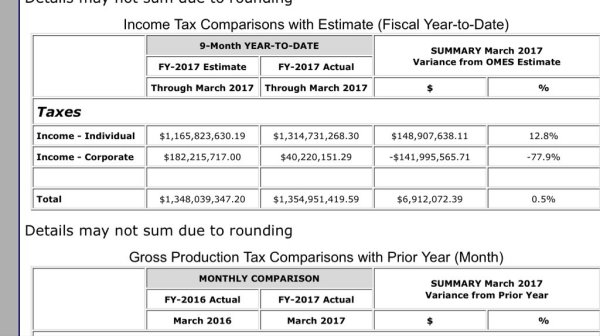
Conveniently, no cuts from the budget happened until after the November elections. Go figure.
We’ve cut the fat. We’re cutting limbs. There isn’t much left.
Happy Humpday (and enjoy today’s testing errata)!
It’s April, so let’s all stop what we’re doing and test some kids! That’s why we’re here five days a week, right? Well, five-ish.
I know I should be less flippant about standardize testing, but if I were, how would you recognize me? As a state, we spend millions on tests that give us very little in the way of useful information months after the fact. At least the process is a well-oiled machine, right?
You’d think that. Unfortunately, Measured Progress, our testing company has twice this week had to email us and say my bad! On Monday, it was fifth grade math.
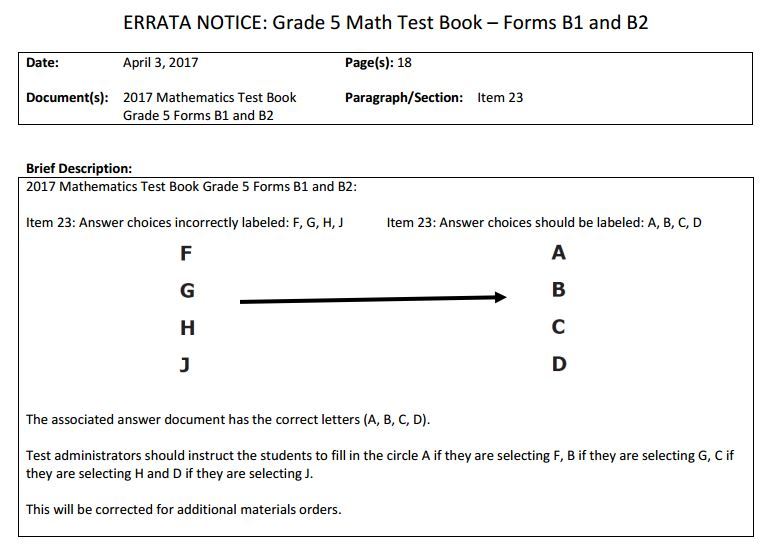
Certainly our students wouldn’t be confused at having different answer choices in their testing books as they do on their answer sheets, right? F and A are quite closely linked (in a single summative kind of way).
It’s a typo. These things happen. At least they don’t cause us to invalidate tests though.
Today’s problem was a different story.
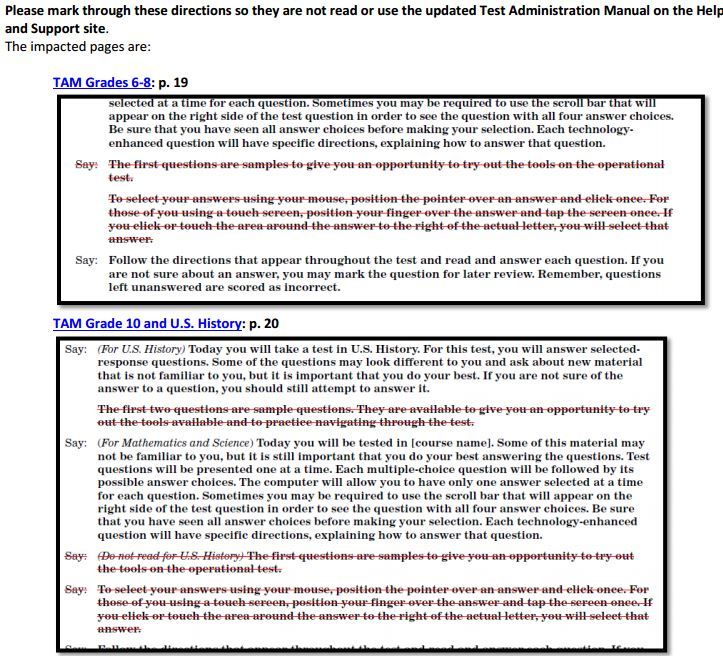
Because of the length of some tests, we give them in two separate sessions. So we should have different directions for each session. The lack of clarity caused some confusion and created test invalidation in some schools. I don’t know how many schools were affected. I was just told some. One was in Mid-Del, and the students affected will have to start the test over.

It’s fine, though. Measured Progress is going to make it up to the kids with pizza.
And no, I’m not making that up.
While I make light of testing, I can tell you that our teachers and principals take the process very seriously. They’re rule followers. They don’t want to mess up and jeopardize their careers. They don’t want to frustrate their students. That’s why I try to test monitor in our schools when I can.
Mistakes are inevitable. They’re still frustrating.
I’m sorry you’re upset.
Caesar:
Who is it in the press that calls on me?
I hear a tongue shriller than all the music
Cry “Caesar!” Speak, Caesar is turn’d to hear.
Soothsayer:
Beware the ides of March.
Julius Caesar, Act I, Scene 2
Yesterday, a bunch of people who support public education went to the Capitol and met with elected officials who support public education. Pictures were taken. Ideas were shared. Good times were had by all.
I stayed home and worked on household chores. I’ve had all the conversations I need to have with my representative and senator about public school funding. We all agree it’s a problem. They’re looking into it.
Since I missed yesterday’s event, I also missed out on the lecture from a freshman representative who doesn’t like our tone. From Red Dirt Report:
Rep. Scott Fetgatter (R-Tulsa) spoke to the group Tuesday morning dismissing their tone and rhetoric. During his face time with the group he said, “We pass the teacher pay raise, and immediately after passing the teacher pay raise the focus shifted from we want a pay raise to those idiots passed a pay raise, but they don’t have a way to fund it.”
The first-time Republican representative went on to explain, “Teachers from my district, that I am friends with immediately started beating me up on this issue.” He told members of the group that they do not fully understand the budget process.
Talking to teachers, he proceeded to use simple numbers to explain that the legislature is not in control of much of the state revenue citing; the legislature will only appropriate $6 out of $17 billion dollars this year.
Fetgatter then gave teachers a learning moment with this example; “If I gave you $3,000 to pay your bills for the month, you would be excited about that and then all the sudden you only get to choose where $900 of that goes because the rest of that is already going to be apportioned out.”
Thank goodness he gave that example. Most teachers wouldn’t know what to do with $3,000 a month, of course, because its well over what they take home.
Using Fetgatter’s example, though, I doubt very many teachers get to decide where even $900 a month goes. Try living on a teacher’s salary, especially with kids. I’ve been there and done that.
Or try running a school district, Rep. Fetgatter. Salaries alone consume 90 percent of our budget. We get to make choices between things like textbooks or new school buses. So please, lecture me.
Don’t get me wrong, Rep. Fetgatter. I don’t blame you. You’re brand new. You had no idea what you were inheriting when you ran for public office during one of the most highly publicized eras of educator activism this state has ever seen.

Rep. Fetgatter, I’m glad you were there. I’m glad you’re working on solving the revenue problems of this state before things get even worse. I don’t doubt your sincere frustration with getting lumped together with the members of last year’s Legislature who passed a budget built upon unrealistic funding projections.
To all the first-year Legislators at the Capitol: you are not responsible for this month’s version of State Aid Mystery Theatre, which superintendents received today:
Based on available funds, the State Aid formula payment for the month of March will be paid at the accumulative amount of 70.96 percent instead of the scheduled 72 percent of the current adjusted allocation. Revenue collections for the March State Aid payment are approximately $18.9 million short of the funds needed to make the scheduled 72 percent payment.
The March payment, available to districts on Thursday, March 16, is based on funds collected as of March 14, 2017. To calculate your payment, use the most current adjusted allocation times accumulated percentage minus paid to date equals the amount of payment. The amount of funds collected as of March 14, 2017 is presented below.
- Education Reform Revolving Fund (1017) Adjusted for Revenue Shortfall has collected 64.98 percent of the Adjusted Appropriated $657,802,801
- Common Education Technology Fund has collected 68.45 percent of the Appropriated $41,168,478
- FY17 Mineral Leasing Fund has collected 46.43 percent of the Appropriated $3,610,000
- General Revenue Adjusted Revenue Failure has collected 72.96 percent of the Adjusted Appropriated $1,027,324,288.95
- FY17 OK Lottery Fund has collected 77.20 percent of the Appropriated $23,397,757
Your Notice of Payment report can be found under Payment Notices in Single Sign On at https://sdeweb01.sde.ok.gov/SSO2/Signin.aspx. For your convenience, a report showing the 72 percent compared to the 70.96 percent is located under Important Notices on the State Aid Web page at http://sde.ok.gov/sde/state-aid .
We will be closely monitoring each month’s cash and make adjustments as needed. If you have questions, please contact State Aid.
I blame the Ides of March. Actually, I should know better than to open email on this day. How many years did I teach Julius Caesar to excited high school sophomores? Nothing good can come of it!
More cuts are coming during the remaining months of this fiscal year because the people in charge of the state’s budget spent the last several years cutting taxes to the point that we can’t run our state. Since you’re new, you’ll probably hear some of your colleagues, and maybe some members of the governor’s staff, explain that the problem is entirely because of low prices in oil and gas. You might even hear a murmur about online shopping.
Maybe, if you’re fortunate, you’ve even run into someone from the Greater OKC Chamber passing out details about their better plan for funding education.
Just remember, state law requires the Legislature to fund education by April 1 of the preceding year. Rob Miller has a few thoughts on that:
Failure to pass an education budget by April 1st will cause the wrath of the God to fall upon your head. You’ll have to work Fridays. Your shoelaces will not stay tied. You will gain weight for no reason. The hair from your head will move to your back. You’ll develop a painful rash in a delicate area of your body. Rabid squirrels will invade your home and procreate with your Shih Tzu. You will be stuck for eight hours in an elevator with a large man with horrible body odor and severe flatulence. Food in your refrigerator will mysteriously spoil. Your bank accounts will be hacked by a Nigerian Prince. Your mother-in-law will move into the guest room permanently. Your car will start making that expensive knocking sound again and no one will talk to you at parties.
What it comes down to is that if you do your jobs, we’ll tone down the rhetoric. If you don’t, I’ll be cutting again – more than the 100 jobs we had to reduce for this school year.
That said, I have no opinion thus far on how effective the 2017 Legislature will be. I won’t until the session ends.
Standridge and Vouchers
State Senator Rob Standridge will say or do just about anything to pass a voucher bill at this point. This week, he has sent his colleagues an 18 page backup document that includes letters of support for SB 560. Here are some highlights. First is from his letter:
Coming from an area of the state dominated by the left and those that think school choice should not be allowed for anyone, even for the poor kids of the inner city this legislation targets, I understand that this legislation is not easy.
This is a tremendous starting point. Standridge is from Norman, which now is apparently dominated by the left. Never mind that he won re-election in November facing an independent candidate and no Democrat. Facts really have no place here.
I have heard some say that if we could just spend more money in the failing schools in Oklahoma and Tulsa county that things would just turn around. I certainly support funding public education better, and as it is a condition of this legislation, giving our teachers a raise. But certainly we are not sure what level of funding will turn around our inner city schools which are failing, and if you look to the funding of inner city schools in Washington, DC…is there really an amount that will fix inner city schools and should we continue to wait for that to happen while kids pay the real price?
So is Standridge saying ALL inner city schools in the state’s two largest counties are failing? If so, then why is he pushing so hard for Cleveland County, where his children attend private schools, to get vouchers too?
And why doesn’t he want any accountability in the private schools that will educate the voucher students they will accept? If test scores are how he knows that inner city schools are failing him, then why won’t we be giving state tests to the students who take their vouchers and go private?
Believe me, I completely understand that OEA, CCOSA, and other left leaning organizations have convinced educators that school choice is a bad thing…
Skipping over the fact that Standridge believes all education organizations (except the ones who write bills for Senator Brecheen and a few other colleagues) are left leaning, he also makes the argument that educators are incapable of thinking for themselves. The OEA and CCOSA are bad, and they have convinced these weak minded people that choice is bad. But I want to give them raises. I really do!
Similar to the Civil Rights movement many decades ago led by Republicans, championed by Republicans, but lost to the media as an effort from the left…
Stop. Just stop. You’re embarrassing yourself, Rob.
I would reiterate that the goal line for SB 560 is a thousand yards away, and possibly even years away, but please help me move this ball down the field so that, hopefully, we can provide opportunity for that young 9th grade boy or girl that without this scholarship life may pass them by.
Yes, this bill merely chips away at the edges of what Standridge and the other signers of letters in this packet really want: universal school choice.
Again, let me say that I’m not against school choice. Thousands of students in Oklahoma attend public schools in a different zip code from their residence. Some of our legislators, past and present, have enjoyed public school choice. We have charters. We have virtual school.
We. Have. School. Choice. Right. Now.
We just don’t have vouchers.
I spoke today with one superintendent who says that Standridge recently told him, They’re coming. Why not control the model? Or maybe I’m one of those gullible educators that the senator thinks will believe anything.
It’s also worth noting that Standridge has worked over the rural caucus promising them that vouchers to the state’s three most populous counties won’t hurt school funding for the rest of them. On the other hand, I’ve heard Standridge talk about the need to consolidate rural districts. That’s the same guy. Is he really looking out for your schools?
Senate Bill 560 would subsidize the private school tuition of more than 36,000 students in those three counties. Adding to the number of students currently served depletes funding for the rest of the districts. This would take money from 74 counties to subsidize the biggest three.
But it moves the ball incrementally down the field.

That’s not all. We also have support documentation from key allies. I won’t list them all, but I’d be remiss if I didn’t provide a brief excerpt from David Barton and his fact-challenged Wallbuilders organization:
Nearly three-fourths of [Texas] citizens say they are not getting their money’s worth for what we are spending in education, and sixty-eight percent now want school choice, even in rural areas…I assume it is the same in Oklahoma.
…In Texas, there is a very aggressive push to increase salaries for educators, and our legislators are sympathetic to these demands. But at the same time, we cannot reward teachers or systems that underperform.
The playbook, if we are to extend the sports metaphor, is strongly anti-public education. And it’s nationwide.
To be clear, though, a voucher won’t provide a student with a meal or transportation. It won’t guarantee access to school choice. And it won’t have any fiscal or academic accountability.
With that said, I’m headed to Kamp’s for tonight’s school choice discussion. I hope I make the cut this time!
Please contact your senators and ask for a no vote on SB 560 tomorrow.
Doerflinger says…
As you probably know by now, the state of Oklahoma declared a revenue failure again this week.
For the second time in two fiscal years, the state of Oklahoma has declared a revenue failure, meaning tax collections are below the estimates used to pass the state budget last session.
“Our revenues are difficult at best, and maybe they fall into the category of pathetic,” Secretary of Finance Preston Doerflinger told a packed room of elected officials, bureaucrats and media this morning. “Our situation is dire. I beg you to have an appreciation for the situation we have before us.”
What this means is that state agencies will receive a reduction in funding from what was budgeted at the beginning of the fiscal year, which runs from July 1 to June 30. For public education, that’s over $46 million in mid-year cuts.
Doerflinger could not emphasize enough how critical this situation is.
Doerflinger also alerted the board to an even larger budget hole for Fiscal Year 2018 than had been anticipated: $878 million, up from $868 million. He more than subtly urged the board — and legislators — to consider Fallin’s bold revenue ideas.
“I don’t know how much more I can emphasize that the time for action is now,” Doerflinger said. “It’s not a game. We need new revenues.”
Doerflinger spoke at a podium directly in front of Fallin and Lamb, who stepped down from Fallin’s cabinet last week because he said he could not support the governor’s proposal for sales tax to be implemented on a variety of services.
“The governor is a pragmatic person, a reasonable person,” Doerflinger said to a silent, crowded room. “She has put forward a bold proposal. I know she and I look forward to specific plans to be revealed by other people involved in this process.”
Fallin’s bold proposal includes eliminating the grocery sales tax and corporate income tax. She would replace them with a menu of taxes on services, such as tattoos, oil changes, and haircuts.They also want to increase the cigarette tax.
The governor’s estimates (which are Doerflinger’s estimates) are huge. I question whether they’re reliable. These are the same people who have worked with legislative leaders to “balance” the state budget each of the last three years, leading to massive shortfalls every time.
According to Fallin’s estimates, applying sales tax to services would bring in $1,703,879,742 (that’s 1.7 Billion dollars with a B) to government coffers. Of that, the state government would receive $934,247,035, county governments would get $648,274,017, and cities would collect $121,358,690.
This is essentially a 10% tax hike on small businesses and consumers across the state, as the cost of doing business and obtaining services will go up about 10%.
Fallin lists 164 different categories she wants taxed. This includes all manner of construction-related contracting services, cable TV, pet grooming, carpet cleaning, business and legal services, utilities for residential use, funeral services, medical services… the list is very long, and you can view it here.
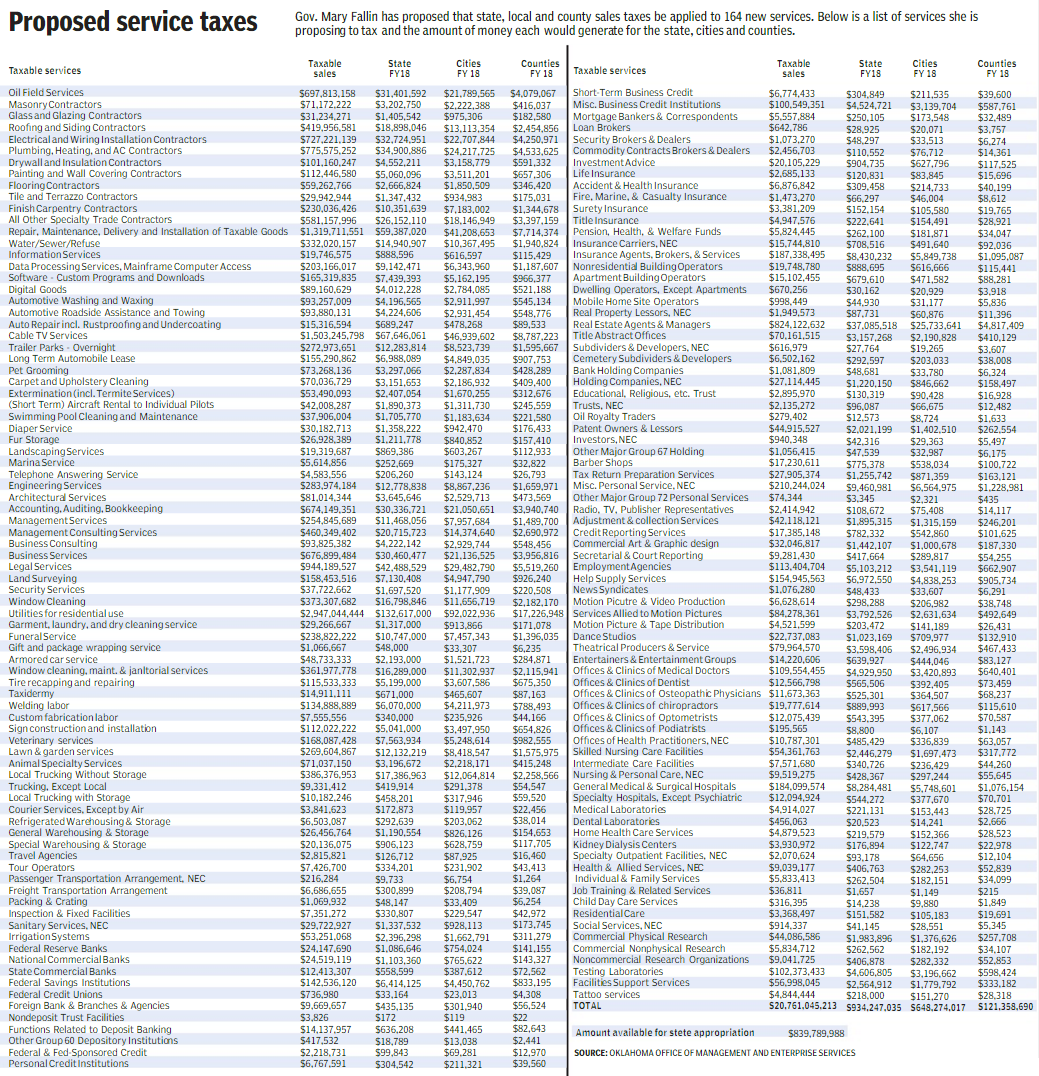
It’s not a very good plan, but at least it’s a plan.
I’ve been pretty quiet the last few weeks. I’ve seen lots of revenue plans (such as nearly tripling the beer tax) and teacher pay raise bills. What I haven’t seen is any momentum behind a solid idea to fix the fundamental problems in this state.
For three years, we’ve listened to state leaders blame the budget hole on low oil and gas prices. In her State of the State address this year, Fallin even blamed online shopping for contributing to lower state revenues.
These things contribute, but not as much as the tax cuts our state has passed during the last ten years. And yes, I know that dates back into Brad Henry’s second term as governor.
The Oklahoma Policy Institute estimates the annual cost of these tax cuts at more than $1 billion. You and I have barely felt those cuts. Most are large cuts for the wealthy and cuts for oil and gas. Other states that rely on fossil fuels for revenue haven’t been hit this hard. They also haven’t decimated their own tax base to intentionally starve the beast of core state services.
Repeating the gravity of the situation, Doerflinger spoke Friday to a Republican group in Tulsa. You can watch clips of his remarks at the Tulsa World website. I’ve transcribed a few sections:
0:25 At some point, we have to determine what type of state we want. Do we want to invest in things like common education or not, and if not, and if we’re not, then we should just tell teachers – and I have friends that are teachers, I have friends that are corrections workers, I have friends that are child welfare workers – at some point we just need to tell those people that we don’t care, or we need to decide that we need to invest in those areas. And I’m telling you, that there are still areas and places we can improve from an efficiency standpoint.
Based on the last few years, I’m reluctant to say what kind of state his audience envisions. Fallin is still governor. We keep digging deeper holes in our budget. An actual plan to raise teacher salaries by $5,000 was defeated at the polls in November. Like it or not, this is the Oklahoma standard right now.
1:50 And agencies have peddled doubt and fear for so long that it’s hard for you to believe me whenever I stand up in front of you and try to make an argument for the fact that these agencies have taken serious cuts over many years and if we’re going to hit them this year with the Draconian-style cuts that I think some people would have us hit them with, then we’re at risk at this point of doing real harm. Some of these people that we’re talking about, if they sustain these type of cuts – and I’m not a dramatic person – people die. We’re putting our corrections workers at risk. We’re putting child welfare workers at risk. And then again, if you care about teachers and the teacher pay raise, I don’t know how you fund that without looking at some types of new revenue.
If stating directly what ongoing cuts mean to those we serve means we have peddled doubt and fear, then I don’t know what to tell you. Then again, he’s not a dramatic person, and he thinks people are going to die if we don’t do something different.
2:40 If the agency known as the State Department of Education and if the Education Establishment in general would start coming with more solutions to the problem versus just the answer being solely we need more money, because there are opportunities to realize efficiencies within the common education universe. The problem is that the Education Establishment really is fixated on just maintaining the status quo, which is sick and really disgusting and it doesn’t benefit the children in this state, so enough of that already.
That’s some weird phrasing: the agency known as the State Department of Education. How else would they be known? And of course, there’s the red meat for his base: the Education Establishment.
I can’t speak for anyone else, but I’m fixated on improving the education my district provides our 14,300 students. Cutting $5,000,000 from our budget last year and over 100 support, teaching, and administrative positions doesn’t make that easy. Losing almost $1.3 million in the second half of this fiscal year doesn’t either. School funding is being held hostage by someone who shows no evidence that he can reverse trend behavior.
And that is really disgusting.
3:20 What we are doing is not sustainable. It’s not, and we need to figure out – the collective we – how we want to approach that. I – again, if anybody things the budget that I pushed out this year is the budget that I wanted to push out – it’s just not true, but it was the reality that we faced in order to try to invest in our state and try to avoid doing real harm in areas where – I can tell you, it was a guiding principle. The governor has told me, the last two years for sure, please try to protect areas, Preston, where people die, or real harm occurs, and that’s what I’ve tried to do.
This entire scenario reminds me of a scene in The Hunt for Red October. A Russian admiral, played by Sean Connery, wants to defect to America and bring his big, bad new submarine with him. He’s being chased by another Russian submarine, which fires a torpedo. Connery’s sub outmaneuvers the other one, and the torpedo tracks towards the one that fired it.
One of the Russians turns to the ship’s captain and says, “You arrogant ass; you’ve killed us!”
As with the torpedo movie, we’ve taken the safety features off our budget. We’ve all but eliminated taxes on horizontal drilling. We give money away by the bucket to corporations that fail to invest it back into our state. We keep cutting taxes and then desperately trying to steer out of the way of disaster.
And every time we do this, someone in the Education Establishment will say how grateful we are that we were held flat, as opposed to facing more cuts.
I’m over that.
And if you want a list of some of the suggestions we’ve made over the years, check out Rob Miller’s blog post from today. He’s not thrilled with Mr. Doerflinger either.
During a speech to the Tulsa Republican Club Friday, State Finance Secretary Preston Doerflinger remarked that the Oklahoma state government cannot continue to function at anything close to current levels without new revenue, calling the state’s current budgeting path “not sustainable.”
Duh, ya think!
Thank you, Preston Obvious.
Rob discusses several funding and policy solutions we have proposed for years. We’re not beholden to the status quo. I would love to change many things about how we pay for education and how we provide it.
What the Education Establishment can’t do is fix the state budget. Hopefully someone can.
We’re cutting again; Now it’s #yourturn

This afternoon, I received the following email from the State Superintendent about finances:
Dear Superintendent,
The General Revenue (GR) failure that was announced on February 21, 2017, has affected the FY2017 Midyear State Aid Allocation. Based on the FY2017 adjusted budget approved by the State Board of Education, we have reduced the funding formula’s GR portion by $7,270,161.
The adjusted funding formula allocation has also been reduced by the projected shortfall in the Education Reform Revolving Fund (1017 Fund) by $39,151,255, for a total cut to the formula allocation of $46,421,416. The adjusted allocation has been posted on the State Department of Education’s Single Sign On (SSO) application under Allocation Notices at https://sdeweb01.sde.ok.gov/SSO2/Signin.aspx.
Additionally, there will likely be a shortfall in the Common Education Technology Fund before the end of the fiscal year. We are closely monitoring the fund and will make necessary adjustments to the allocation in the coming months.
The new adjusted midyear allocation (02/23/17) has a factor of $3,008.60, which decreased by $42.00 from the FY2017 Midyear Allocation of $3,050.60 on January 4, 2017. A comparison report and all of the documentation (reports) will be posted on the State Aid web page athttp://sde.ok.gov/sde/state-aid by Friday, February 24, 2017. Your allocation may be modified as other conditions change.
The Flexible Benefit Allowance (FBA) funding has also been cut by the GR failure in the amount of $3,094,213, but we are able to maintain the allocation without any cuts to the Jan. 1 count adjustment (02/24/17) at this time.
Thank you for the work you do each day to serve your students and communities. These are difficult times which will require strong leadership at every level within districts and at the OSDE. Please let me know how we might offer greater support or assistance to you in the coming weeks and months.
Where should I start? How about by telling you what these cuts mean to one district with 14,300 students.
| General Fund Loss | $961,431 |
| Anticipated Tech Fund Loss | $336,501 |
| Total FY 17 Loss | $1,297,932 |
That’s about 25 teaching positions (once you factor in benefits and employer taxes). That’s a reading or math textbook adoption for the entire district. Or 14school buses. Or a safe room. Or hundreds of new computers. Or a new roof on a wing of an old building.
That’s money the state told us we’d have available to serve our students this year. We don’t. That’s why we’re planning a bond issue that will take care of some of those costs.
Through the first three weeks of the legislative session, we’ve seen the Senate Education Committee look for ways to provide funding for private schools, in the form of vouchers. We’ve seen a pointless bill requiring students to pass a citizenship test before they can graduate. We’ve seen a bill that would term limit school board members (who are volunteers) and a bill to cap superintendent salaries. We’ve even seen a plethora of teacher pay raise bills, all with no funding source.
What we haven’t seen is a plan that addresses the fundamental revenue shortfalls that cause budgets to fail and all state agencies to reduce services.
This is the third year in a row that the state has seen a massive budget shortfall. It’s the second year in a row with a general revenue failure.
I believe the Capitol has many elected officials who mean well. There are also some who keep telling district leaders that we have to be willing to give something up, to become more efficient.
We cut over $5 million from our budget last year. Here we go again.
Your turn.
Bills about five-day weeks won’t change per pupil funding. Bills about consolidation won’t change per pupil funding. If you consolidated all the schools in Cimarron County into one district, Mid-Del wouldn’t get one more dollar. Nor would Tulsa. Or Miami. Or Chickasha. Or Woodward. Or Poteau. We still will have x dollars over y students. It’s simple math.
Don’t pass a teacher raise if you can’t fund it. Don’t neglect the operational costs we’ve been cutting for years and say you’ve “helped schools.”
Educators and parents: please take to social media and share #yourturn stories. What are you buying or raising money for that schools should be buying? What have the cuts of recent years looked like for you?
Elected leaders: Do something. #FixThisNow
Oklahoma Definitely Deserves Better
Shortly before the November election, a group called Oklahoma Deserves better appeared out of nowhere and threw nearly $900,000 into a campaign against SQ 779, the penny sales tax. Right after election, they pretty much vanished. Their website isn’t even around anymore. The magic of the Internet preserves some of their work, however.

As you remember, SQ 779 failed. While several legislators have proposed bills to increase teacher pay, there’s still the little mystery of how the state will fund it.
Fortunately, you can peruse the list of donors who contributed this money (all between October 1 and December 31 of 2016). If you know any of these people (or work for any of the companies that contributed), maybe you can ask them about that better plan. I’d love to hear it.

Get thee to a Thuggery!
Get thee to a nunnery: why wouldst thou be a
breeder of sinners? I am myself indifferent honest;
but yet I could accuse me of such things that it
were better my mother had not borne me: I am very
proud, revengeful, ambitious, with more offences at
my beck than I have thoughts to put them in,
imagination to give them shape, or time to act them
in. What should such fellows as I do crawling
between earth and heaven? We are arrant knaves,
all; believe none of us. Go thy ways to a nunnery.
William Shakespeare
Hamlet, Act III, Scene i
(a few pages after that one more famous scene)
Two evening events on my calendar this week relate to education advocacy. Last night, I attended the Education in Oklahoma panel discussion at the University of Science and Arts of Oklahoma featuring strong public school advocates.
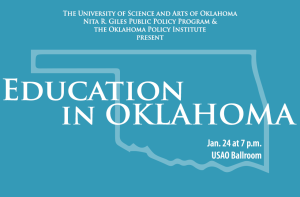
The University of Science and Arts of Oklahoma’s Nita R. Giles Public Policy Program and the Oklahoma Policy Institute present Education in Oklahoma, a panel discussion examining feasible solutions to problems facing the Oklahoma education system.
Panelists:
Phyllis Hudecki, former Oklahoma Secretary of Education, executive director, Oklahoma Business and Education CoalitionDavid Perryman, Oklahoma State Representative
Mickey Hepner, dean, College of Business, University of Central Oklahoma
Joe Siano, superintendent, Norman Public Schools
Megan Benn, consultant
Moderator:
Gene Perry, policy director, Oklahoma Policy Institute
As I said, it was a friendly crowd. I didn’t detect any dissent from those in attendance either. They discussed some of the issues public schools are facing and some potential solutions for solving them. I heard little with which I would disagree. Other than Hepner, I was previously pretty familiar with the rest of the group.
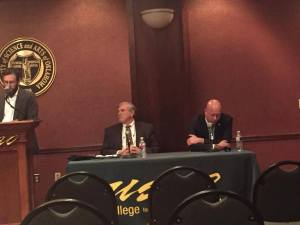
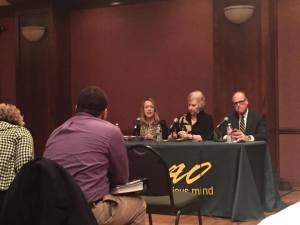
Tomorrow night is an entirely different ball of wax. I was thinking of going to Full Circle Bookstore to hear Scott Inman speak about the upcoming legislative session.
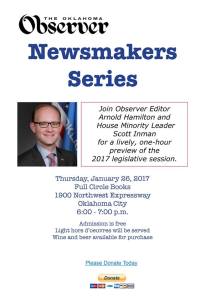
It was on my calendar and everything. Then I caught wind of another event:

The School Choice Summit and Expo is tomorrow at Oklahoma City Community College. It’s scheduled from 4-9 pm, and it’s free. I’ll just be attending the main event from 7-9. Apparently, this bothers some of the people who aren’t big public school fans.

“Thuggery paid for with our tax dollars, at least for now.”
So I’m a thug because I’m going to an event that is far outside of my bubble? Sure, there will be people there who see me and are uncomfortable. It happens all the time. I assume these people are adults, though, and that they can handle being in a room with someone who isn’t a fan of vouchers – especially the kind that come with no accountability.
By the way, my tweet that Trent England responded to was from Friday night at 8:59 pm. I’m not really sure how my thuggery was paid for with tax dollars. And what’s with the at least for now business?

Oh, they’ve called the police in for order. The libertarians are so scared of teacher thugs like me that they’ve called the cops. How cute. As KFOR reports:
So far, no word if the event will be canceled, but OCCC assured us they will have campus police available for the safety of the students.
Check that. They’ve called the campus police. All is well.
I have so many issues with all of this.
- It’s a public event. I registered on Eventbrite. I announced that I’d be coming almost a week ahead of time. I’m not even trying to sneak in.
- My plan is to listen, take notes, maybe ask a question or two, and then write about the event if I come up with anything good.
- Nobody is threatening violence. There is a group I don’t know much about organizing a group to support public education, but they’re not even making signs.
- How is my tweet on a Friday night anything “paid for with our tax dollars”? I have a life outside of work, you know. And last I checked, Twitter is free.
- Is Trent England threatening my job or all public education jobs? He really needs to work on his clarity.
Dictionary.com defines thug as a cruel or vicious ruffian, robber, or murderer. I hardly see myself as a ruffian, robber, or murderer. I do like the sound of the word ruffian. I just don’t think I can pull off the vibe.
Again, as we have seen in the past few weeks, there are some in power who view dissent as vitriol. That’s ridiculous. We need to quit eyeballing the extreme positions and locking into them. That’s why I’m going tomorrow night. I might actually learn something. I also might want to bang my forehead on the seat in front of me for wasting my time. I’m keeping an open mind about it.
What I’m not going to do is recuse myself to a world of like-minded people. I have plenty of those around. I have few friends who are on the other side of education issues anymore. That was never my intent. While I don’t expect to make new friends in the middle of an OCPA/ALEC/Walton event, I can at the least hear what others are saying about the public schools I’m proud to lead.
If that makes me a thug, so be it. Another perspective, Mr. England – and just bear with me here – is you need to work on not being so thin-skinned.
Flush with Bears and Lies
But for too many of our citizens, a different reality exists: mothers and children trapped in poverty in our inner cities; rusted out factories scattered like tombstones across the landscape of our nation; an education system flush with cash, but which leaves our young and beautiful students deprived of all knowledge; and the crime and the gangs and the drugs that have stolen too many lives and robbed our country of so much unrealized potential.
This American carnage stops right here and stops right now.
President Donald J. Trump
Inaugural Address, January 20, 2017
I don’t discuss national politics here very much. Whatever influence I have is limited to the state of Oklahoma. I can’t tell you much about the state of public education in Maine or Oregon. I haven’t researched it. I haven’t lived it.
I have lived in Oklahoma all my life though, and I’ve yet to see a time that we were flush with cash, as President Trump said Friday. I’ve worked in public education for 24 years, and I don’t believe that we’ve left our students deprived of all knowledge, either.
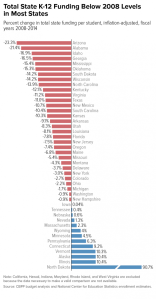
Public education advocates (me included) often share the table from the Center on Budget and Policy Priorities showing that Oklahoma schools have endured the deepest cuts in state funding in the country. The table also shows that while we aren’t exactly alone, more than 20 states have increased funding for public schools.
The CBPP includes a more detailed breakdown of the funding data:
Most states provide less support per student for elementary and secondary schools — in some cases, much less — than before the Great Recession, our survey of state budget documents over the last three months finds. Worse, some states are still cutting eight years after the recession took hold. Our country’s future depends crucially on the quality of its schools, yet rather than raising K-12 funding to support proven reforms such as hiring and retaining excellent teachers, reducing class sizes, and expanding access to high-quality early education, many states have headed in the opposite direction. These cuts weaken schools’ capacity to develop the intelligence and creativity of the next generation of workers and entrepreneurs.
Our survey, the most up-to-date data available on state and local funding for schools, indicates that, after adjusting for inflation:
At least 31 states provided less state funding per student in the 2014 school year (that is, the school year ending in 2014) than in the 2008 school year, before the recession took hold. In at least 15 states, the cuts exceeded 10 percent.
In at least 18 states, local government funding per student fell over the same period. In at least 27 states, local funding rose, but those increases rarely made up for cuts in state support. Total local funding nationally ― for the states where comparable data exist ― declined between 2008 and 2014, adding to the damage from state funding cuts.
While data on total school funding in the current school year (2016) is not yet available, at least 25 states are still providing less “general” or “formula” funding ― the primary form of state funding for schools ― per student than in 2008. In seven states, the cuts exceed 10 percent.
Most states raised “general” funding per student slightly this year, but 12 states imposed new cuts, even as the national economy continues to improve. Some of these states, including Oklahoma, Arizona, and Wisconsin, already were among the deepest-cutting states since the recession hit.
During this time of recession and austerity, I take no comfort in knowing that other states share our misery. One reason is that Oklahoma continues doing the one thing that makes times like these harder.
Not only did many states avoid raising new revenue after the recession hit, but recently some have enacted large tax cuts, further reducing revenues. Four of the five states with the biggest cuts in general school funding since 2008 ― Arizona, Idaho, Oklahoma, and Wisconsin ― have also cut income tax rates in recent years. (See Figure 6.) Another state that cut taxes deeply ― Kansas ― also has imposed large reductions in general school funding, but the precise size of those cuts cannot be determined because the state eliminated its funding formula earlier this year.
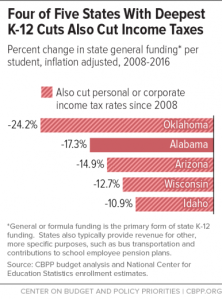
When it comes to politicians bashing public schools, I can’t let lies lie. We are hardly flush with cash. President Trump knows this, yet minutes after taking the Oath of Office, he said it anyway.
Unfortunately, if the lie is repeated enough, it will gain traction. That’s Trump’s plan. Lie and repeat. Don’t even rinse.
Trump’s son Barron attends a private school in New York where tuition is $45,000 annually. Does he want to compare our schools with that one? Does he not understand that public schools have nowhere near that kind of funding? To be fair, neither do most private schools.
The second prong of the lie – that we deprive our students of all knowledge – is simply ridiculous. Public education critics typically look at international test scores to show that other countries’ students outperform ours. Data without context is a dangerous thing, though.
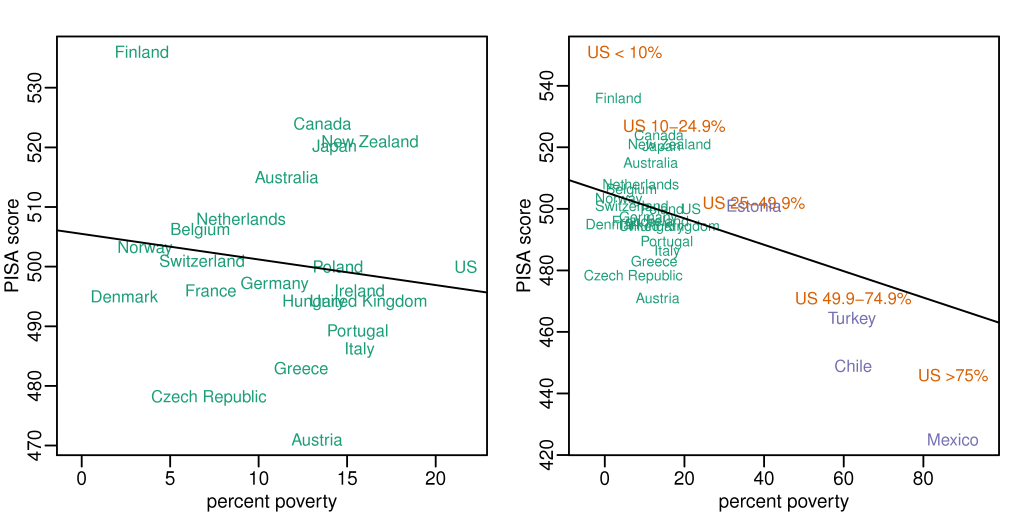
American schools serving students with a similar level of poverty to Finland outperform Finland’s schools. American schools serving students with a similar level of poverty to Canada outperform Canada’s schools. And Estonia. And Australia. And New Zealand and Japan. Yes, Japan.
We have amazing schools in this country and in this state, but they don’t all exist to serve the same purpose. Nor do all of the countries to which we compare ourselves serve all students. They don’t all serve special education students. Comprehensive high school education for all is not a guarantee in every nation.
These facts don’t matter to Trump and the school reformers drooling over his election. His lie feeds the narrative that public schools are failing. It feeds the sycophants too, which brings me to Betsy DeVos.
Trump’s nominee to lead the Department of Education has paid her way into his Cabinet. She’s very open about this.
Trump may have run against big money in politics, but his choice for Education Secretary has made no apologies about her family’s political spending. Betsy DeVos has been a major financial backer of legal efforts to overturn campaign-spending limits. In 1997, she brashly explained her opposition to campaign-finance-reform measures that were aimed at cleaning up so-called “soft money,” a predecessor to today’s unlimited “dark money” election spending. “My family is the biggest contributor of soft money to the Republican National Committee,” she wrote in the Capitol Hill newspaper Roll Call. “I have decided to stop taking offense,” she wrote, “at the suggestion that we are buying influence. Now I simply concede the point. They are right. We do expect something in return. We expect to foster a conservative governing philosophy consisting of limited government and respect for traditional American virtues. We expect a return on our investment.”
You and I don’t have a chance of being heard by the likes of Trump and DeVos. Collectively, all of us who will read this post probably don’t have the wealth of any member of the DeVos family. For years, we’ve been fighting the Kochs and Waltons in this state. She just adds to the oligarchy.
That’s why I found an exchange between DeVos and Senator Bernie Sanders during her confirmation hearing this week very interesting:
Sanders: “Mrs. DeVos, there is a growing fear, I think, in this country that we are moving toward what some would call an oligarchic form of society, where a small number of very, very wealthy billionaires control, to a significant degree, our economic and political life. Would you be so kind as to tell us how much your family has contributed to the Republican Party over the years?”
DeVos: “Senator, first of all thank you for that question. I again was pleased to meet you in your office last week. I wish I could give you that number. I don’t know.”
Sanders: “I have heard the number was $200 million. Does that sound in the ballpark?”
DeVos: “Collectively? Between my entire family?”
Sanders: “Yeah, over the years.”
DeVos: “That’s possible”
Sanders: “Okay. My question is, and I don’t mean to be rude. Do you think, if you were not a multi-billionaire, if your family has not made hundreds of millions of dollars of contributions to the Republican Party, that you would be sitting here today?”
DeVos: “Senator, as a matter of fact, I do think that there would be that possibility. I’ve worked very hard on behalf of parents and children for the last almost 30 years to be a voice for students and to empower parents to make decisions on behalf of their children, primarily low-income children.”
Well which is it, Mrs. DeVos? Do your donations buy you unlimited access inside the walls of influence, or did you get there because you’re so involved and well-informed?
I really need not to focus on this. Yes, she made the ridiculous statement that we need guns in school because of grizzly bears, but this moment of comic relief is a distraction. I downloaded I don’t know how many bear memes and gifs while I’ve been working on this post. I admit it’s slowed me down.
 DeVos also was confused by the difference between proficiency and growth. She had no clue what the Individuals with Disabilities Education Act is. Is it possible the Secretary of Education-nominee has never heard of the country’s foundational special education law?
DeVos also was confused by the difference between proficiency and growth. She had no clue what the Individuals with Disabilities Education Act is. Is it possible the Secretary of Education-nominee has never heard of the country’s foundational special education law?
Presidents have a right to appoint the people to their Cabinet who they feel are best-equipped to execute their policy initiatives. That’s what winning the election gets them. The Senate has to confirm those appointments, though. Merely going through the motions of a confirmation hearing, however, does not meet that standard.
I’m bothered by many of the things DeVos believes about education. I’m more concerned, however, about the fact that she simply has no clue what she’s doing. Understanding the difference between proficiency and growth is so easy that a dentist could get it!
Oh wait, bad example.
Maybe the Senate will deny DeVos. On the other hand, she’s put a lot of money into the campaigns of many who will make that decision. Even if they don’t confirm her, she’ll be replaced with someone else who shares the Trump mindset and who is willing to repeat the lie.
We must fight back with truth.
The School I Choose
I wrote this four years ago at the beginning of National School Choice week, and I thought it would be worth sharing again. We have many of the same threats to public education we had then, and we have some new ones too.
Demand of our elected leaders that public schools have the resources to meet the needs of our children – all of them.
The mantra this week is that parents should get to choose the schools their children attend; that their zip code shouldn’t choose it for them. It’s quite the idyllic belief – that out there, somewhere is the perfect school.
As a parent, I’m still looking. Here’s what I hope to find.
- I choose a school that values children for the unique individuals they are.
- I choose a school with a strong, active PTA.
- I choose a school where the parents of the other children value education as much as I do.
- I choose a school that has well-paid faculty who are happy to come to work.
- I choose a school where the teachers receive meaningful professional development and are treated as professionals.
- I choose a school that teaches all students, regardless of background or ability.
- I choose a school that has enough technology to prepare my child for the world…
View original post 499 more words
A Pocket Full of Mumbles
I am just a poor boy
Though my story’s seldom told
I have squandered my resistance
For a pocket full of mumbles, such are promises
All lies and jests
Still a man hears what he wants to hear
And disregards the rest
–Simon and Garfunkel, The Boxer
One of my former students, Larin Sears Rottman, is a teacher in Washington, DC. Her husband is an assistant principal there. Both are University of Oklahoma graduates, and they still have family in this part of the country, but they love it out there. I mention this because of an article that she posted to Facebook over the weekend. She added this at the beginning:
This is a very short read that is very real for me. I am from Oklahoma, but D.C. is my HOME. I live in a real house, in a real neighborhood. I wake up each day and go to my real job to make the world a really better place. There are far more REAL people than politicians in my city. Respect D.C.
I won’t post the article here, but you get the basic idea. People who have real families and live in real neighborhoods and who work and send their kids to real schools there don’t like the generalization that it’s a swamp.
https://twitter.com/aCreativeDC/status/819229273017856001
Sure, 220 years ago, when Pierre L’Enfant began to lay out the city design Actually, the District was never a swamp. It was a tidal marsh. But DRAIN THE TIDAL MARSH doesn’t really roll off the tongue, now does it.
Still, as of 2009, 46% of DC’s residents were actually born there. For that matter, OU President David L. Boren – the son of a congressman – was too.
Generalizations hurt. When you make them, even if you mean for this to happen, you’re probably hurting the wrong people.
Over the last couple of months, since the defeat of State Question 779, I’ve seen more of them on social media. Everyone is making them!

It’s the love language of identity politics. Liberals this. Conservatives that. Gender. Race. Religion. Sexual Identity. Wealth. Geography.
That’s one of my favorite ones. Remember when Ted Cruz was attacking Donald Trump for being from New York? Or have you heard a defensive Republican point out that Hillary’s popular vote margin over Trump is virtually erased if you exclude California? It makes sense. After all, that’s more American than discounting the opinion of voters in the most populous state?
Even making generalizations about voters is specious. Hillary supporters are just a bunch of whiny crybabies (or crybaby whiners, if you prefer). Trump supporters excuse all the horrible things he says. I’m probably doing this wrong because I never use exclamation points. Ever!
This isn’t a blog about DC, or presidential politics, or racism, or sexism, or class warfare, though. It’s an education blog in which I have tried, for nearly five years, to set the record straight. Mainly, this involves responding to the action (or inaction) of policymakers and false narratives presented by groups with influence.

Generalizations seep into the public education conversation too much too. Whether it’s a state senator talking about all the waste in public schools (without offering a single example), or another one making sweeping, disparaging remarks about school board members, this kind of recklessness does not steer us towards solutions.
With the First Regular Session of the 56th Oklahoma Legislature set to convene in 19 days, I’m unwilling to make generalizations about this new group as a body. The book is closed on the 55th Legislature. I can comfortably say that they failed us – both sessions. They built upon the failures of the 54th and 53rd legislatures. For six straight years (three straight Legislatures), we’ve been treated to a menu of fiscal catastrophes.
I don’t blame all the legislators (lowercase). I blame the Legislature (uppercase) though. The body failed to help with teacher raises, specifically, and with so many other critical state functions, in general. Individuals within that body had good intentions, though. Many did. Maybe most did. They just couldn’t get it done. In the end, we won’t judge you by your intentions. It’s your outcomes that tilt our moods.
That doesn’t mean the 56th Legislature will be the same, though. We have 45 new legislators. Most of them love teachers. Just ask them!
We need to remember that they haven’t served during the session yet. We really need to remember that when we engage them on social media. Some of the returning legislators are on our side too. Maybe many. Maybe most.
My friend Blue Cereal Education posted a blog this morning titled Don’t Raise Teacher Pay (To Be Nice).
We shouldn’t tolerate the implication we’re somehow looking for charity; we’re not. It’s unbecoming to play on sympathy, especially when we’re not the only profession getting shortchanged at the moment. Besides, pity or warm toasties are horrible reasons to raise teacher pay or increase school funding. They’re emotionally driven, unreliable, and fundamentally inaccurate.
Public schools aren’t businesses, nor should they be. You’ll hear that a lot in the upcoming voucher battles, and it’s entirely true. But neither are we charities, or churches, or some type of third world profession. We’re not asking for handouts or love offerings while Sarah McLachlan plays in the background.
Nevertheless, teacher pay needs to go up substantially, and soon – but not for me. It needs to go up for you. And your kids. And your pocketbook. And your state.
A decent public education system is an essential function of civilization. We’re a fundamental element in the social contract that allows people to live together in relative peace, to specialize, to become more productive, and to progress artistically, culturally, medically, financially, and lots of other –allys.
Blue Cereal is right. All teachers need raises. I’m not saying that all teachers are fantastic or that all superintendents are worth what their districts pay them. I’m not saying I’ve never met a board member with an agenda. Nor am I saying that all legislators or all Republicans in the state are out to get us.
As an example, I recently had an exchange about school funding (and waste) via Facebook Messenger with a legislator I know. I won’t share his remarks (without his consent), but I’ll share a portion of mine:
I have some thoughts on waste. Sometimes it’s in the eye of the beholder. We have some patrons who don’t value athletics at all. To them, every time we buy a football helmet, it’s waste. To the mom whose son is on the field getting hit, it’s not. Some people want us to get rid of the arts. Or transportation. Or child nutrition. Or they want teachers to clean their own rooms (which I would highly suggest not proposing).
I managed a restaurant for four years in college. There I learned that limiting waste, more than anything, was about predicting the future. If we prepped a certain amount of food expecting customers and had to throw a lot of it away, which was wasteful. Some nights at closing, we threw away very little. Sometimes, we underprepared which then backed up the kitchen, and probably cost us business.
My point is that every enterprise has waste. Every government agency and every business does. Every superintendent I know tries to limit it – often to the point of increasing the frustration of the workforce. You won’t find one of us who hasn’t tried to find waste.
I get it. You’re trying. So are we. In trying times, that’s what we all do.
Loveless’ Education Policies need a Mechanic
Jayden Mills, a Chickasha HS Senior, has some great thoughts on bad analogies. His post has a perfect ending! I’m glad he’s getting a great education where my parents and grandparents did.
From The Desk of An Oklahoma Student
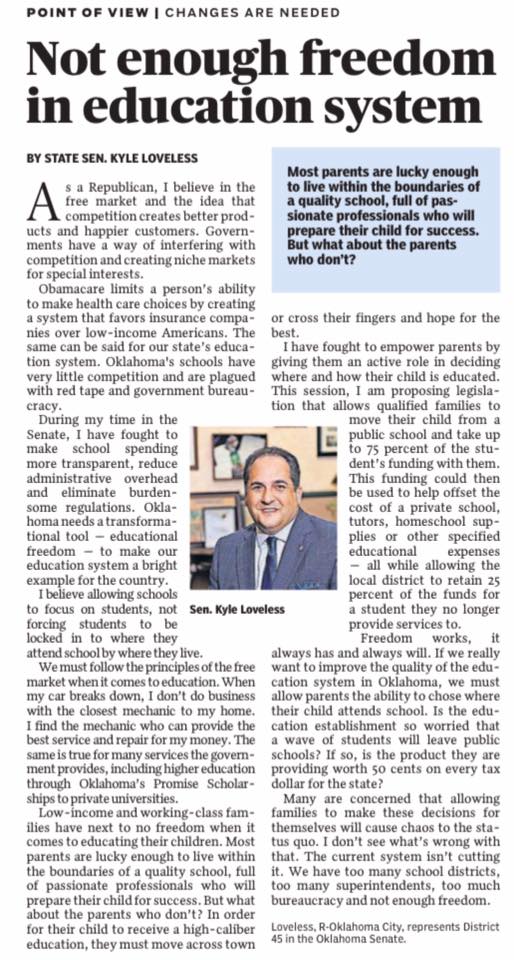
Senator Kyle Loveless posted on Facebook, “My opinion piece in the Oklahoman about Educational freedom” attached was this article. If you’re reading this, chances are you know how I feel about Education Savings Accounts (ESAs) or vouchers.
But what really irks me about this particular post is that in his article, he compares his envisioned education market with the competitive market of the car service industry: “When my car breaks down, I don’t do business with the closest mechanic to my home. I find the mechanic who can provide the best service and repair for my money.” He goes on to say that he is “proposing legislation that allows qualified families to move their child from a public school and take up to 75 percent of the student’s funding with them.”
What I’d like to know (And I commented this on his Facebook post) is this:
Imagine that the closest mechanic…
View original post 574 more words
The School I Choose
The mantra this week is that parents should get to choose the schools their children attend; that their zip code shouldn’t choose it for them. It’s quite the idyllic belief – that out there, somewhere is the perfect school.
As a parent, I’m still looking. Here’s what I hope to find.
- I choose a school that values children for the unique individuals they are.
- I choose a school with a strong, active PTA.
- I choose a school where the parents of the other children value education as much as I do.
- I choose a school that has well-paid faculty who are happy to come to work.
- I choose a school where the teachers receive meaningful professional development and are treated as professionals.
- I choose a school that teaches all students, regardless of background or ability.
- I choose a school that has enough technology to prepare my child for the world after school.
- I choose an elementary school with a safe and exciting playground.
- I choose a school that can afford a resource officer, even though I live in a community that looks like it would never need one.
- I choose a school with enough counselors to tend to every child’s social and psychological needs.
- I choose a school not driven mad by testing.
- I choose a middle school with teachers who work in teams to help children transition into adolescent learners.
- I choose a school that offers art, music, PE, and computer instruction at all levels.
- I choose a school that has a strong collaborative relationship with a Career Tech center.
- I choose a school that fosters reading for reading’s sake and writing for writing’s sake.
- I choose a school with every student receiving support to be on grade level in reading and math.
- I choose a school that doesn’t arbitrarily mandate retention based on flawed tests.
- I choose a high school that offers a variety of courses that allow students to explore their career possibilities.
- I choose a school that encourages the study of Current Events.
- I choose a school that teaches people not to be defined by their mistakes.
- I choose a school where the parents support their children in sports while also respecting the boundaries between the field and the stands.
- I choose a school with good breakfasts and lunches.
- I choose a school that can raise money for band trips and cheerleader uniforms but doesn’t have to for teacher supplies.
- I choose a school that operates under mandates fully funded by the state.
- I choose a school focused on children rather than A-F Report Cards.
- I choose a school with no bullying.
- I choose a school with board members who listen to the professionals in their district.
- I choose a school that is a partner with its community.
- I choose a school where the teachers have manageable class sizes.
- I choose a school with teachers who will laugh when students properly pull off a flash mob.
- I choose a school with at least one nurse.
- I choose a school with at least one librarian.
- I choose a school with spirit.
- I choose a school that takes field trips and has class parties.
- I choose a school with fully-equipped science labs.
- I choose a school that teaches social studies and civic engagement to all students.
- I choose a school that values service-learning.
- I choose a school that has well-maintained buses with comfortable seats.
- I choose a school with a safe room, a roof that doesn’t leak, and functioning heat and air.
- I choose a school that encourages participation in Math Counts, Geography Bee, Science Fair, Competitive Speech and Debate, and Robotics.
Maybe I haven’t found the perfect school yet. I haven’t even created the perfect list, I’m sure. I came up with these 40 things in about 15 minutes. Nonetheless, I’m still grateful for the schools my children attend(ed). I know most feel the same way.
Reason #7 to pick Dr. Grace over Mr. Walters: The company you keep
On the bottom words are shallow
The surface talk is cheap
You can only judge the distance by the company you keep
In the eyes of the confessor
Joe Walsh, The Confessor (1985)
It’s been a while since I started a blog post with a 1980s song lyric. This one has been rolling around in my head ever since I started putting this list together. Before we get into Reason #7, though, I want to start with a quick debate recap. Tuesday night, Dr. April Grace appeared on Fox 25 to debate Ryan Walters.
Right out of the gate, we saw the contrast. The first question asked was about the biggest issue in public education at this time:
Walters: “The biggest issue facing our school system today is left-wing indoctrination…issues like critical race theory, transgenderism, and an anti-American-like curriculum.”
Grace: “We’ve got to get serious about solving the teacher shortage…getting back to focusing on early literacy for our early learners and expanding options for our high school students.”
Walters pivoted to indoctrination on every nearly answer. He even said superintendents in Oklahoma are trying to “win the woke Olympics.” No, I have no idea what that means either. If we had some kind of contest in place to perhaps give ourselves treats every time Walters said woke or indoctrination, I’d be in no condition to finish this blog post.
This is all he has. He expressed no real ideas or plans. If he has any thoughts about improving public schools in Oklahoma, he either can’t or won’t articulate them. Dr. Grace answered every question with specific examples from her experiences. Walters doesn’t understand school funding. He doesn’t understand law. He doesn’t even understand simple processes like the textbook adoption cycle. Every sentence out of his mouth sounds like it could have been written by a bot that watched 10,000 hours of propaganda.
Every educator in Oklahoma should cringe at the accusations Walters is making about the work we do. We keep our students safe. We teach the basics. We work with families. We know our communities. He shows no interest in doing this. If Ryan Walters, in his official capacity, ever wants to visit classrooms (or libraries) in my school district, I’d be happy to show him the good work we are doing for our students daily.
Dr. Grace closed by challenging Walters to make even one positive statement about something specific happening in a public school somewhere in Oklahoma. She gave several examples. He whiffed. You would think that with all the campaigning he has been able to do while ostensibly working for the state, that he would have seen something commendable.
*****
Ok, back to the countdown. Maybe the company our candidates keep should be higher than reason #7. As I mentioned in Reason #8, most of the money backing the Ryan Walters campaign is coming from special interest groups and dark money from outside of Oklahoma. And his most vocal support comes from the same predictable crowd that has been trying to wreck public schools for decades.
Let’s start with the Oklahoma Council of Public Affairs (OCPA). I’m not going to link to their work. If you haven’t heard of them, I’m incredibly happy for you. If you have, you know that they call themselves a free market think tank and have spent almost three decades only supporting candidates who want to dismantle public education.
Walters has no bigger ally than Governor Stitt, who hasn’t been involved in politics for long (and wasn’t a regular voter prior to running). In all the years that I’ve been aware of OCPA, I don’t think they have agreed with a governor more completely than the current one – the one whose approval ratings are falling.
Governor Stitt appointed Walters to the position of Secretary of Education. Meanwhile, Walters also works for Every Kid Counts Oklahoma (EKCO), which has ties to the Walton Family Foundation (WFF), the supposedly philanthropic arm of the Wal-Mart empire. They have committed billions of dollars over the years to defunding public schools. It’s their signature endeavor. I’ve been writing about them on this blog since 2013, as well as their ties to the Oklahoma Public Schools Resource Center (OPSRC).
It should be noted, of course, that EKCO shares office space with OPSRC.
Walters is supported by former state superintendent Janet Barresi, who was such a disaster in her sole term in office that she finished third in her primary in 2014. Barresi’s former campaign manager and chief of staff, Jennifer Carter, works with Class Wallet and the American Federation for Children. She had a hand in helping Walters misspend federal relief funds.
Jennifer Carter, by the way, is married to Ray Carter, who used to write editorials for the Oklahoman and now does the bulk of the writing at the OCPA website. Help me out here. Is a puppet the one with all the strings or the one with the hand? Nevermind. It doesn’t matter.
Meanwhile, Dr. Grace has a broad coalition of support. Educators who don’t appreciate baseless derision are behind her. Parents who want their public schools to remain the centerpiece of their communities do too. More and more elected officials who are tired of the baseless attacks on schools are with her as well.
I’m with the candidate who can get educators, families, and communities behind her. I’m with Dr. Grace.
Previous: Reason #8 Showing Up
Next: Reason #6 Credibility
